












Dear Esteemed Readers, Partners, and Stakeholders,
We extend a warm welcome to this remarkable magazine, offering a window into Rwanda Justice Sector and the incredible work of the Rwanda Forensic Institute (RFI) over the past five years. RFI has emerged as a cornerstone of the Justice Sector.
We are profoundly grateful for the transformative impact of RFI service delivery. The dedicated forensic experts, working tirelessly behind the scenes, ensure justice is founded on evidence, accuracy, and integrity. Their contribution has been instrumental in enhancing the quality and timeliness of justice administration in Rwanda.
RFI support to the justice system, both in Rwanda and the broader region, fills us with immense pride. Our unwavering commitment to justice principles is fortified by the meticulous work of these experts, who bring clarity to the most intricate cases. Their expertise not only helps in handling criminal cases, but also in acquitting the innocents, fortifying trust in our justice system.
On behalf of the Ministry of Justice and the entire Justice - Reconciliation Law and Order Sector, we express our deepest appreciation to all those who contribute to the field of Forensic Science. Your work serves as a testament to the power of science in the pursuit of justice. This magazine reflects your dedication, passion, and unwavering commitment to the truth.
With the firm belief that “Justice delayed is justice denied,” we also acknowledge the importance of avoiding the haste that might lead to “Justice hurried is justice buried.”
With the utmost respect and admiration,
 Dr. Emmanuel UGIRASHEBUJA Hon. Minister of Justice & Attorney General
Dr. Emmanuel UGIRASHEBUJA Hon. Minister of Justice & Attorney General
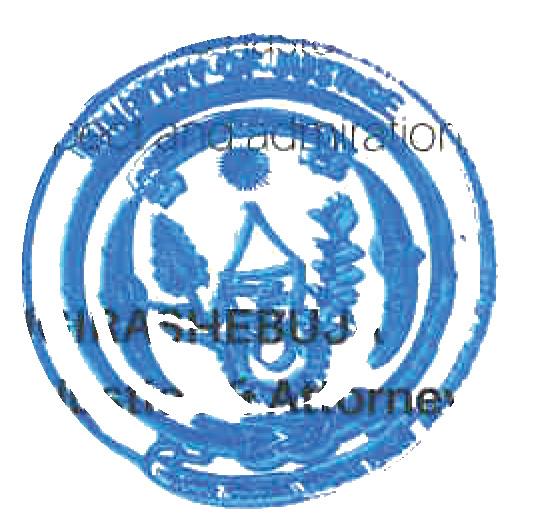
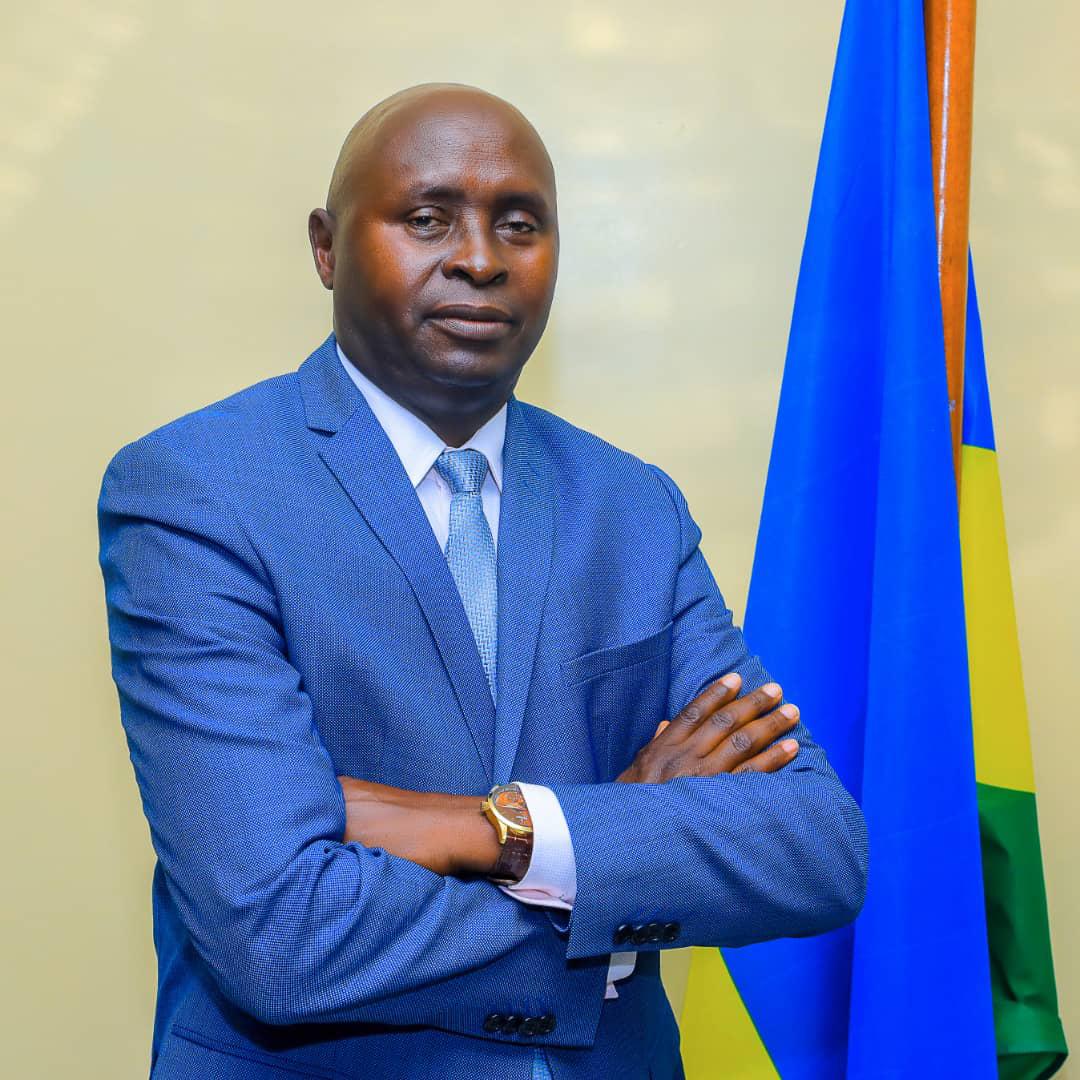
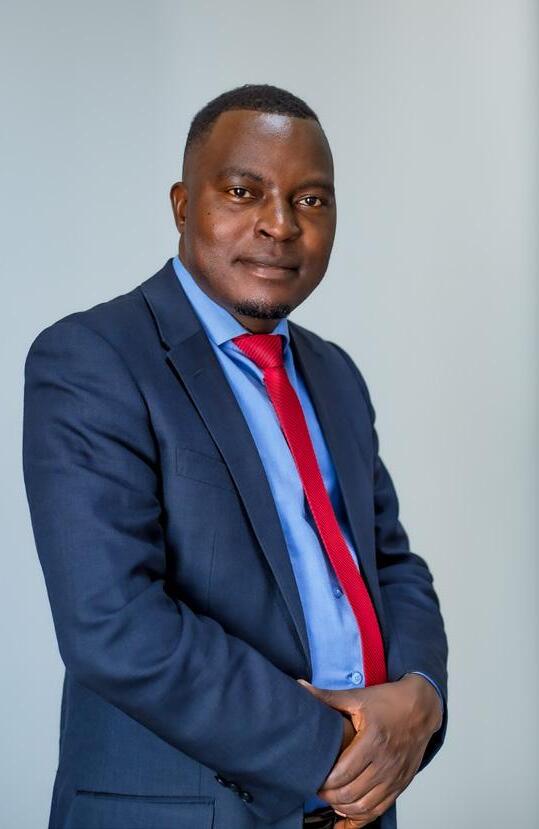
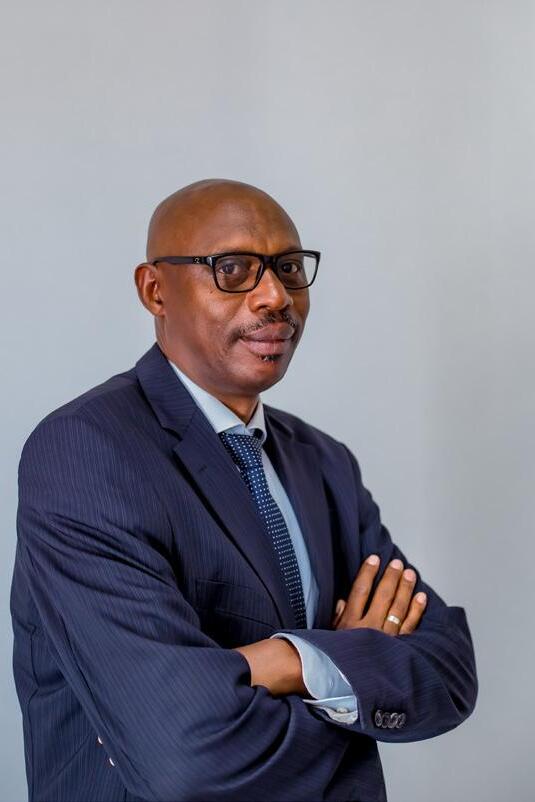
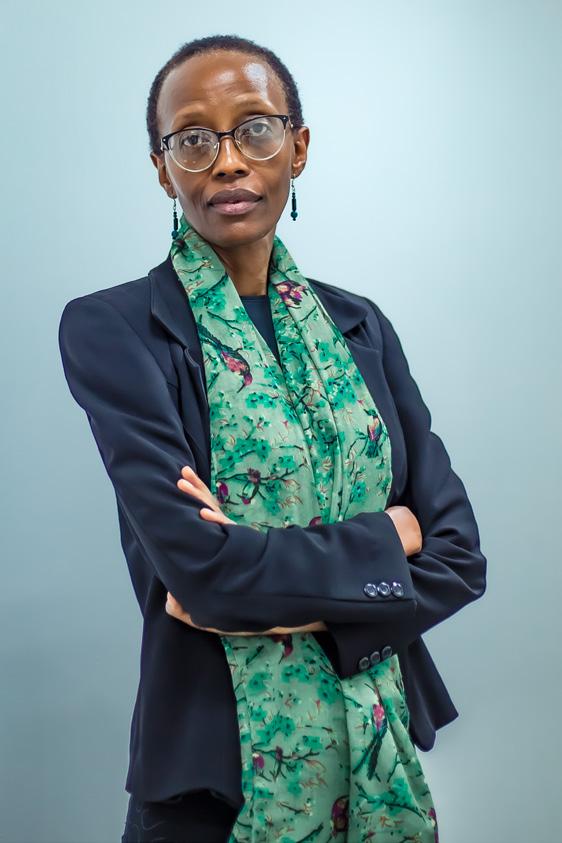
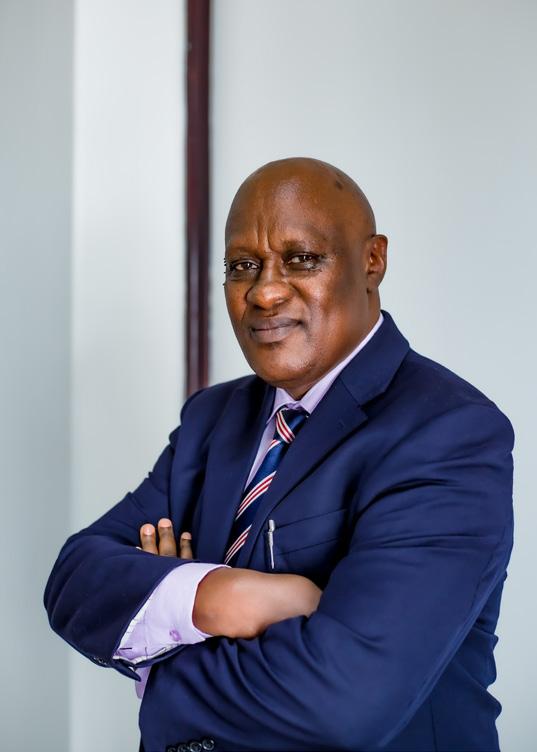
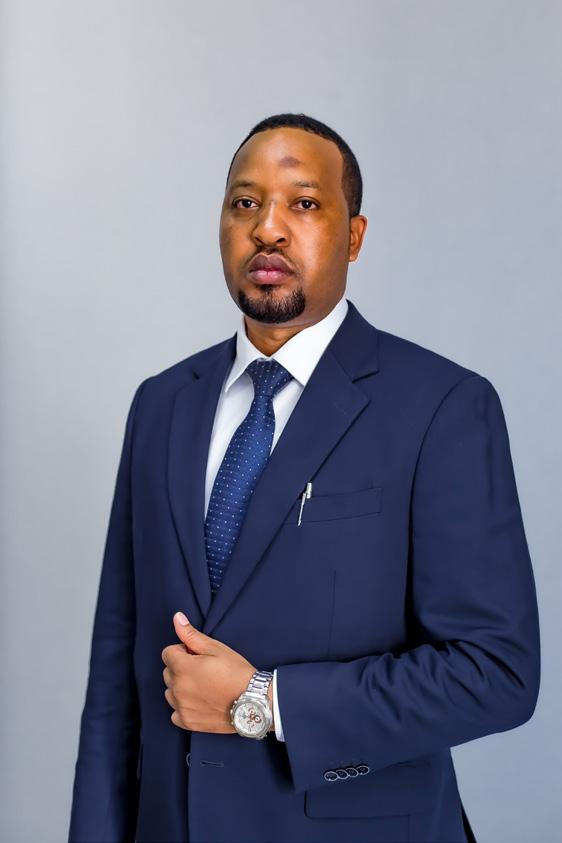
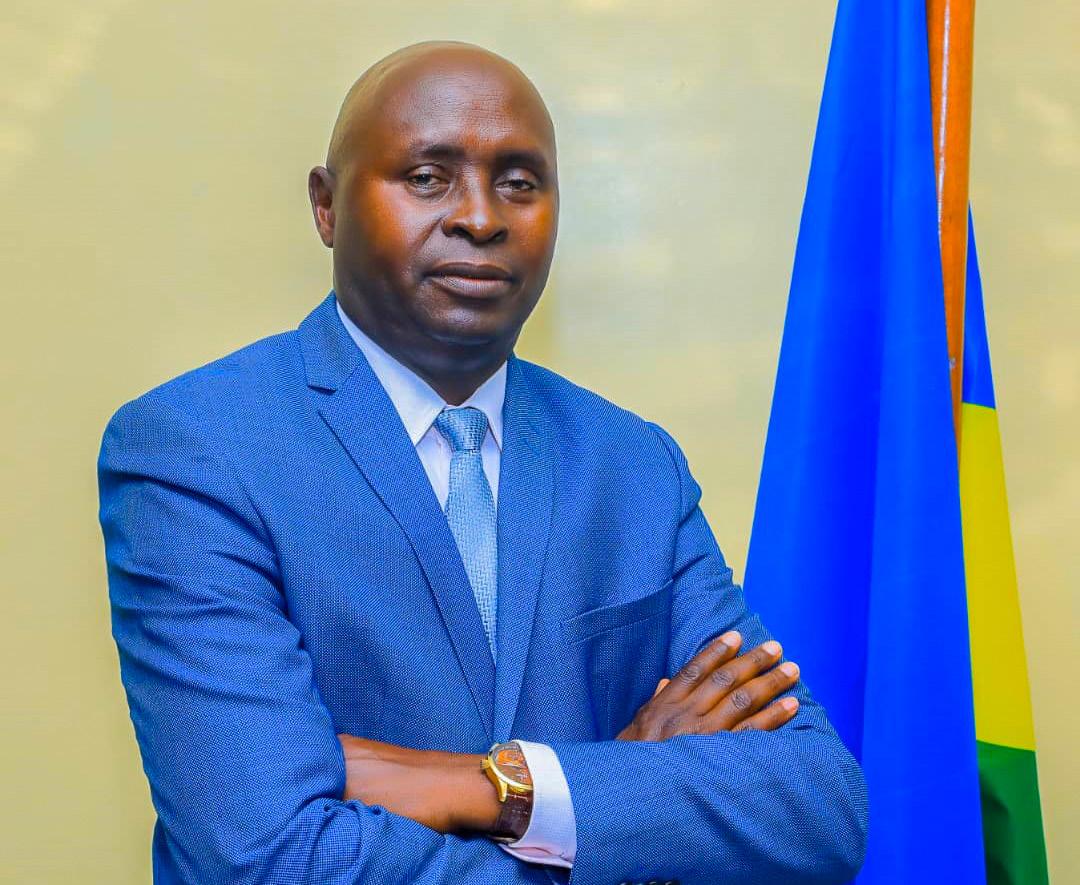
Dear Readers,
It is my profound honor and privilege to introduce to you the inaugural edition of our institution’s magazine. This edition not only marks the beginning of a new chapter for forensic science in Rwanda, but it also symbolizes the closing of an era –one that saw the meticulous and tireless development of the Rwanda Forensic Laboratory (RFL) over the past five years.
The establishment of the Rwanda Forensic Institute is a significant milestone in the journey of forensic science in Rwanda. It represents the culmination of half a decade of internal and technical development, improvement, and dedication by the team at the Rwanda Forensic Laboratory. Our journey began with a vision to build an internationally recognized forensic laboratory to serve the needs of our nation. Today, we stand on the threshold of a new era, as we upgrade our activities and metamorphose into the Rwanda Forensic Institute.
The past five years have been marked by numerous challenges and triumphs. We have worked diligently to enhance our capabilities, adopting cutting-edge technologies, and fostering a culture of continuous learning and professional improvement of RFI staff. The institution efforts have not only strengthened the forensic services we provide, but have also contributed to the broader development of the justice system in Rwanda.
As we transition from the Rwanda Forensic Laboratory to the Rwanda Forensic Institute, we are committed to building on the solid foundation laid over the past five years. We will continue to innovate, to collaborate, and to strive for excellence in all that we do. Our mission remains unchanged: to provide the highest quality forensic services to support the administration of justice in Rwanda.
This inaugural edition of the RFI magazine is a reflection of our journey so far and offers a glimpse into our future. It closes the chapter on the RFL’s five-year period of development and opens a new era for the Rwanda Forensic Institute. As you turn the pages, you will find stories of innovation, collaboration, and dedication from RFI team. You will also discover insights into the latest developments in forensic science and the impact that our work is having on the justice system and the broader community.
I would like to express my deepest gratitude to the entire team at the Rwanda Forensic Laboratory for their hard work, dedication, and commitment over the past five years. I am incredibly proud of what we have achieved together and I am excited about the journey that lies ahead for the Rwanda Forensic Institute.
Thank you for your support and for joining us on this journey.
Lt. Col Dr. Charles Karangwa, Director General
In the early 2000s, Rwanda was emerging from the period of Genocide against the Tutsi and rebuilding itself to ensure a better future for its citizens. The 1994 genocide against the Tutsi had left an indelible mark on the country’s psyche and led to an urgent need for services and institutions that could support the reconstruction process, particularly in the areas of security, justice and reconciliation.
One such crucial area was forensic science, which is essential in criminal investigations, and which plays a crucial role in delivering fair justice. The Rwanda Forensic Institute (RFI) was thus conceived as part of this larger vision of rebuilding Rwanda and ensuring security and justice for its citizens.
The Establishment
Forensic services started being offered in Rwanda 18 years ago to support the judicial system:
In 2005, under the basic form of forensic services, the Kigali Forensic Laboratory (KFL) was established by the Rwanda National Police (RNP) through its former Criminal Investigation Department (CID) in collaboration with the National Public Prosecution Authority (NPPA). At this time, KFL was responsible for sample collection, packaging and transportation abroad (Germany or UK) for further processes. The laboratory then was only able to perform preliminary analysis, due to insufficient
skilled personnel, shortage of equipment and inadequate infrastructure.
It was very costly for the Government of Rwanda and the wheels of justice turned painfully slowly due to the time it took to ship the samples, analysis time and production of a forensic report, which then had to be sent back. This was a major hindrance to the fair of justice administration.
In 2011, a significant step was made by the Government of Rwanda towards bridging the gap between the judicial system and forensic science. Major investment was sunk into selfsustenance by improving the infrastructure, equipping the laboratory and developing the skills of the forensic scientists.
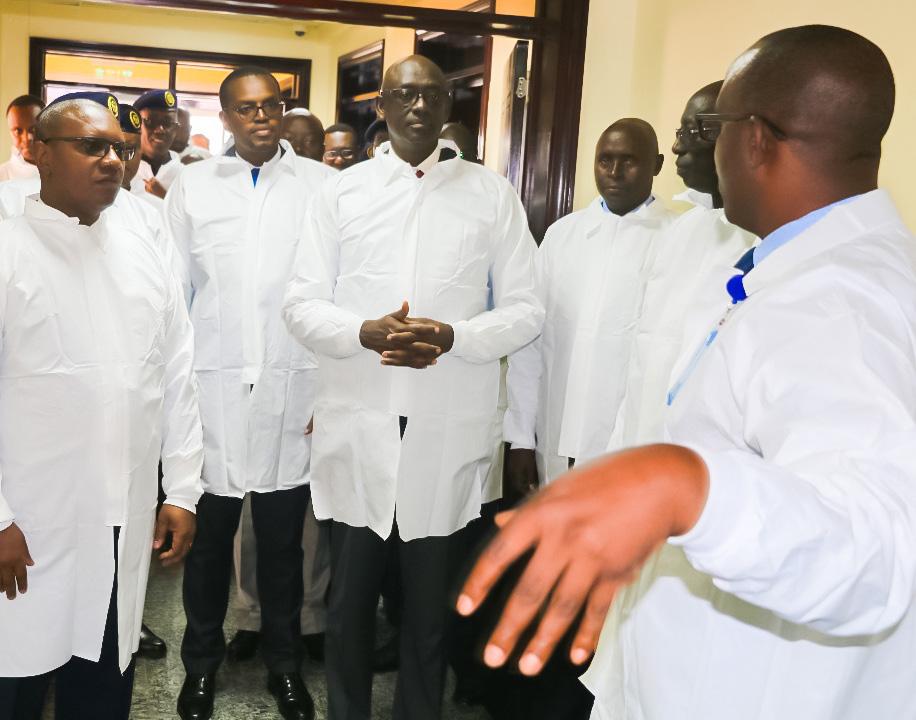
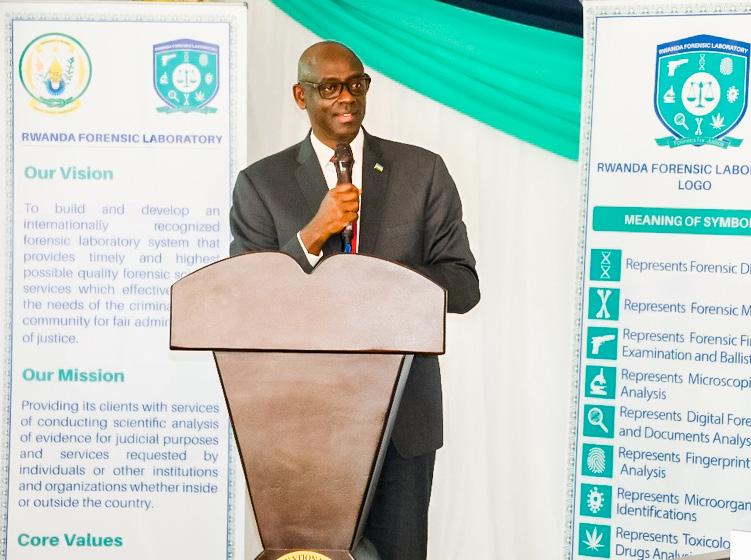
In 2016, the Government of Rwanda upgraded the Kigali Forensic Laboratory to a more advanced level, by adopting the Law N°41/2016 of 15/10/2016 establishing the Rwanda Forensic Laboratory (RFL) and determining its mission, organization and functioning. As an autonomous public institution, the laboratory was launched officially in 2018 by the former honorable Minister and Attorney General.
At the time, only twelve services were being offered; DNA testing, microbiology testing, toxicology & blood alcohol testing, chemistry testing, drugs testing, examination of questionable documents, fingerprints examinations, digital forensics, multimedia forensics, ballistics & toolmarks, clinical medicine and pathology.
With these tests, the laboratory was capable of providing laboratory forensic testing services to law enforcement agencies, the judiciary, private individuals and other institutions in Rwanda and abroad.
On 6th June 2023, considering the great achievements of the Rwanda Forensic Laboratory, owing to the growing demand of services offered, the Cabinet approved the Presidential Order establishing the Rwanda Forensic Institute (RFI).
This would enable the facility to offer services that are more advanced, thus the need for comprehensive scientific research for the betterment of laboratory functioning and training for forensic service providers as well as forensic service consumers.
On 3rd August 2023, the Presidential Order establishing RFI was published in the Official Gazette as No 049/01 of 02/08/2023.
Through the order, Rwanda Forensic Institute was formally established as an autonomous non-commercial public institution. The institute was created to provide comprehensive forensic services to law enforcement agencies, the judiciary, and other relevant institutions in Rwanda as well as other partner states.
This is a monumental step forward, because before the RFI, the country heavily relied on foreign forensic research and innovation as well as forensic trainings for any forensic-related needs. This hindered the development of indigenous forensic sciences and self-reliance. However, it also came in handy because, with the trust that our country enjoys, different partner countries continue to show their interest in Rwanda Forensic services, training included. The establishment of the RFI is therefore a significant step towards self-reliance and an essential boost to the country’s justice system.
RFI has the mission to provide its clients with services of conducting scientific analysis of evidence for judicial purposes and services requested by individuals or other institutions and organizations whether inside or outside the country.
Rwanda Forensic Institute aspires to be internationally recognized and a regional benchmark in forensic science; committed to pioneering innovations, championing excellence in forensics, and upholding the highest standards of accuracy and integrity; to effectively serve the community, ensuring fair administration of justice and enhancing public safety.
Integrity,
• Impartiality,
• Excellence, Professionalism,
• Collaboration.
RFI has the following responsibilities:
1. To collect, package, transport, receive, store and analyse evidence from the scene of crime;
2. To conduct a scientific analysis of evidence for judicial purposes;
3. To take and analyse samples relating to the following:
Fingerprints, DNA and other proofs in relation to a person’s body, that are necessary to establish the truth; Poison, drugs, alcohol and any other toxic substance;
• Documents, signatures, weapons and any other thing purportedly used in the commission of a crime;
4. To analyse electronical evidence for judicial purposes;
5. To issue to the applicant a certificate of results of the analysis carried out;
6. To keep data related to its responsibilities in accordance with relevant laws;
7. To conduct research and provide training to foster development of activities falling within its responsibilities;
8. To perform any other responsibility that is not contrary to its mission, as may be assigned to it by law or by competent organs.
Recognizing the importance of skilled human resources, the Government has invested heavily in the training and professional development of RFI staff. Collaboration with international institutions and organizations has enabled the RFI staff to receive training from some of the world’s leading forensic institutions. Additionally, the institute has also developed research and development, a series of training programs and workshops aimed at building the capacity of law enforcement agencies and other stakeholders in Rwanda.
RFI has three main activities:
Forensic services:
The Institute houses various specialized services including Biology, Chemistry, Forensic Medicine, and physics. These services are equipped with the latest technology and staffed with highly skilled professionals to ensure accurate and timely forensic analysis.
Innovation, Research, and Development:
This will be the engine that drives the Institute forward. It will focus on developing new techniques, improving existing methods, and collaborating with other research institutions, law enforcement agencies, and industry partners to advance the field of forensic science. This will not only help in solving crimes more efficiently but also contribute to the global body of knowledge in forensic science.
The Institute will establish a Training Center of Excellence that will provide world-class short courses and training to both existing professionals and the next generation of forensic scientists. This will include a variety of programs such as specialized training courses, certification programs, and advanced training in forensic science. The Center will also collaborate with other academic institutions, professional organizations, and international partners to ensure that the curriculum is updated, relevant, and of the highest quality.
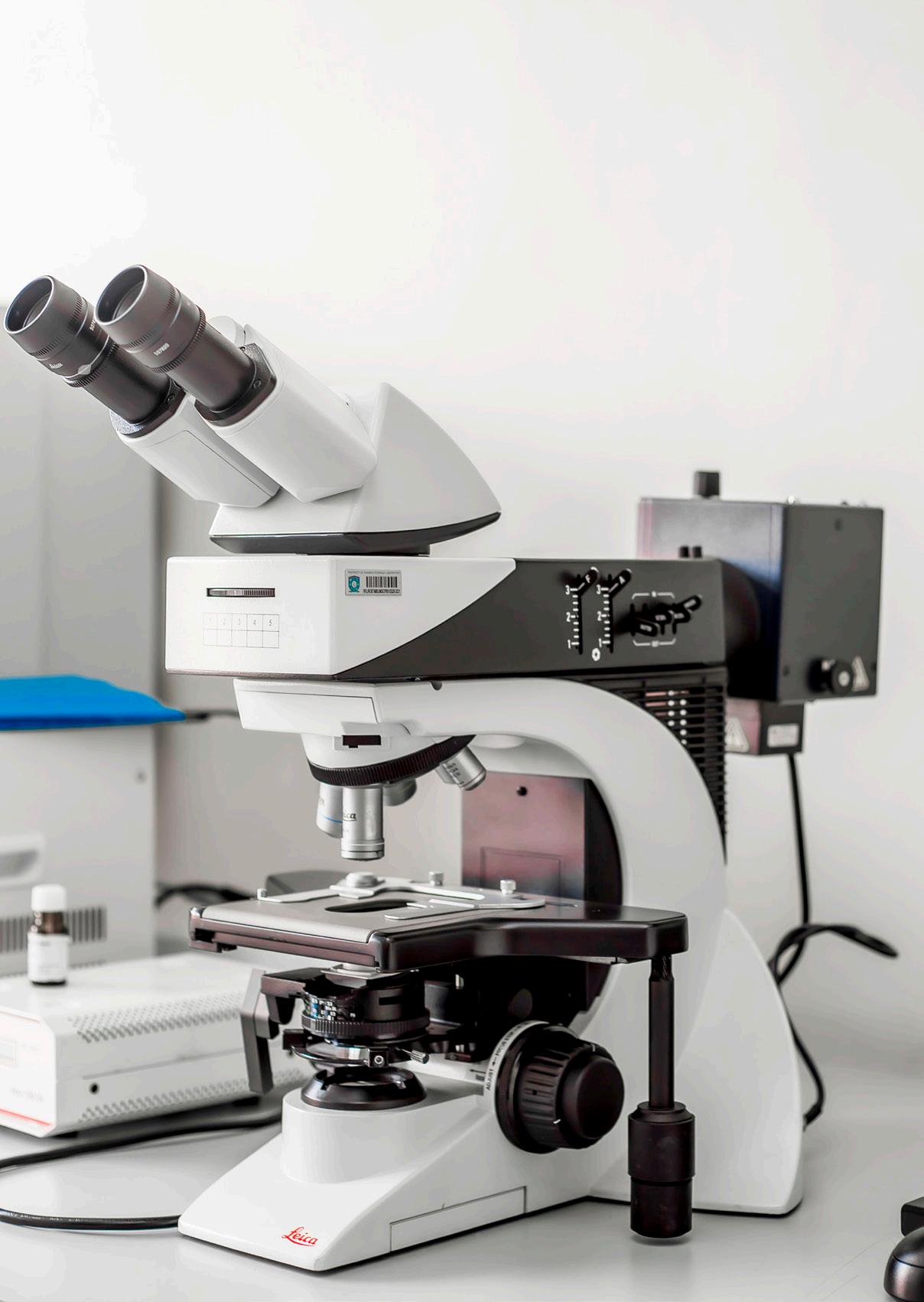
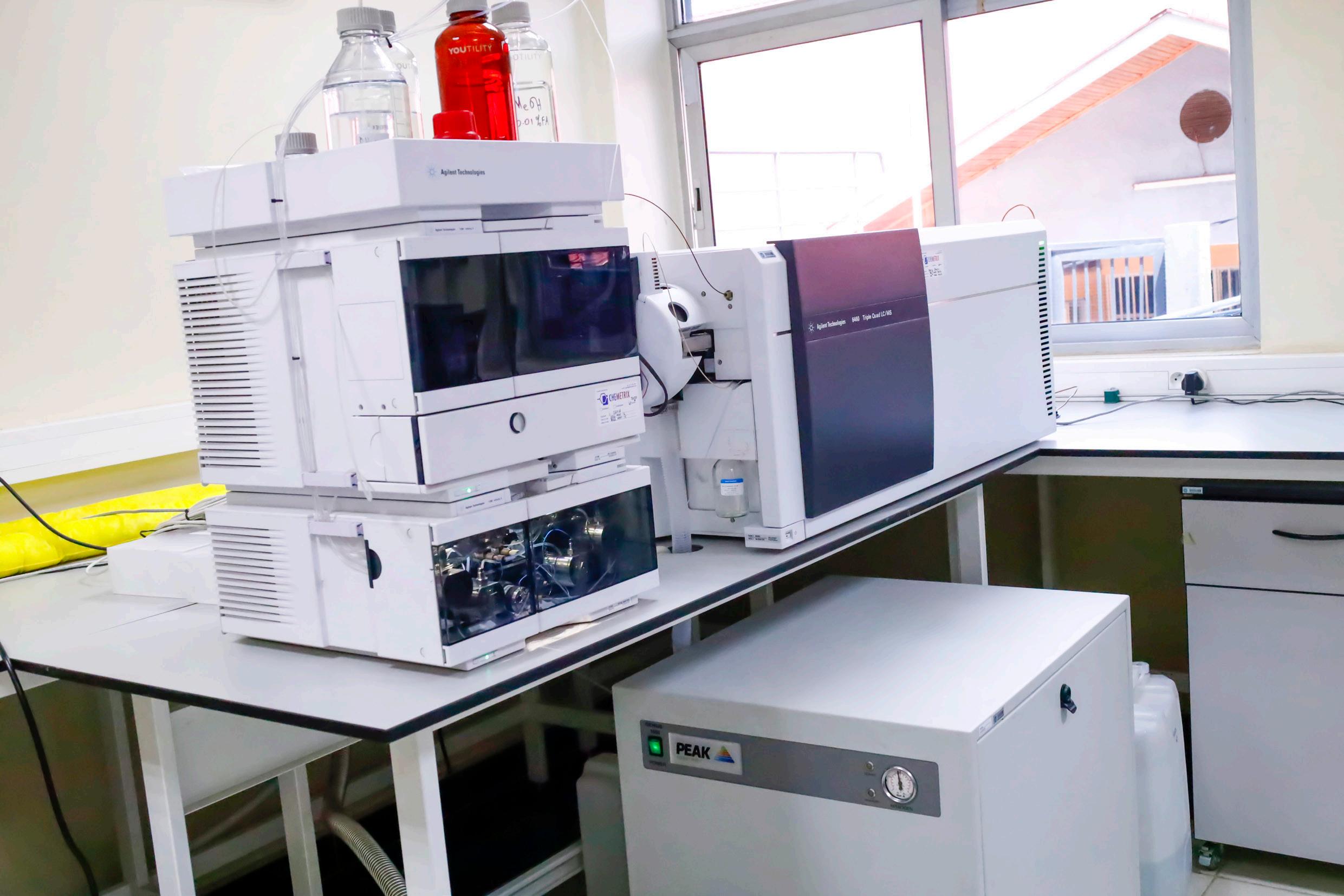
RFI competences are based on the following capabilities:
• Human Resources
• Equipment
• Systems
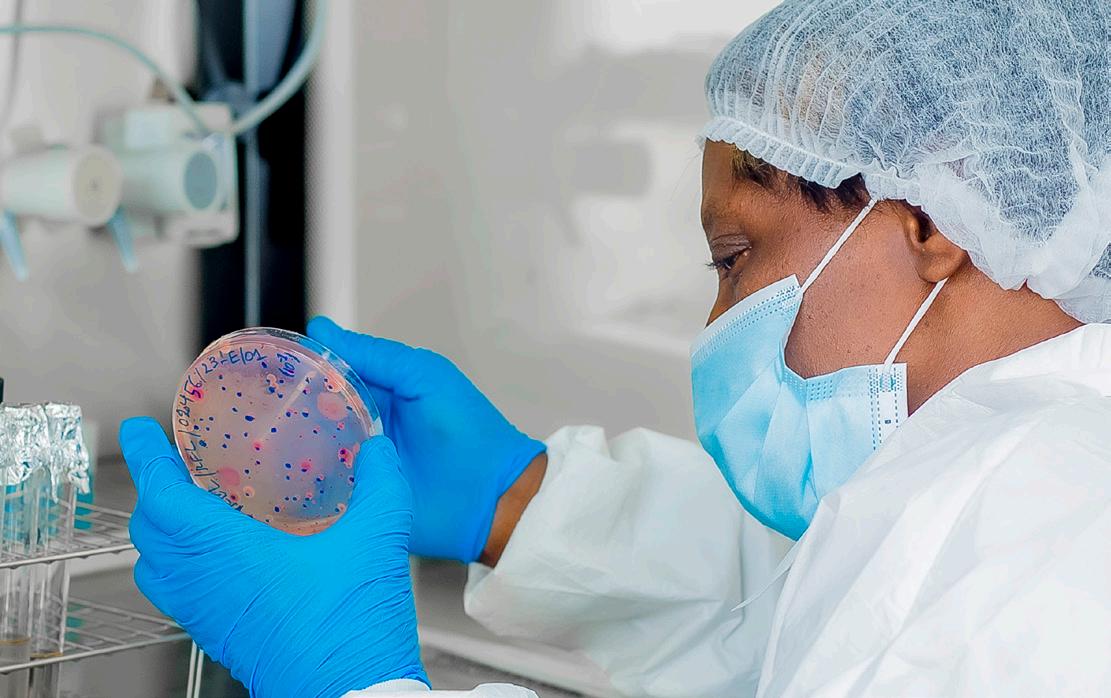
RFI has skilled staff who have acquired trainings from universities of global repute in India, UK, Germany, USA, etc.
RFI staff has academic levels in forensics and related sciences with various qualifications ranging from bachelor’s degree to PhD.
The staff strength is as follows:
04 PhD holders and 3 PhD candidates, 30 master’s degree holders and 3 master’s candidates), 02 with postgraduate diplomas, while 35 staff members have bachelor’s degrees.
Currently, RFI has total staff of 84 people (including seven support staff). Majority of our staff has acquired professional skills in latest technologies.
At Rwanda Forensic Institute, human resource is the pillar of the institution. RFI has created a conducive working environment for the staff. For instance, it has put in place important facilitation for staff welfare including and not limited to: refreshments, sports activities, transport at work, communication among others to cope up with the compliance to the forensic code of conduct.
Every year, RFI recognizes one employee of the year to motivate the staff for quality service delivery to our clients, partners, stakeholders, and the general public.
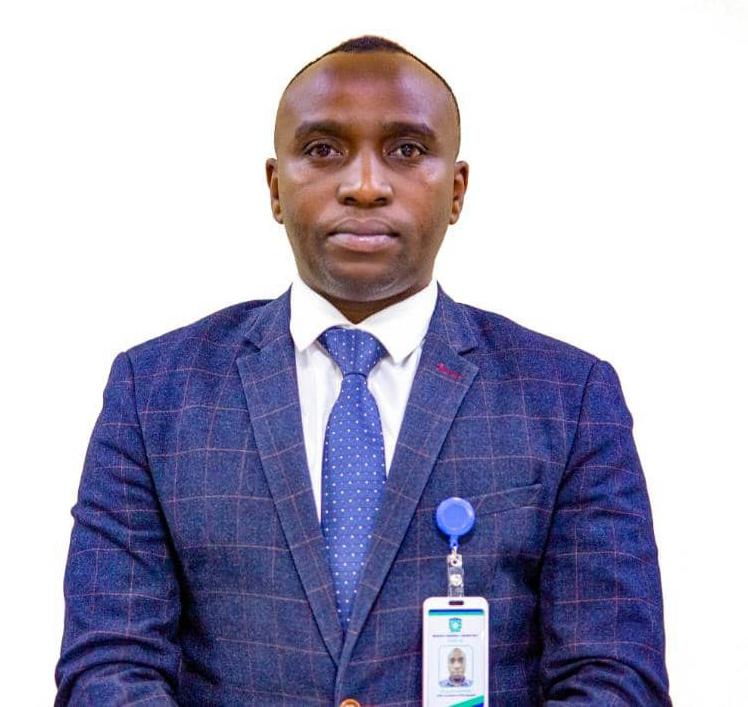
In-house and outside trainings are also in place for every staff according to their respective needs and divisions to ensure continuous professional development.
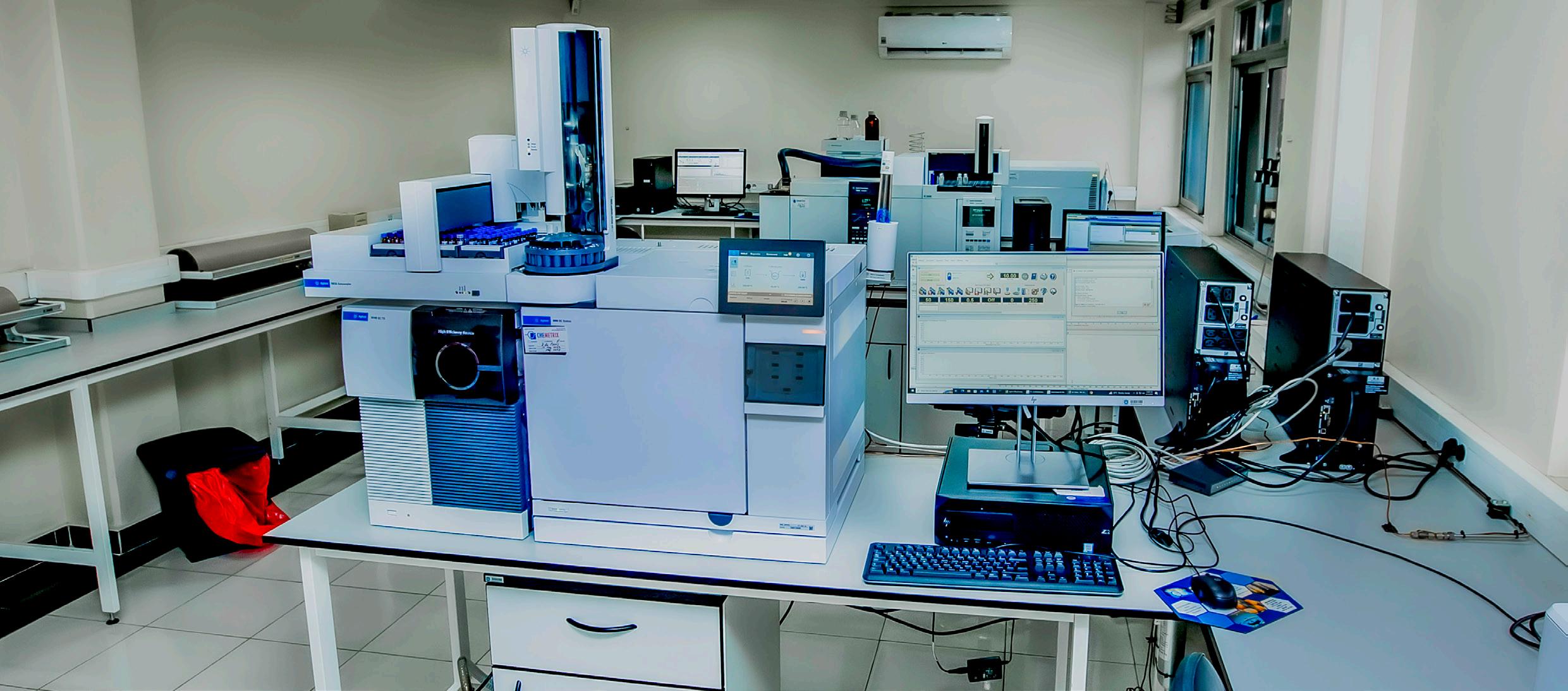
The Government has invested in modern equipment to ensure quality services within the country and in the region. Rwanda Forensic Institute has acquired internationally recognized state of the art equipment to comply with international standards.
The equipment is essential for RFI to deliver on its mandate.
The Institute has not only invested in the latest equipment and human resources, but also in systems and the latest software to help in managing samples, exhibits, clients, case reception and handling and chain of custody, among others.
Rwanda Forensic Institute has acquired Laboratory Information Management Systems (LIMS) to help with the management of large volume lab data and adherence to strict standards, while improving efficiency and turnaround time, enabling automation and management of laboratory workflow.
One of the main features that sets LIMS systems apart is an Auto-scribe Informatics, a leading provider of laboratory information management systems, offering flexible, configurable, and scalable software solutions to a variety of industries. This tool is designed to efficiently create optimized, highly adaptable workflows.
LIMS helps RFI in case registration and submission management, exhibits management and chain of custody, exhibit/sample testing process management, instrument management & interfacing, forensic reports management, reagents Management, customer relationship management and monitoring of Key Performance Indicators (KPIs) ,etc...
It also helps in maintaining ISO/IEC 17025:2017 requirements. It is the leading laboratory software around the world and is accredited by the World Health Organization as a key tool to help in the management of lab activities as well as automation.
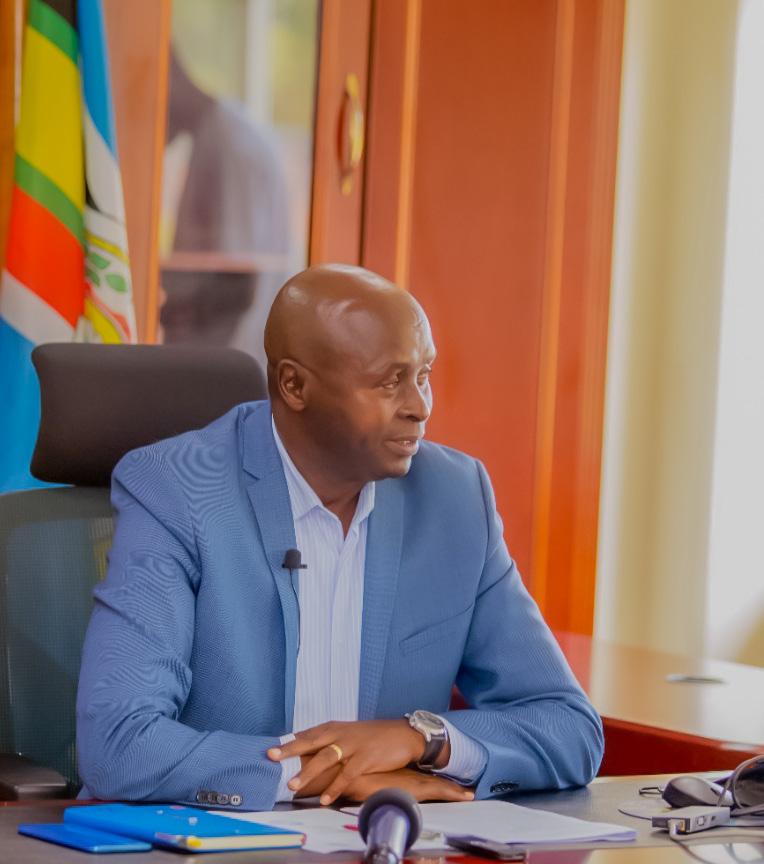
To get an insight of the Institution’s five-year journey, the achievements, challenges, and plans ahead, we caught up with Lt Col Dr. Charles Karangwa, the Director General of Rwanda Forensic Institute for an interview.
Question: Briefly tell us how RFI came into being and the rationale behind its establishment
Answer: The institution was established with the aim of providing high-quality forensic services to support criminal investigations, justice processes, and offer varied services to the general public.
Beginning with its background, forensic services started being offered in Rwanda 18 years ago to support the judicial system.
In 2005, Kigali Forensic Laboratory (KFL) was established by Rwanda National Police in collaboration with the National Public Prosecution Authority.
KFL had the responsibility of collecting evidences and sending them for testing in developed countries such as Germany, England and elsewhere because KFL did not have the capacity to process those cases. All this made Rwanda spend a large budget in order to test these cases abroad.
In 2016, the Government of Rwanda upgraded KFL to Rwanda Forensic Laboratory (RFL) by the Law N°41/2016 of 15/10/2016 establishing the Rwanda Forensic Laboratory and determining its mission, organization and functioning.
Early 2018, RFL became operational providing all forensic services as prescribed in its mission.
The Government of Rwanda has since operationalized RFL, enabling its capacity, staff and equipment to allow full operations. Among the tasks assigned to this laboratory, there was the provision of these services to Rwandans, neighboring countries, foreigners and everyone needing these services.
From March 2018 until today, where RFL became RFI, we are performing well, serving the community, institutions, and organizations with evidences that can help them get justice. Not only that, RFI has come with answers to other problems that affect daily lives of the community, both in matters of justice and other services.
Question: That sounds like a huge mandate. Could you briefly tell us about the key functions and services offered by the Rwanda Forensic Institute?
Answer: Rwanda Forensic Institute is responsible for a wide range of forensic services. We have specialized divisions dedicated to forensic biology, forensic chemistry, forensic physics and forensic medicine. We also provide support in the collection, preservation, and analysis of physical evidence from crime scenes.
Question: Impressive range of services indeed. How has the Rwanda Forensic Institute contributed to criminal investigations and justice delivery in the country?
Answer: The Rwanda Forensic Institute plays a vital role in enhancing criminal investigations and justice processes. Through our services, we have been able to provide crucial scientific evidences that support the prosecution of criminal cases. Our DNA analysis unit, for example, has helped identify perpetrators and exonerate innocent individuals in various criminal cases, thus contributing to fair administration of justice.
Additionally, our quality assurance practice ensures that evidence is properly collected and analyzed, leading to more accurate reconstruction of events and improved decision-making during investigations. The use of digital forensics has helped uncover important electronic evidence, such as communications, documents, and images, which are crucial for solving complex cases.
Question: It is evident that the Rwanda Forensic Institute is making significant contributions. Could you name a few milestones that you have recently achieved?
Answer: Recent achievement that I am particularly proud of include the successful upgrade from Rwanda Forensic Laboratory (RFL) to Rwanda Forensic Institute (RFI) as per cabinet meeting decision of 6th June 2023. Another achievement is that RFL has so far handled more than 35,000 cases, mostly criminal but also private cases, civil cases, etc,...
In the near future, RFI will have a center of excellence to that will be critical in building capacity of not only our officers but also
those from our partners in the region. We also plan to continue carry out awareness of our services in other countries, which will not only boost efficiency of the justice systems of these countries, but also bolster the image of our country on the international arena.
Moreover, we have also enhanced our capacity in the identification of disaster victims. In collaboration with partner international organizations, we have developed robust protocols and systems for identifying victims in the immediate aftermath of disasters, such as mass casualties or natural calamities.
Question: Any challenges so far?
Answer: The challenges we encounter include the financial resources that constrain us from fully discharging our mandate, despite the overwhelming support we receive from government.
Another challenge is in human resource where we still fall short of the critical mass of competent and skilled personnel in forensic science. There is also the issue of expensive equipment and reagents.
However, we are slowly finding solutions and making the most of what we have and continue advocacy. We hope that in the near future we will find a solution to most of these challenges.
Question: Those are remarkable accomplishments. Looking ahead, what are the future goals and initiatives of the Rwanda Forensic Institute?
Answer: As we look to the future, we aim to further strengthen our capabilities and expand the scope of forensic services provided. We plan to invest in advanced technology and training to enhance our ability to handle emerging challenges in forensic science.
Additionally, we are working on establishing collaborations with regional and international forensic institutions to promote knowledge sharing and exchange of best practices. This will allow us to stay at the forefront of advancements in forensic science and contribute to the global forensic community.
Question: Excellent vision for the future. Lastly, what message would you like to convey to our readers regarding the importance of forensic science and the work of the Rwanda Forensic Institute?
Answer: Forensic science plays a pivotal role in ensuring justice, protecting society, and providing closure to victims and their families. The work of the Rwanda Forensic Institute is crucial in strengthening the rule of law and fostering a safe and secure environment for our citizens. I encourage stakeholders to recognize the significance of forensic science and support its development, both in Rwanda and worldwide, to promote truth, accountability, and justice.
Thank you.
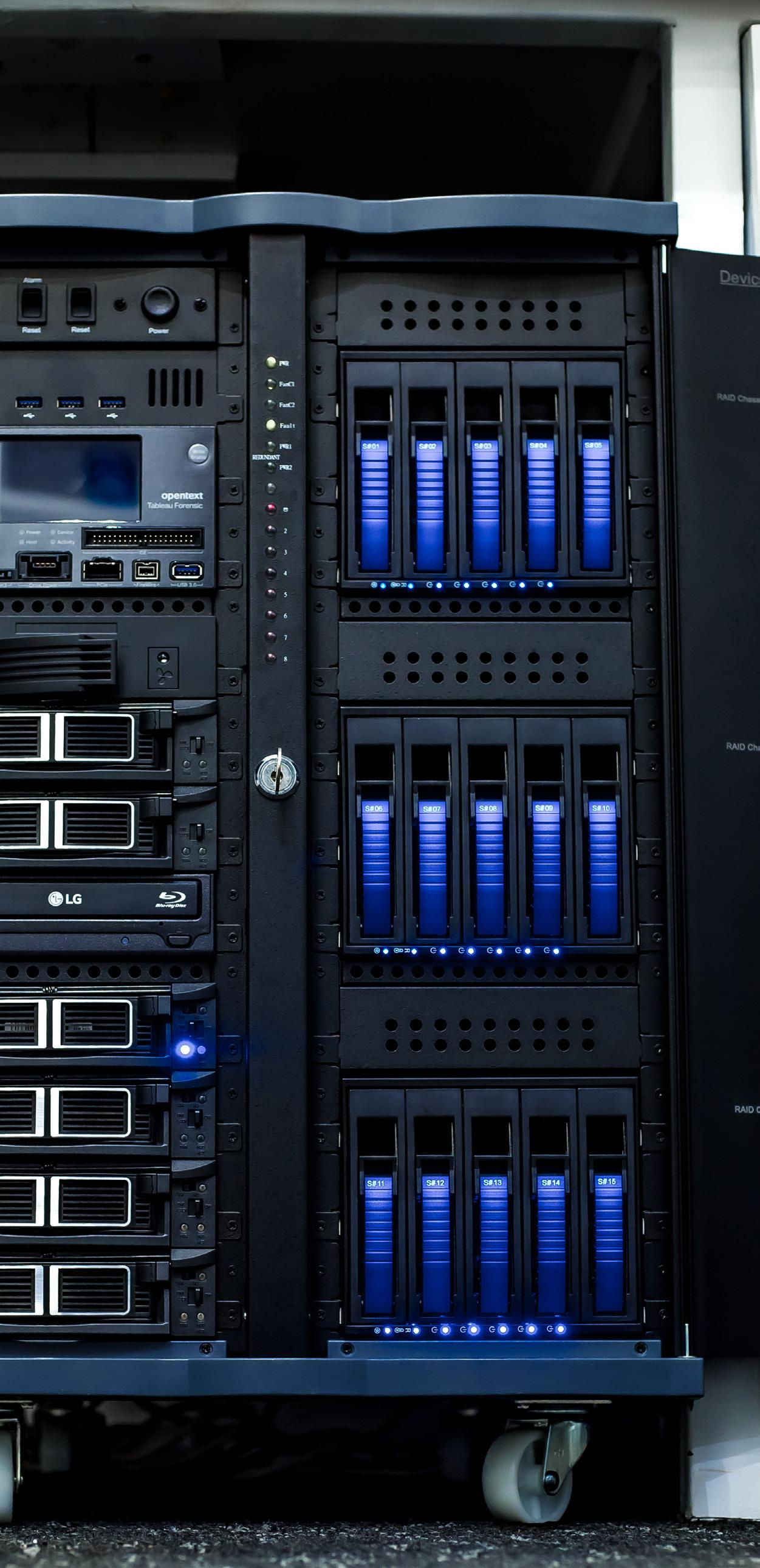
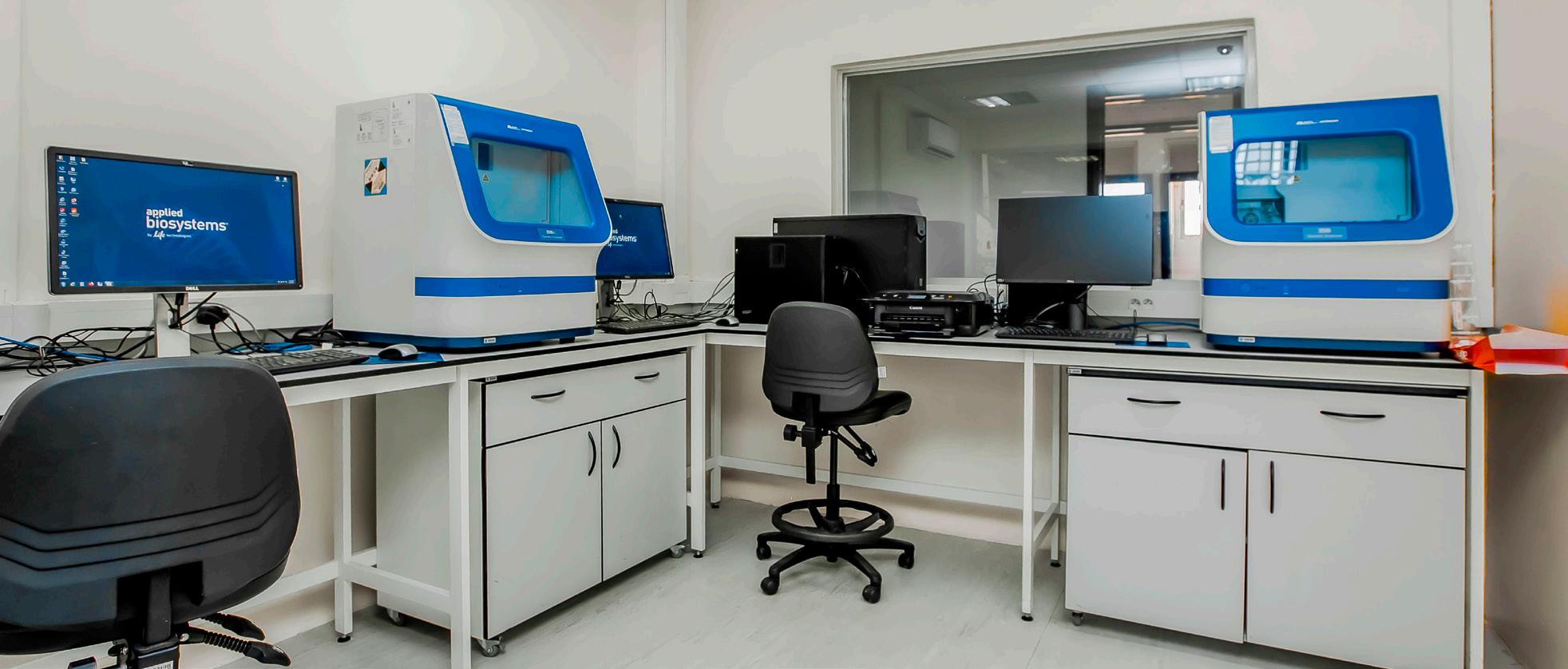
Forensic DNA services refer to the application of DNA technology in the field of criminal & civil investigation, and law enforcement. They involve the collection, analysis and interpretation of DNA result of evidence collected from crime scenes, victims or suspects.
DNA is the genetic material that contains the instructions for the development and function of all living organisms. DNA also contains noncoding regions, variable among individuals (short tandem repeats, STR); those regions are analysed to establish a DNA profile, also called DNA fingerprint.
Genetic material is found in all living cells. Therefore, DNA evidence can be obtained from a variety of biological samples, such as blood, semen, hair and saliva. DNA services include identification of biological traces from various evidentiary samples.
Forensic DNA standard services typically use polymerase chain reaction (PCR) to amplify short tandem repeats (STR). A set of STRs forms the DNA profile. DNA profiles
generated from evidentiary samples can then be compared to DNA profiles from reference individuals. The use of DNA evidence has been a major advance in criminal investigation: DNA profiles can help to identify perpetrators and help in convicting people who have committed serious crimes as well as exonerate innocent individuals.
Another DNA service is to establish the relationship between people by comparing their genetic profiles in cases of defilement, rape, murder or abortion. DNA test confirms or negates the alleged relationship: paternity, maternity or other relationships. The same technique is used to identify human remains by comparison with DNA profile of supposed family members.
DNA services also address private requests for paternity testing to determine if two individuals are biological parents of a child. In addition, the DNA unit carries out kinship testing to determine biological relationship between individuals: e.g. aunt/uncle with niece/nephew, siblings ... Again, DNA profiles of living persons can be compared with DNA profile obtained from the deceased, as long as that burial site is properly localised
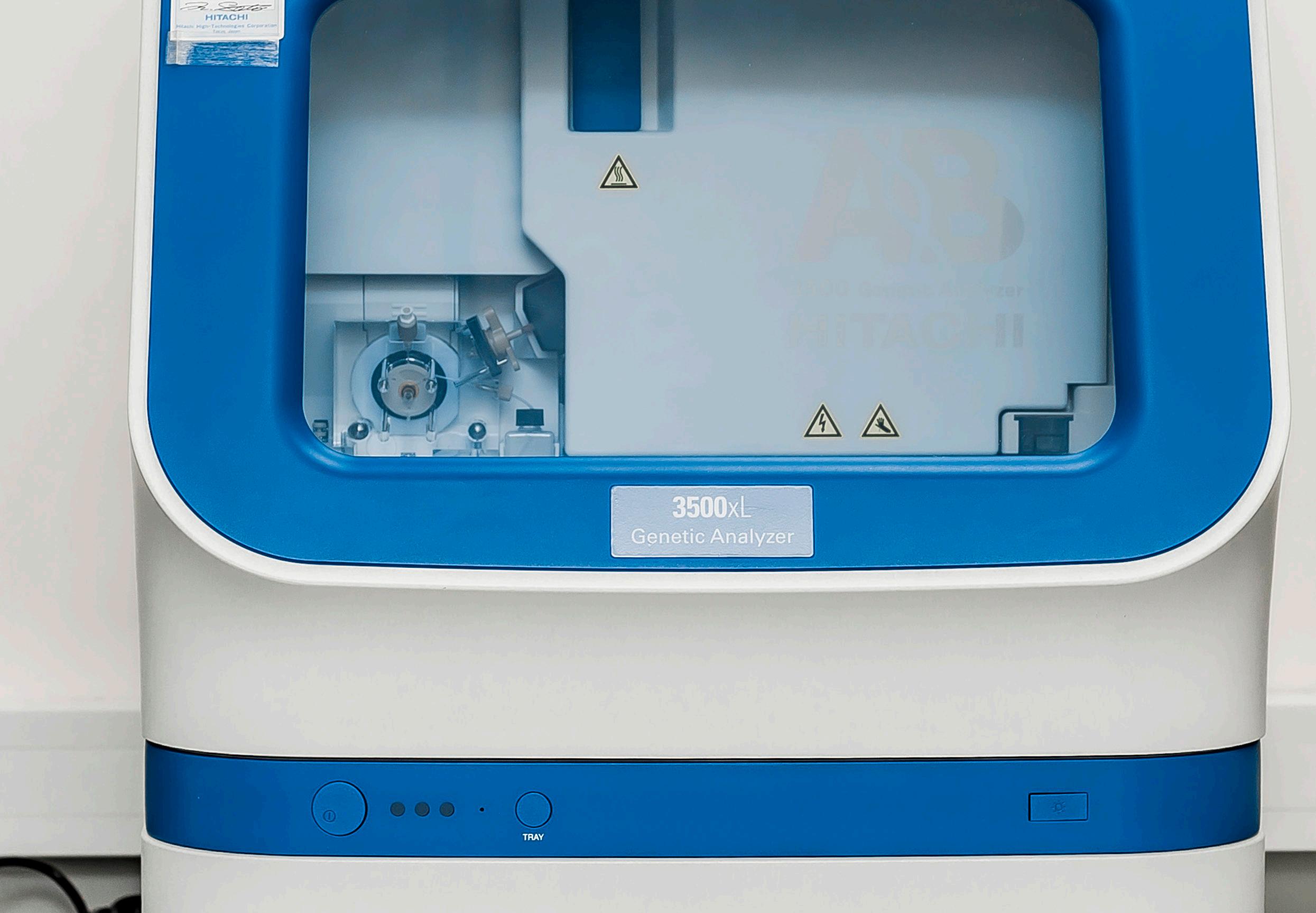
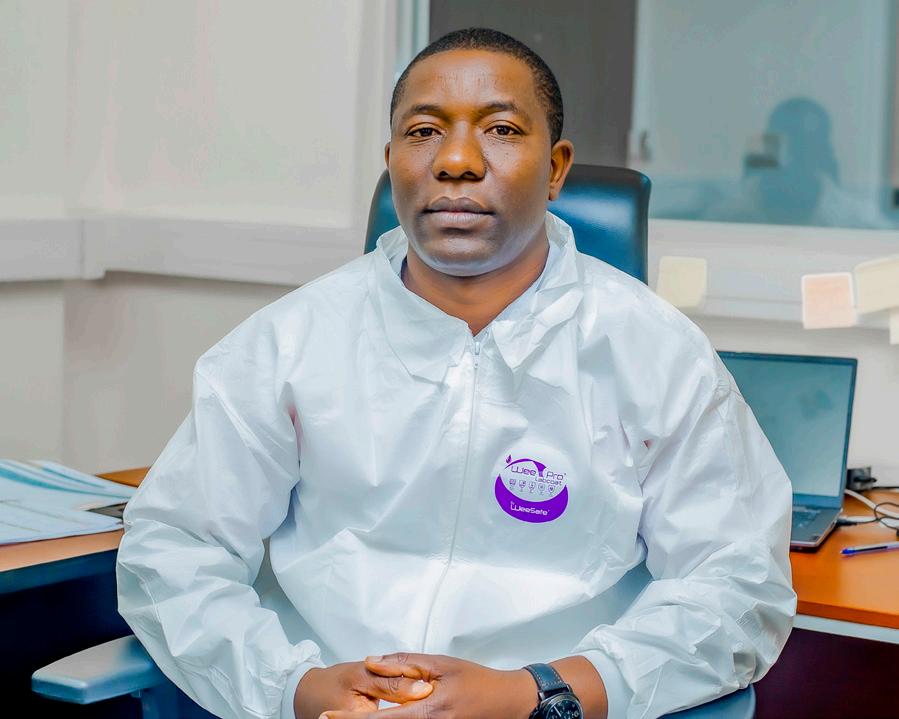
DNA is one of the key services and arguably one of the most sought after at the Rwanda Forensic Institute (RFI). During an interview with SP Pascal Bavugirije, the unit director, he shed light on capabilities of the unit, and generally how this unit has contributed to the fair justice administration in the country.
Can you start by introducing yourself?
My name is Pascal Bavugirije, I am Superintendent of Police.
I studied biotechnology at the University of Rwanda then I specialized in Forensic DNA Analysis at the University of Wolverhampton (United Kingdom).
I have been working in Forensic Science Laboratory since 2012 and I have been the Director of the DNA Unit for the last 4 years.
Rwanda is known as a high-tech country but some people think African countries still lag behind in technology. Would you describe how your service is helping the justice vis a vis the advancement of technology in Rwanda?
Indeed, many people, including Rwandans, believe that our continent is not yet
advanced in forensic services because of inadequate technology. But Rwanda is a good example of an African country that has made deliberate progress in advancing technology and innovation. For example, The Government of Rwanda invested in state-ofthe-art equipment and building capacity of the workforce to global standards. Our DNA experts studied and got forensic DNA experience from international universities of UK, Germany and India. As a result, Rwanda’s goal of using forensic science in providing justice is being achieved, progressively.
You’ve mentioned staff with experience and expertise in forensic science, what about the equipment in the DNA unit?
RFI has a world-class facility with modern equipment that meets international standards and is used in other countries for the same applications.
From February 2022, we are using the Laboratory Information Management System (LIMS), which allows the DNA Unit to manage the samples and associated file information smoothly. This is much more efficient compared to physical paperwork. By using LIMS, the DNA Unit was also able to integrate instruments, meaning that steps of the workflow are managed through the software and the generated results are automatically transferred to the reports. Considering the large number of cases submitted to the unit, LIMS has accelerated the work and reduced the turnaround time from two weeks to seven days for paternity/kinship testing.
Do you offer services to people beyond Rwanda’s borders?
The unit receives cases from all over the world: America, Africa, Asia and Europe. In some cases, foreigners come to RFI for DNA profiling. In other cases, samples are collected abroad by recognized laboratories and shipped to RFI.
What does one need to get these services?
To get the DNA service, the customer must fulfil the following requirements:
Partner institutions:
• Accurate requisition form
• Purchase order
• Physical exhibits or Reference.
Private customers:
• Signed consent form
• Identification ducuments
• Proof of payment
• Physical presence of all the participants for sample collection
What are your goals for the next five years?
Our projects for the next five years generally aim at improving and upgrading the use of forensic science in delivering justice in a timely manner.
We want to develop non-human DNA analysis. This will serve different areas including wildlife forensics to fight illegal trade of protected plants or animals, and plant identification in suspicion of poisoning.
Other projects are related to the fight against Gender Based Violence (GBV). Teen pregnancy is a problem with lifelong consequences for the mother, her child and the vulnerable family. We plan to support the access to justice for vulnerable teenage mothers and their children in case of paternity denial.
A second anti-GBV project is the development of sexual assault kits adapted to the local economy. Indeed, biological evidence might be the only way to identify a perpetrator and the proper handling of the evidence is a prerequisite for conclusive results. However, commercial kits are expensive and limit the optimal collection of samples. Homemade kits could fill this gap.
Eventually, establishing a DNA database to store DNA profiles of convicts and DNA evidentiary samples. This is another important project particularly relevant for sexual assault cases. It will allow comparison of crime scene evidence of past and future crimes.
The DNA database will also be a helpful tool to solve cold cases. Moreover, missing person DNA databases will enable the matching of family reference samples to those of unidentified deceased persons.
Is there anything you would like to share with the readers as your parting shot?
My message to readers is that they are welcome to visit our office to find out more about the various services we offer. We shall keep helping everyone to get justice.
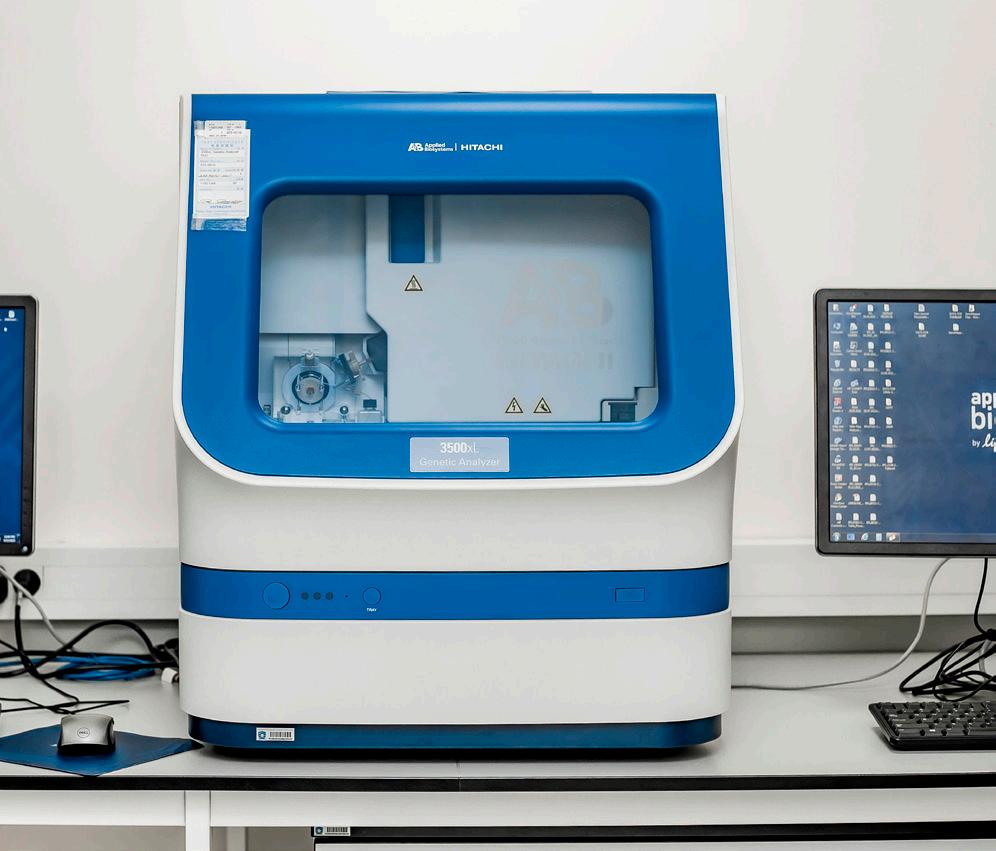
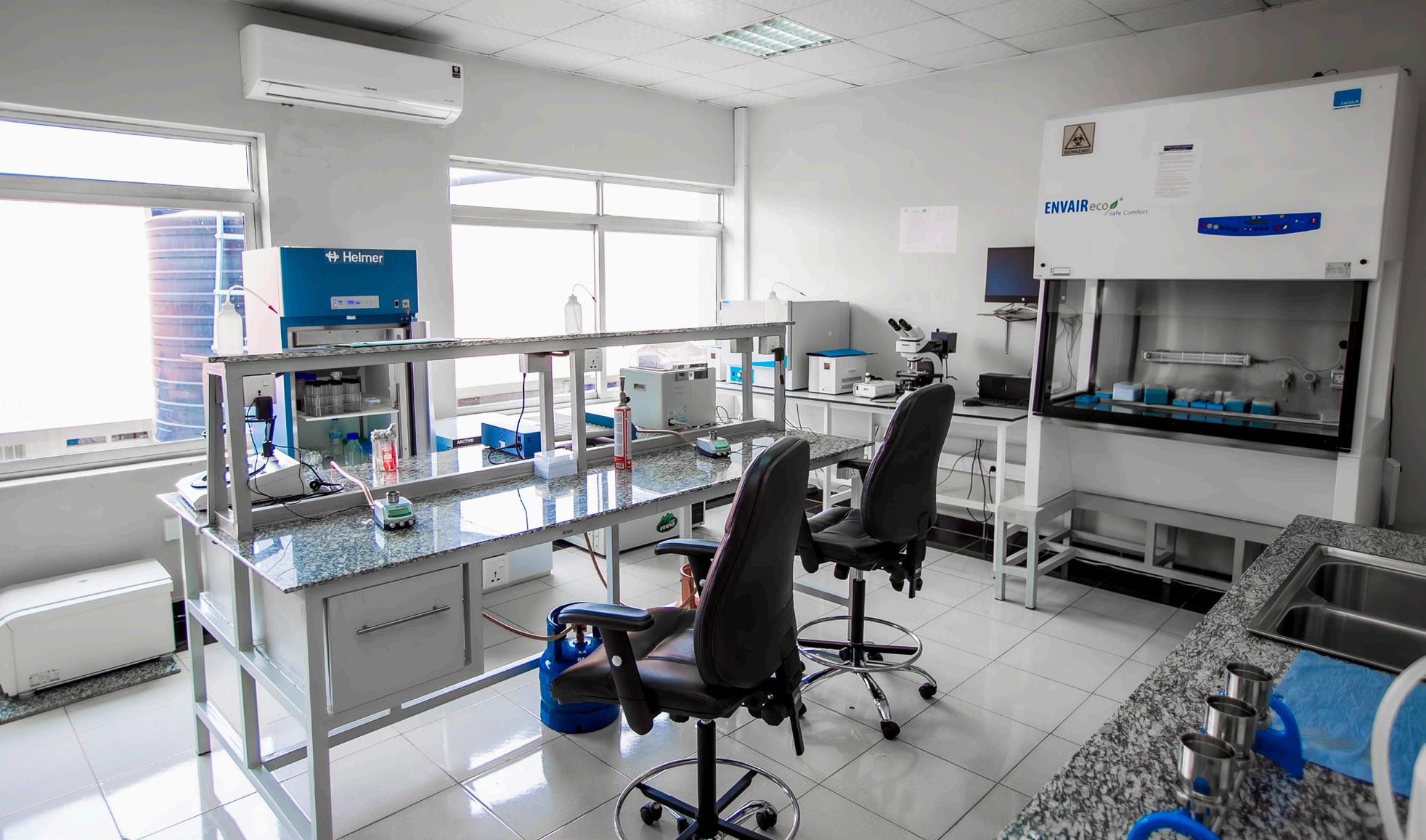
Forensic microbiology services refer to the use of Various Microbiology techniques to analyze and identify microbiol signature in the context of criminal investigations and legal proceedings.
Forensic microbiology services are typically performed by specialized forensic microbiologists, who use a variety of techniques to analyze Samples collected from crime scenes. These techniques may include microbial culturing, microscopic, biochemical and molecular techniques.
Forensic microbiology services may be used to identify the presence of microorganisms such as bacteria, fungi or viruses, in non biological samples taken from crime scenes or from biological samples from victims. They may also be used to determine the source of microbial contamination, such as in cases of food poisoning or waterborne illnesses.
Forensic Microbiology is a new scientific discipline established to strengthen the law enforcement response especially in a bioterrorism.
Forensic microbiology services can also be used to link suspects to crime scenes by analyzing microbial fingerprints present in collected evidence from the crime scene and those found on suspect or objects (clothing, shoes or tools) from the scene of crime.
Forensic microbiology services play an important role in criminal investigations and legal proceedings, by providing valuable evidence that can help to identify suspects, link crimes, and bring criminals to justice.
The application of forensic microbiology may include:
Determining the cause and time of death: Microbial analysis of tissue and bodily fluids can help to determine if the death was caused by microbial infection and time of death.
Identifying suspects: Microbial analysis of samples such as blood, saliva, or semen can help to identify criminal activities of suspects in in vestigations.
Environmental Monitoring: Microbial analysis of environmental samples such as soil or water can provide valuable information about environmental contamination of microorganisms and the extent of contamination for environment (soil and water).
Biodefense: Forensic microbiology can also be used in the investigation to determine if an outbreak is bioter-rorism attacks (deliberate releases of biological agents).
Public Health: Some of the key applications of forensic microbiology in public health is to help in outbreaks Investigations and in implementing public health intervations inorder to ensure bio- terrorism preparedness, global health security, food safety and water safety.
An interview with CIP Immaculate NDAGIRE, Director of Microbiology unit
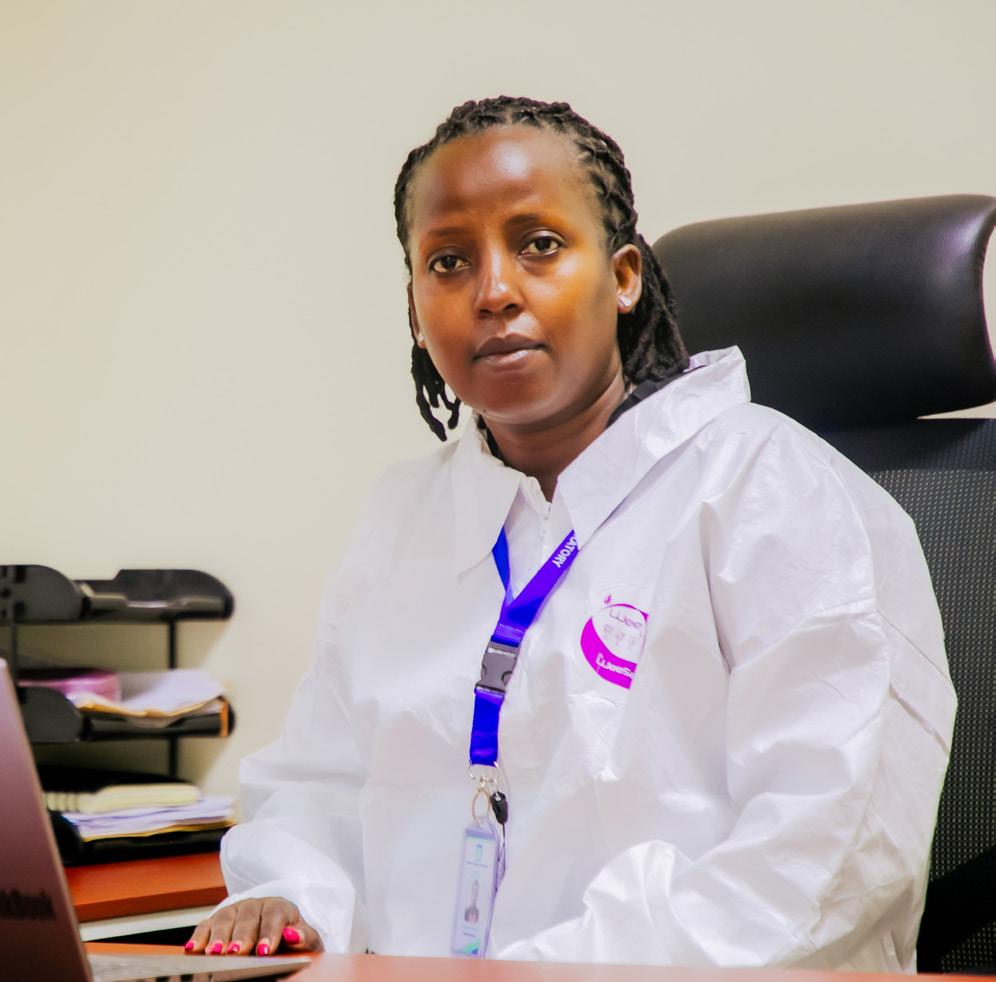
Microbiology is another unit of Rwanda Forensic Institution that helps to analyze cases that include food intoxication or poisoning as well as supporting pathology examiners to determine the cause of death. We had an interview with CIP Immaculate NDAGIRE who gave an insight into the nature of services offered by the unit and their future plans.
May you start by introducing a bit about yourself and your responsibility in Rwanda Forensic Laboratory?
My name is Chief inspector of Police Immaculate NDAGIRE, currently the director of Forensic Microbiology Unit. As the director of this unit, I have different responsibilities, which include supervising, and coordinating all staff members within the Unit, attending crime scenes to protect, collect,
package and process samples if requested; involved in cataloguing and calibrate analytical instrumentation on a routine basis for analyzing samples, among others.
In summary, give us a snapshot of the unit’s functions and services…
Forensic Microbiology is a new scientific discipline established to strengthen the law enforcement response especially in emerging crimes such as bioterrorism and other related criminal investigations carried out by the Rwanda Forensic Institute.
Such investigations may include suspected use of microorganisms, their toxins, or their associated ancillary products to commit acts of crime or terror. Forensic Microbiology is also applied in criminal investigation of any emergency cases, if it’s originated from microbial infection. i.e. food poisoning or foodborne intoxication (outbreak investigation).
Postmortem Microbiology also helps to determine if the sudden unexpected death is due to microbial infection. It can also checks possible contamination of foods and drinks, industrial products like juice, water, milk and other dairy products before their consumption. Microbiology can also be applied while investigating the transmission of pathogenic micro-organism caused by sexual abuse and other physical offenses.
Can you tell us about your current capabilities in terms of equipment and staff?
Regarding our staff capabilities currently, the Microbiology Unit has four staff members. One of us, - is pursuing his PhD studies in Microbiology. Two other members (microbiology specialists) hold master’s degrees in Forensic Biotechnology, while the fourth one who is a microbiology officer, is a holder of a bachelor’s degree.
Forensic Microbiology is well equipped to undertake our daily activities. All RFI Microbiology Practices meet international standards, the staff members have requisite skills to operate this equipment to provide microbiological evidence All unit procedures are interfaced with LIMS to maintain good performance of the unit and monitor quality service delivery. LIMS is userfriendly and helps us track all chain of custody in the system. It helps to increase operational efficiency and productivity as well as streamline the reporting channel.
Can you tell us your vision for the next 5 years?
We are preparing to start the microbiological analysis of evidence with ( New Droplet Digital PCR System) To fasten pathogens analysis and high sensitivity with a big range of detection (12 targets in a single well).
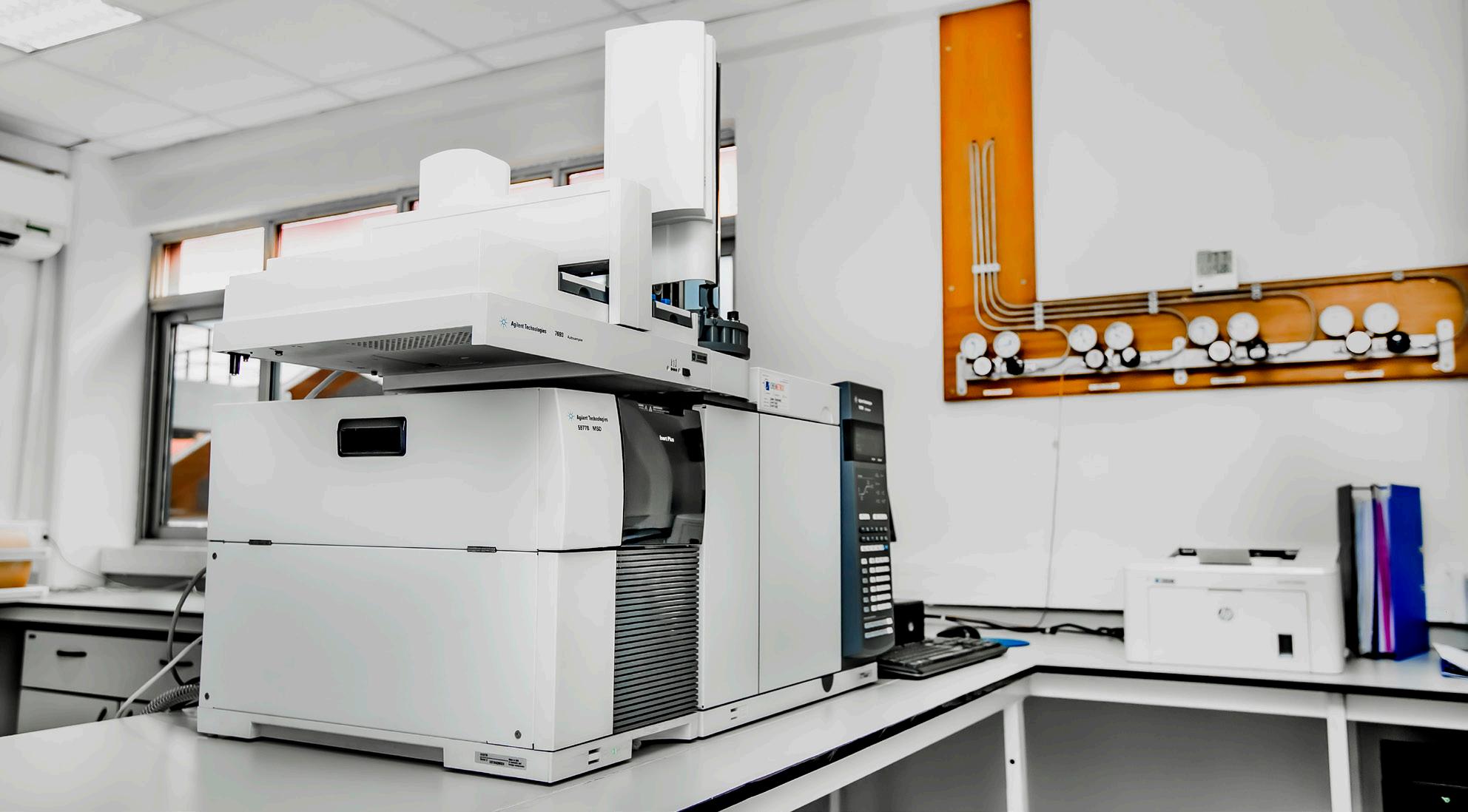
Forensic Chemistry and Drugs Services refer to the analysis of substances and chemicals in the context of criminal investigations and legal proceedings. These services involve the examination and interpretation of evidence related to drugs and other chemical substances, such as seized drugs, pesticides, pharmaceuticals, explosives, poisons, and trace materials.
Forensic Chemistry and Drugs Services are typically carried out by specialized forensic scientists on evidence brought by law enforcement agencies, private or individuals. They use a variety of analytical techniques to identify and quantify substances, including gas and liquid chromatograph coupled with mass spectrometry, Fourier Transform Infrared (FT-IR), etc.
The analysis of drugs and chemicals in forensic investigations can have a wide range of applications, including the identification of illicit drugs or pharmaceuticals, to determine impairment or drug-related crimes. Forensic chemistry services may also be used to identify the source of different substances such as explosives, poison, fibers, glasses, paints, etc.
The results of Forensic Chemistry and Drugs analyses are often presented as expert testimony in court and can play a crucial role in fair justice delivery.
An interview with SP Salve HABUMUGISHA, Forensic Chemistry and Drugs Unit
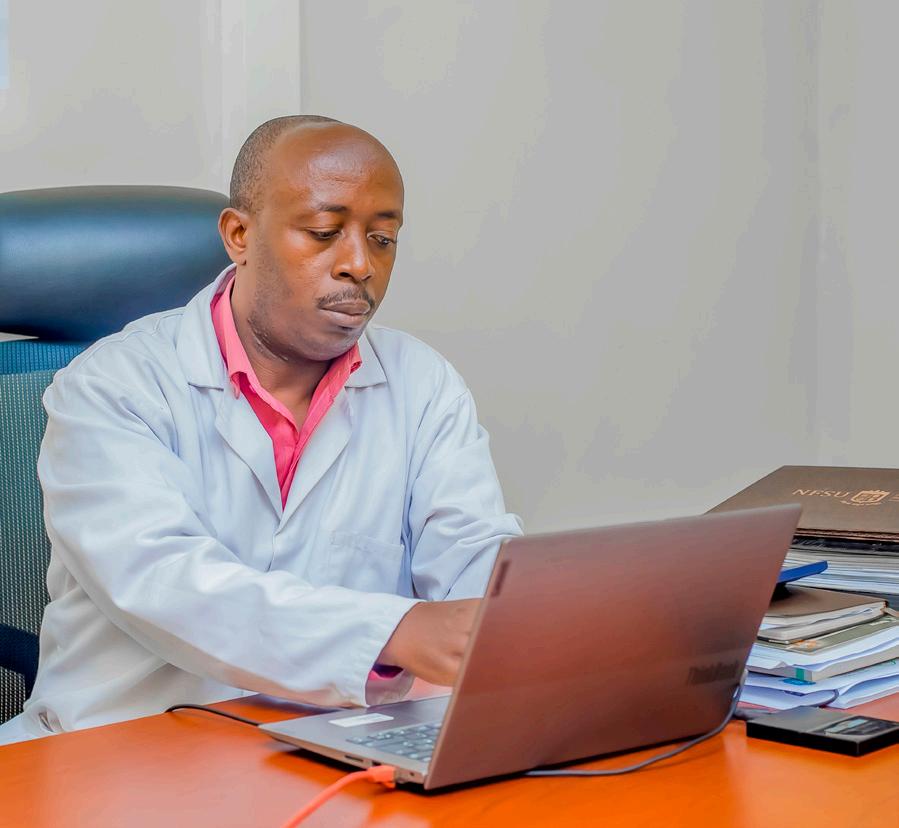
A chat with Director of Forensic Chemistry and Drugs Unit SP Salve Habumugisha
Forensic Chemistry and Drugs Unit deals with determining the level of harmful alcohol like Methanol and Ethanol in the production of illegal beverages; analysis of pharmaceutical drugs, pesticides, etc… for abuse cases and investigate any type of toxicant in the matrix sample.
In an interview with SP Salve HABUMUGISHA, Director of Forensic Chemistry and Drugs Unit you are going to explore more about this unit.
May you start by introducing yourself, the services offered by in Forensic Chemistry and Drugs Unit you are heading?
TThank you, I am SP Salve HABUMUGISHA, the Director of Forensic Chemistry and Drugs Unit. The unit of forensic chemistry and drugs utilizes chemistry theories, principles and methods to handle the physical samples of chemistry nature collected at crime scene and provide supportive evidence which is
able to help judicial system to come up with right verdict or judgement during court of law. The unit offers its services depending upon clients’ request, be it criminal or private (social) case at national, international, individual and institutional levels. The variety of services offered to our clients depends on chemistry of received samples and analytical techniques utilized to analyze them.
We do analysis of Narcotic Drugs and Psychotropic Substances (NDPS). These are internationally controlled/illicit drugs as mentioned by United Nations Office on Drugs and Crime (UNODC). In Rwanda, major part of these drugs are seized at airports and terrestrial borders from drugs dealers (drugs traffickers) be imported or exported. They are often found in different physical forms such as tablets, capsules, gels, injectable solutions, fine powders, plant materials, crystals and most often are clandestinely manufactured. Their consumption has a great impact to the society such as rape, murder, mental disorders, poverty and robbery. The example of NDPS are cannabis, cocaine, amphetamines, heroin, etc.
There is also analysis of Agro-veterinary chemicals. These are chemicals substances which are utilized to kill pests in agriculture and veterinary areas. They are classified into different types depending on type of pests such as rodenticides, herbicides, insecticides, fungicides, etc. Based on their chemical properties, there are organo-chlorinated, organophosphorous, carbamates and pyrethroÏds. They are predominantly used in poisoning cases (e.g. homicide/suicide) or mixing with foods and drinks for the intoxication purpose.
Our unit carries out analysis of alcohols and volatile substances. Ethanol (Ethylic alcohol) is an alcohol found in beverages (Beers, wines, liquors, etc.) as major ingredient at different concentrations depending on type of alcoholic beverage. Locally made alcoholic beverages are still a major concern world widely as well as Rwanda due to different factors linked to their production methods. Sometimes, alcohol concentration exceeds the normal values as it has been stipulated in the law. Besides that, methanol and other organic volatiles (acetone, ethylene glycol, 2-propanol) are detected in drinks due to poor preparation and raw materials.
Analysis of pharmaceutical drugs: These are drugs used to diagnose, cure, treat, or prevent diseases. They are used under prescription of medical doctor or physician. They are classified into different categories based on their application, such as analgesics, anesthetics, antibiotics, antiseptics, hormones replacement, antipyretics, tranquilizers, stimulants, mood stabilizers, etc. Some of these categories affect the activities of brain (CNS) by either boosting or slowing down it. Most often, people abuse them in different cases, such as abortion, suicide, homicide, rape, robbery, doping, etc.
Furthermore, we analyze heavy metal residues. Heavy metals are metallic chemical elements that have a relatively high density and are toxic or poisonous at low concentrations. Examples of heavy metals include mercury (Hg), cadmium (Cd), arsenic (As), chromium (Cr), thallium (Tl), and lead (Pb). They are mixed with foods or drinks for the poisoning purpose. When consumed, they lower energy levels and damage the functioning of the brain,
lungs, kidney, liver, blood composition and other important organs.
Our unit deals also with analysis of explosives. They are reactive substance that contains a great amount of potential energy that can produce an explosion if released suddenly, usually accompanied by the production of light, heat, sound, and pressure. Explosives are illegally made to kill (homicide or suicide) people in different criminal cases. They are classified into different categories: organic or inorganic and high or low explosives. Examples of explosives are TNT, RDX, HMX, TATP, PETN, Ca(NO3)2, as well as other toxic substances. This category concerns with rest of the chemical substances (organics and inorganics) which are naturally toxic such as carbon monoxide, cyanide ions, nitrates and nitrites ions, active principles of poisonous plants, etc.
What are the capabilities of the unit you are heading?
Rwanda Forensic Institute is well positioned in terms of equipment, personnel and system in general. Just specifically we are going to look at the capability of the Forensic Chemistry and Drugs unit in terms of staff and equipment.
Unit personnel: Forensic Chemistry and Drugs unit, has 04 staff members (04 males): Director (1), Specialists (02) and officer (1). They are all qualified in the field of forensic chemistry and toxicology program with master’s degree from India, Gujarat-Gandhinagar, National Forensic Sciences University (NFSU). They have more than three years of experience working in forensic laboratories, especially in handling physical evidence of chemistry nature. Moreover, they got advanced training in different laboratories, be it in Rwanda or Abroad for instance United Kingdom, Germany, India, Kenya, Ghana, etc.
Laboratory equipment: These are equipment which facilitate in conducting scientific experiments in the laboratory. They are categorized into two: equipment for sample pre-treatment and analysis. The most used techniques in pre-treatment are: fridges, freezers, glassware, fume hoods, water bath, ovens, shakers, hotplates, nitrogen generators, centrifuges, mixers, rotor evaporators, balances, etc. While equipment for analysis, are grouped into chromatography and spectroscopy techniques. The instruments are namely High Performance Liquid Chromatography with Diiode Array Detector (HPLC-DAD), Headspace Gas Chromatography with Flame Ionization Detector (HSGC-FID) Gas Chromatography hyphenated to mass spectrometer (GC-MS),Fourier Transform Infrared (FT-IR) and Glass Refractive Index Measurements (GRIM).
What are the requirements for a client to get your services?
There are some requirements that we request our client to get our services: A well filled requisition form ; ID or passport;
• Proof of payment of purchase order;
• Physical exhibits or samples.
May you share with us your projection in next 5 years?
This unit will continue to be in line with the future projects of Rwanda Forensic Institute of providing quality forensic services; becoming the Center of Excellence for the forensic sciences in the region, expand the partnership with the advanced forensic institutions for the exchange of the expertise. .
Anything else you can share with our leaders?
Thank you for the interview. I also thank the partners and stakeholders of the unit as well as the management of RFI to have made efforts towards the operationalization of the unit..
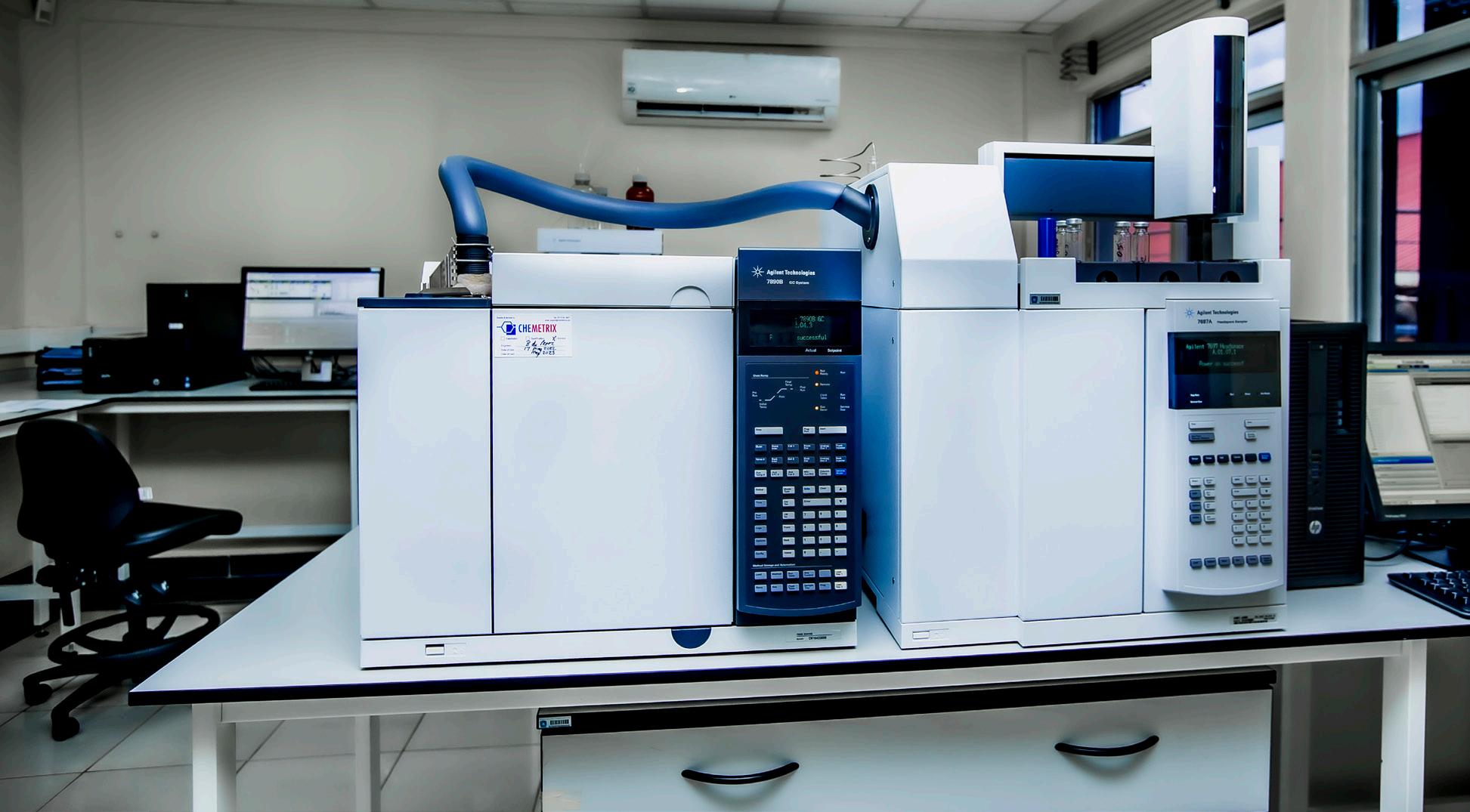
Forensic toxicology and Blood alcohol services refer to the use of scientific methods to detect and analyze drugs, chemicals, alcohols and other toxins in biological samples, such as blood, urine, Stomach contents, bile, etc. in the context of legal investigations and proceedings.
Forensic toxicology services are used in a variety of legal contexts, including criminal investigations, workplace accidents, and civil lawsuits. The results of these analyses can help determine the cause of death in suspicious or unexplained deaths, evaluate the role of drugs or alcohol in motor vehicle accidents, and detect the presence of performance-enhancing drugs in athletes (Doping drugs).
Forensic toxicology services are also used in cases involving drug-facilitated crimes, such as sexual assault or robbery, where the victim may have been unknowingly
drugged. In these cases, forensic toxicology analysis can identify the presence of drugs in the victim’s body system and help establish the circumstances of the crime.
Forensic toxicology services play a crucial role in legal proceedings by providing scientific evidence that can help establish the presence or absence of drugs or toxins in biological samples and aid in the determination of cause and manner of death in suspicious or unexplained death cases..
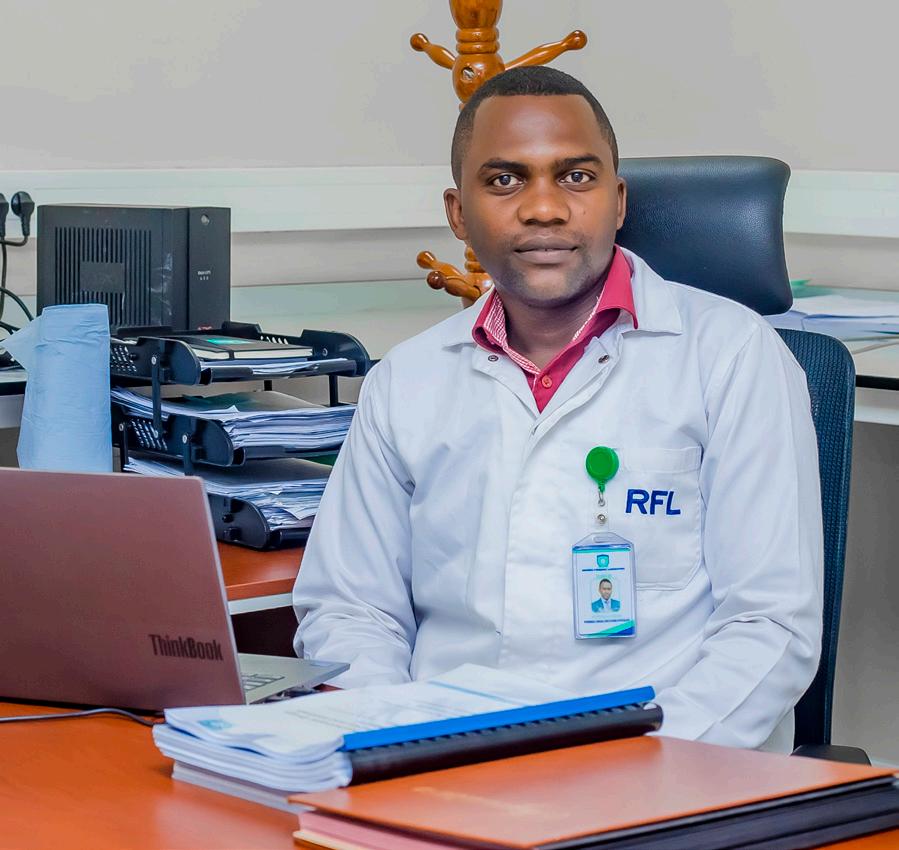
The unit of Toxicology and Blood Alcohol is one of two units under the Chemistry Division at Rwanda Forensic Institute. In an interview, Eliphaz NIYONIZERA, the Director of this unit, talked about the services offered by the unit in detail. He also hinted at their future projections. The interview also examined the capabilities of the unit.
Start by introducing yourself and the services you provide in Toxicology and Blood Alcohol Unit?
Thank you! I am Eliphaz NIYONIZERA, the Director of Toxicology and Blood Alcohol Unit. This unit applies chemistry theories, principles and methods in analyzing evidence or samples collected from living or non-living humans and animals to help investigators get reliable scientific evidence to help the judiciary in justice delivery. The unit offers its services depending on clients’ requests. They vary from criminal to private (social) cases at national, international, individual and institutional levels. The types of analyses offered to our clients are listed below depending on the nature of the evidence (samples) and the analytical techniques engaged.
To start with, we do analysis of Narcotic Drugs and Psychotropic Substances (NDPS) in biological samples (Blood/Urine). These are internationally controlled and regulated drugs as stipulated by United Nations Office on Drugs and Crime (UNODC). In Rwanda, most of these drugs are intercepted from traffickers either being imported or exported. The example of NDPS are cannabis, cocaine, amphetamines, heroin, etc.
We also do the analysis of harmful chemicals (poisons) in biological samples (gastric content, blood, urine, bile, vitreous humour). These are chemical substances primarily used in chemistry-related fields such as laboratories, pharmacies, industries, agriculture, etc. which are sometimes used to harm the life of humans, animals or plants and can result into injury or death. Examples of these chemicals are pesticides, acids, laboratory solvents, alcohols, heavy metals, pharmaceuticals, petroleum products, toxic plants and other toxic chemicals by nature in the form of organic or inorganic.
They are predominantly used in poisoning cases (e.g. homicide/suicide) or laced with foods and drinks for intoxication purposes.
We also analyse alcohol in the blood. There is a relationship between every concentration of alcohol in the blood (blood alcohol concentration- BAC) and its effects on the human body. Each person responds differently to the effects of alcohol based on mood, setting, physical health, and tolerance. Intoxication is the point at which alcohol depresses the central nervous system so that the physical mood and mental abilities are noticeably changed. In many cases, people get intoxicated by both ethanol and methanol causing serious health effects including blindness, unconsciousness or even death. In Rwanda, the legal definition of intoxication to alcohol is when the blood alcohol level reaches 0.08 % and above.
May you tell us about the capability of the unit you are heading?
The capabilities of Toxicology and Blood Alcohol Unit can be described in terms of both personnel and laboratory equipment.
Unit personnel: Currently, the Unit has four staff members: the director and three specialists. They are all qualified in the field of forensic chemistry and toxicology with master’s degrees. They have more than three years of working experience in forensic lab- oratories, especially in handling chemical and toxicological evidence. Besides that, they have received additional and advanced training in different laboratories in Rwanda and abroad like in the UK, Germany, India, Kenya, Ghana etc.
Laboratory equipment:
These are equipment which are employed to conduct scientific examinations in our laboratory. They are categorized into two: equipment for sample pre-treatment and analysis. The examples of most used equipment in pretreatment are fridges, freezers, glassware, fume hoods, water bath; ovens, shakers, hotplates, nitrogen generators, centrifuges, mixers, rotor evaporators, balances, etc. While equipment for analysis are grouped into immunoassay; chromatography and spectroscopy techniques. The Unit is equipped with different instruments namely COBAS C311 Analyzer; Liquid Chromatography with Ultra Violet and Florescence detectors (HPLCDAD/ FLD), Liquid Chromatography hyphenated to Mass Spectrometry (LC-MS/ MS), Headspace Gas Chromatography with Flame Ionization Detector (HS-GC-FID) and Gas Chromatography hyphenated to Mass Spectrometry (GC-MS and; GC-MS/MS).
The RFI leadership says that the introduction of the LIMS (Laboratory Information Management System) has revolutionized operations of the Institute. How has this system particularly helped your unit?
The Laboratory Information Management System (LIMS) has had a huge impact on the performance of the Unit with good and quick quality service delivery.
LIMS allows us to effectively manage the chain of custody and the flow of samples and associated data, which has greatly improved laboratory productivity. LIMS helps standardize workflows, tests and procedures while providing accurate controls of the laboratory process resulting in good quality services. Laboratory instruments are all integrated into the LIMS to automate the collection of test results until the final report is delivered to the client.
Do services you provide conform to international standards?
The services offered by the Unit of Forensic Toxicology and Blood Alcohol are much more competitive both locally and internationally due to qualified and professional personnel and employed high tech state of the art in analytical techniques while handling laboratory case works.
May you share with us your projection for the next 5 years?
Our Unit is going to extend some of its services in the region by starting soon at Kigali International Airport (KIA) and will have more equipment for the analysis of heavy and trace metals like ICPMS/MS. The Unit will play a role in making RFI become the regional Center of Excellence in Forensic Sciences by offering required training to local and international forensic practitioners in the related field and partnering with other advanced forensic institutions worldwide.
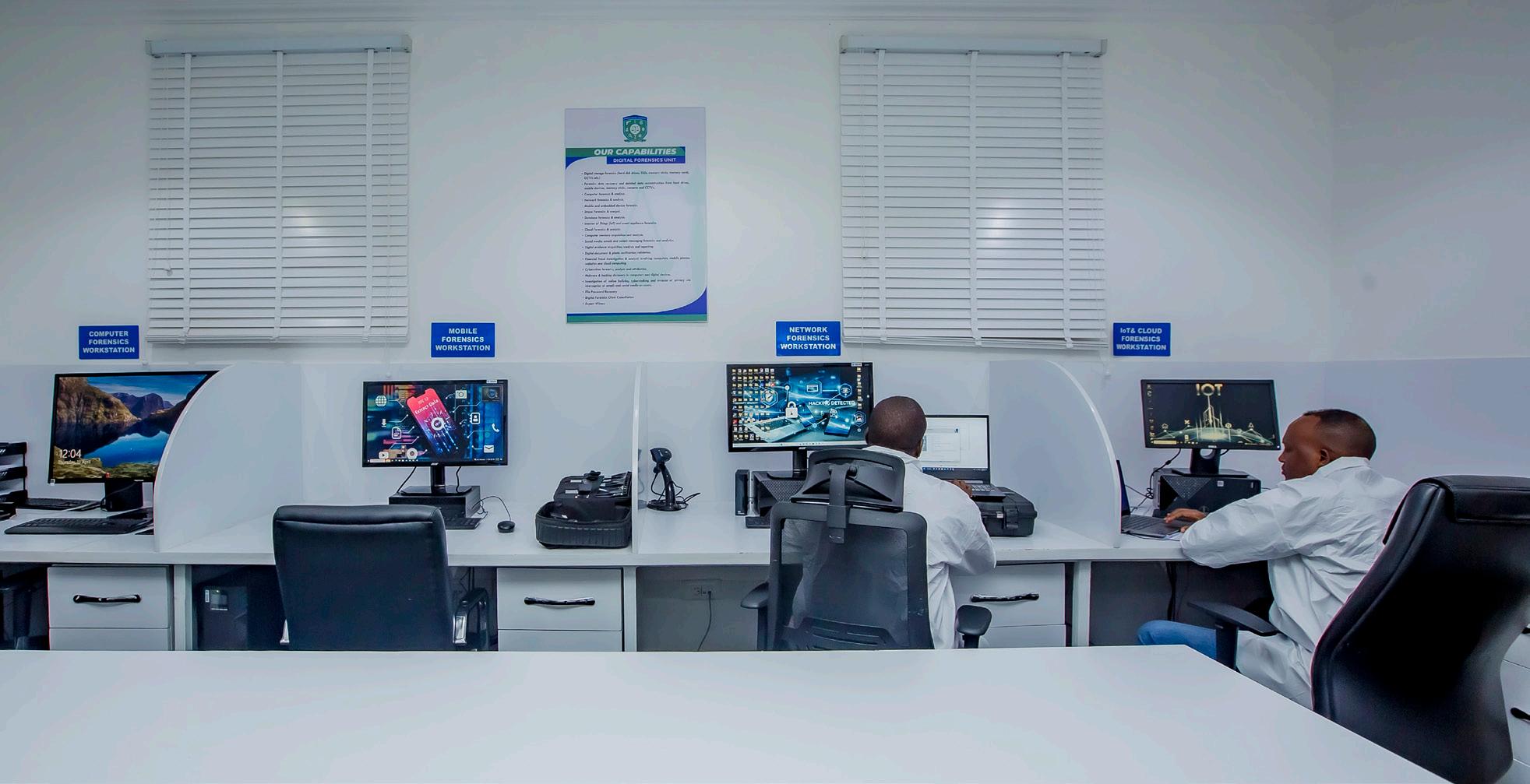
Digital forensic services refer to the use of specialized techniques and tools to collect, preserve, and analyze electronic exhibits in the context of legal investigations and proceedings.
Digital forensic services are used in a variety of legal contexts, including criminal investigations, civil litigation, and corporate investigations. Digital evidence may include data from computers, smartphones, tablets, servers, and other electronic devices, as well as data transmitted over networks or stored in the cloud.
Digital forensic services are typically carried out by forensic analysts who specialize in computer and digital forensics. These professionals use specialized software tools and techniques to recover and analyze digital evidence, such as deleted files, internet history, email, and social media activity.
Digital forensic services may be used to investigate a wide range of crimes, including cyberattacks, intellectual property theft, financial fraud, child exploitation , among others.
In addition, digital forensic services can help organizations protect against data breaches and insider threats by detecting and investigating suspicious activity on their networks.
The results of digital forensic analyses are often presented as expert testimony in court and can play a crucial role in the outcome of legal proceedings.
Digital forensic services are essential in ensuring that justice is served and that organizations are able to protect themselves against digital threats.
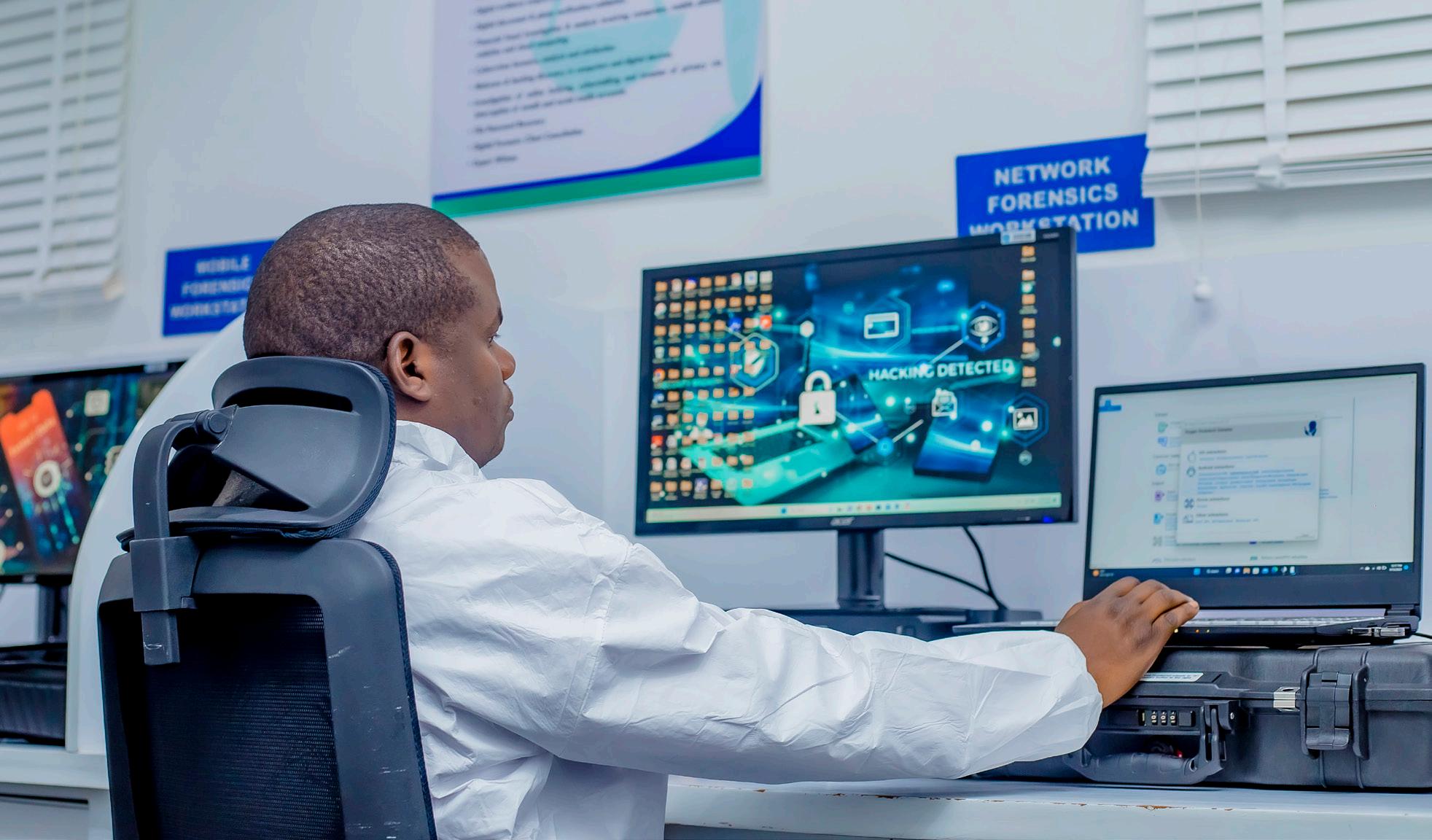
Forensic multimedia services involve the analysis and presentation of multimedia evidence in legal proceedings. It combines various fields such as forensic science, multimedia analysis, and digital forensics to examine, process, and interpret audio, video, and image evidence.
Forensic multimedia services are essential in many legal cases, including criminal investigations, civil lawsuits, and accident investigations. Multimedia evidence can be used to identify suspects, prove guilt or innocence, reconstruct events, and provide valuable information to investigators, lawyers, and judges.
Some of the tasks involved in forensic multimedia services include forensic analysis of digital media, audio and video enhancement, authentication of digital evidence, and expert witness testimony in court. Forensic multimedia experts use specialized software and techniques to extract and analyze relevant information from digital media, including metadata, timestamps, and other hidden data.
Forensic multimedia services play a crucial role in contemporary legal proceedings, helping to ensure that justice is served and that the truth is revealed through accurate and reliable evidence.
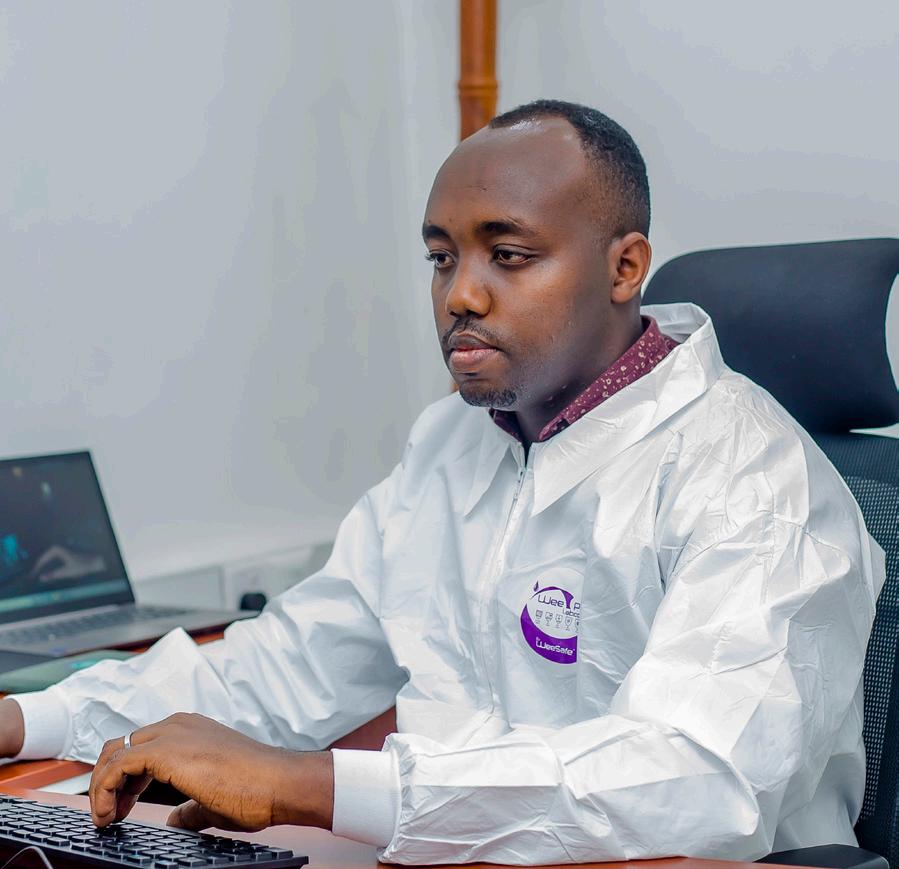
As digital crimes increase and advance in sophistication, Rwanda is also investing more efforts to remain ahead of the criminals. Digital Forensics is another unit of the Rwanda Forensic Institute that helps to analyze, inspect, identify and preserve the digital evidence residing on various types of electronic devices, like computer, mobile phone, server, or network. We had an interview with IP David Mugisha, the Director of Digital Forensics Unit and he explained not only the services they provide, but also aspirations for the future.
May you start by introducing yourself and your responsibility at Rwanda Forensic Institute?
My name is IP David Mugisha. I am the Director of the Digital Forensics Unit at Rwanda Forensic Institute. Digital forensics is among the units of RFI that deals with the process of preservation, identification, and documentation of electronic exhibits from digital devices, like a computers, and smart phones..
This unit provides the forensic expertise with the best techniques and tools to solve complicated digital-related cases. We provide digital evidence to different institutions or partners, both in public and private institutions, and individuals.
We live in an era where technology-driven crime is on the rise around the world. This therefore, leads me to ask about how qualified your staff is.
The Rwanda Forensic Institute has become known around the world for its professional work. RFI prioritizes the capacity building of its staff to prepare them for emerging crimes handling. the DF staff, is regularly trained and have amassed experience spanning at least 5 years in this field. We started learning technology from the ground up.
Many of staff member in the unit hold Master’s degrees in cyber security , Digital forensics, Multimedia forensics and other technological fields from recognized universities.
In addition, they have received various professional trainings, both in Rwanda and abroad and have international certificates in the related field technologies
You clearly have competent staff no doubt. But how are you faring in terms of equipment in the Digital Forensics unit?
In order to achieve our goal of facilitating the administration of equitable and reliable justice for Rwandans, RFI has invested in modern equipment that meets international standards. The equipment we use come from countries that have developed forensic sciences such as Israel, the United States as well as those in Europe. You realise that in such regions, they use the same tools as we do. In addition, we upgrade every year to remain relevant and avoid errors that could occur because of outdated technology.
In a nutshell, tell us about all the services you provide in the Digital Forensics unit in general?
In the Digital Forensics Unit, we offer a wide range of services including carrying out analyses of Computer Hard Disk Drive, analysis of Mobile Device, Cyber Attack/Networks, Data Analysis, Memory Devices, Social Networks , IoT forensics, Drone forensics, etc
Tell us about the Laboratory Information Management System that was introduced by RFI and how it has helped your unit deliver on its mandate.
LIMS helps us in many ways like case registration, exhibits management, lab processes and reporting in which the exhibit is maintained and tested to ensure the integrity of the exhibits. The LIMS also helps us comply with the chronology as stipulated by international standards.
What requirements are asked of clients to get your services?
• A well filled requisition form
• ID or passport
• Proof of payment of purchase order
• Physical exhibits or samples
Can you tell us about your vision for the next five years?
We want to bring the services we provide close to our beneficiaries, especially in Rwanda. We also want to cross borders, as we continue to get requests for our services from beyond the country. We will continue to improve and expand cooperation with other international laboratories, especially those in Africa.
Finally, is there anything you would like to share with our readers?
I would like to thank you for the interview and use this opportunity to encourage everyone to come for the services provided by RFI because they are reliable.
Thank you
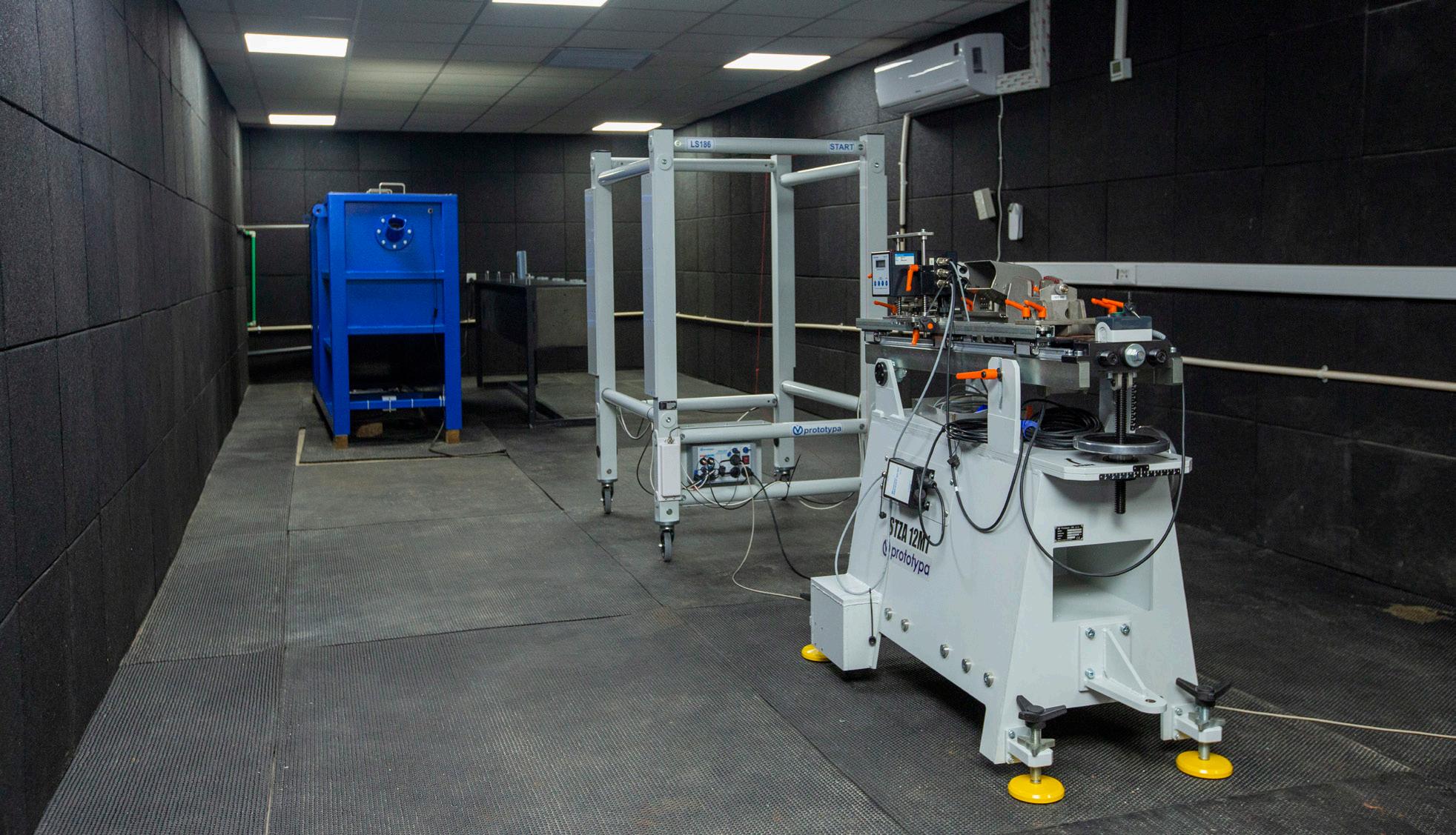
Forensic ballistics and toolmarks services refer to the examination and analysis of firearms, ammunition, and other related materials in the context of criminal investigations and legal proceedings.
These services are typically carried out by specialized forensic examiners on exhibits brought by law enforcement agencies or private individuals/organizations. These professionals use a variety of techniques to examine firearms, bullets, and cartridge cases, as well as other materials such as gunpowder residue, shotguns, and knives.
The analysis of ballistics and toolmarks can provide valuable information about the type of firearm used in a crime, the range from which the firearm was fired, and the angle of the shots.
Forensic ballistics and Toolmarks services can also help to link bullets and cartridge cases recovered from crime scenes to firearms.
Forensic examiners may also analyze toolmarks left on surfaces such as locks, safes, and doors to help identify the tools used in a crime, such as crowbars or screwdrivers, …
This analysis can provide valuable evidence for investigators, helping to identify suspects and establish a timeline of events.
Forensic examiners may also perform serial number restoration on various item types.
Such services play an important role in criminal investigations and legal proceedings, providing valuable evidence that can help to identify suspects, link crimes, and bring criminals to justice.
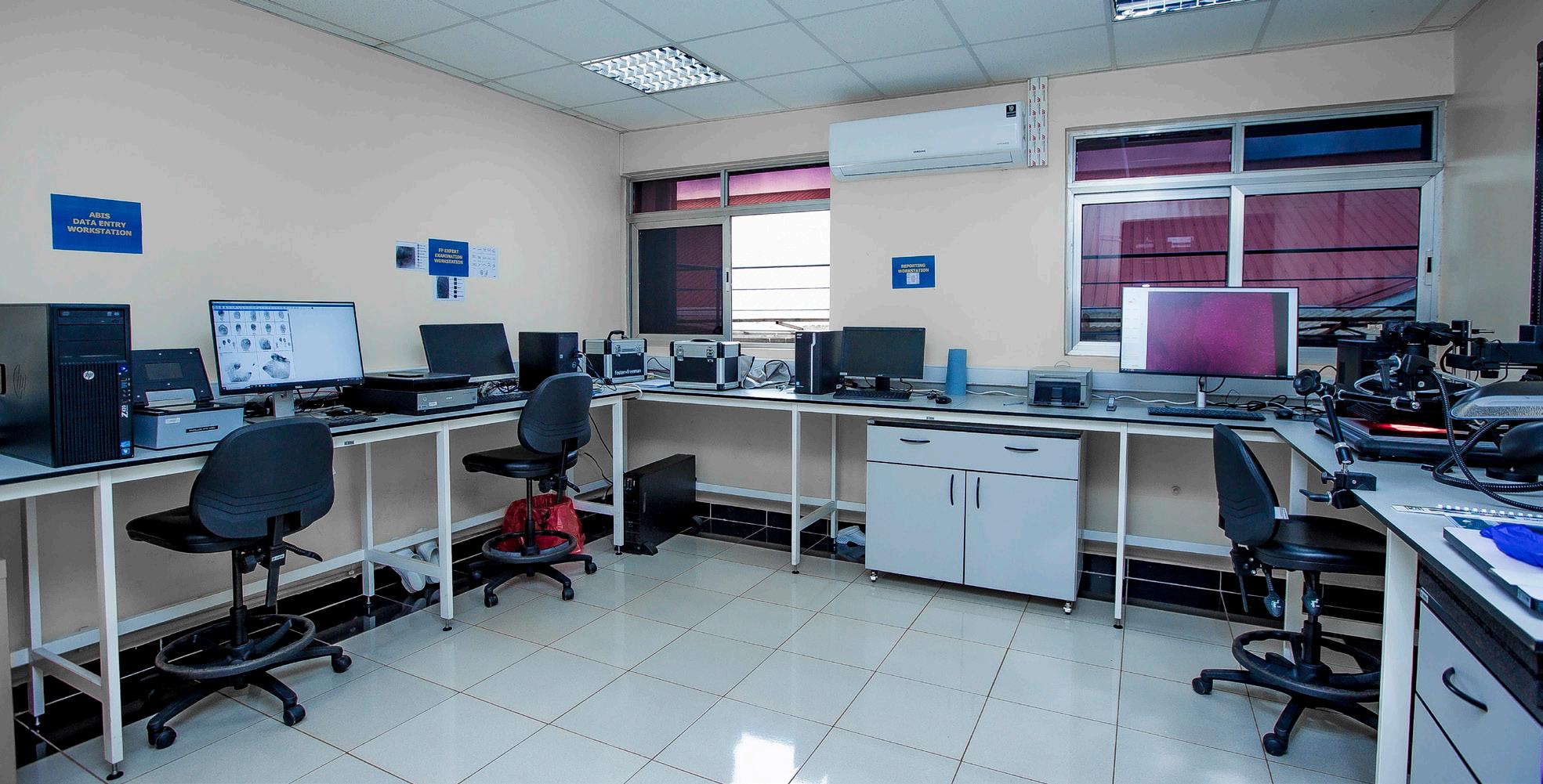
Forensic questioned document services refer to the examination and analysis of documents in the context of legal investigations and proceedings. These services are performed by specialized forensic document examiners who are trained to analyze various aspects of documents, such as handwriting, paper, ink and printing methods.
Forensic questioned document services may be used to verify the authenticity of a document, detect alterations or forgeries, and identify the author of a document. For example, forensic document examiners may compare the handwriting on a questioned document to known handwriting samples to determine if the same person wrote both documents. They may also use various analytical techniques to examine the paper and ink used in a document.
Forensic questioned document services are used in different legal contexts, including criminal investigations, civil litigation, and document authentication. They may be used in cases involving wills, contracts, bank documents, and other legal documents.
The results of forensic questioned document analyses are often presented as expert testimony in a court of law and can play a crucial role in the outcome of legal proceedings. These are essential in ensuring that legal documents are authentic and that justice is served.
Forensic fingerprint services refer to the use of specialized techniques to collect, analyze, and compare fingerprints in the context of criminal investigations and legal proceedings.
Forensic fingerprint services are typically performed by forensic fingerprint examiners, who use various techniques to collect and
analyze fingerprint exhibit. They may use powders, chemicals, or lasers to enhance fingerprints on surfaces and collect them for analysis. Once collected, the fingerprints can be compared to known fingerprints from suspects or a database to determine a match.
Fingerprint evidence can provide valuable information in criminal investigations, such as identifying suspects and linking them to crime scenes. Fingerprint evidence can also be used to exclude suspects from a case if their prints do not match with those found at the crime scene.
Forensic fingerprint services are used in a variety of legal contexts, including criminal investigations, civil litigation, and immigration cases. They may also be used in non-criminal contexts, such as background checks for employment or volunteer positions.
Forensic fingerprint services play an important role in criminal investigations and legal proceedings, providing valuable evidence that can help to identify suspects, link crimes, and bring criminals to justice.
Interview with SP Dieudonne NZASABIMANA, the Director of Questioned Documents & fingerprint
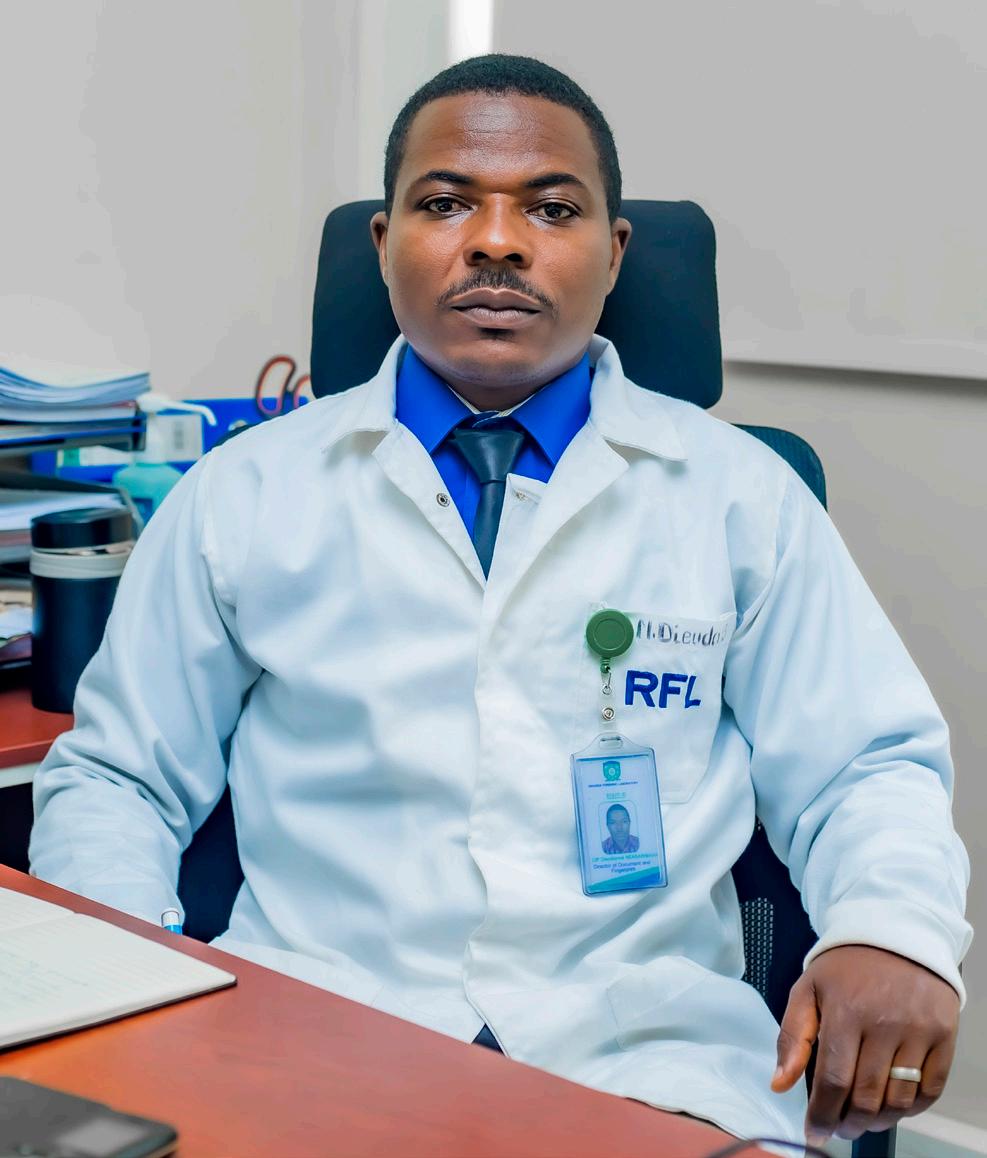
May you start by introducing yourself and the services you provide in your unit?
My name is SP Dieudonné NZASABIMANA, the Director of the Questioned Documents and Fingerprint Unit.
This unit is made of two sections; one that handles questioned documents and another one whose specialty is fingerprints.
My responsibility as the director is all about coordinating all activities of the unit. the director is also a questioned & fingerprint examiner to allow the so-called “Four Eyes” mechanism to work properly. Through this mechanism, more than two people work on a questioned document case and the director cross-check by doing a technical review.
Can you give us a little bit of insight on the services this unit offers at the Institute?
The science of Forensic Document Examination and Fingerprint is like any other discipline of applied science, and it is basically a science of comparison between known and unknown documents.
Questioned documents
One just compares the document to the legally admissible standards, reliable samples of handwriting, signatures, typewriting, computer printouts or other types of documents to determine authorship, spuriousness, any kind of forgery or altered documents. Examples include a university degree whereby the name of the owner has been deleted and replaced by another name or a ticket that was given to someone and they altered what was written on it, like date or amount, etc.
In addition, we also examine counterfeit money and forged official documents like visas, passports, IDs, driving licenses, etc issued by governmental institutions in order to determine their authenticity.
Fingerprints
Fingerprint examination is one of the oldest and most widely used forms of biometric identification in forensic science. With the advancement of technology, fingerprint analysis has become more accurate and efficient.
In the fingerprint section, we recover, enhance fingerprints from exhibit, examine fingerprints ridges or friction from crime scenes and compare the fingerprints with those of suspects and issue expert report.
Friction ridge impression examinations are conducted by qualified experts, using the Analysis, Comparison, Evaluation, and
Verification (ACE-V) methodology, which include both qualitative and quantitative aspects.
Can you tell us about the capability of the unit you are heading?
Although Rwanda Forensic Laboratory itself started operations in 2018, in Rwanda, forensic services started back in 2005. Since then, there have been capacity building programs for employees who were working in the former Kigali Forensic Laboratory up to now.
In this regard, staff acquired academic and professional trainings from forensics laboratories and universities or higher learning institutes around the world (Algeria, UK, USA/FBI, Germany, India, Mauritius, Russia and Sudan, etc.
For equipment, we use the latest technology available on the market. In addition, we use the Laboratory Information Management System that helps us to coordinate our activities.
What are your projections for the next five years?
Regarding our plans for the future, our unit shares the same aspirations with the overall institution, which to position ourselves to become competitive on international level, as well as making our facility a center of excellence in this region.
Actions to be embarked on to achieve this include;
• Upgrading the Current RFI Automated Biometric Identification System (ABIS) into a Centralized and Harmonized Criminal ABIS for all law enforcement agencies (RFI, RIB, RCS, etc);
• Accrediting all laboratory units,
• Establishing a Center of Excellence for training at regional and continental levels;
• Assisting our stakeholders, for instance strengthening forensic services at airports and border posts.
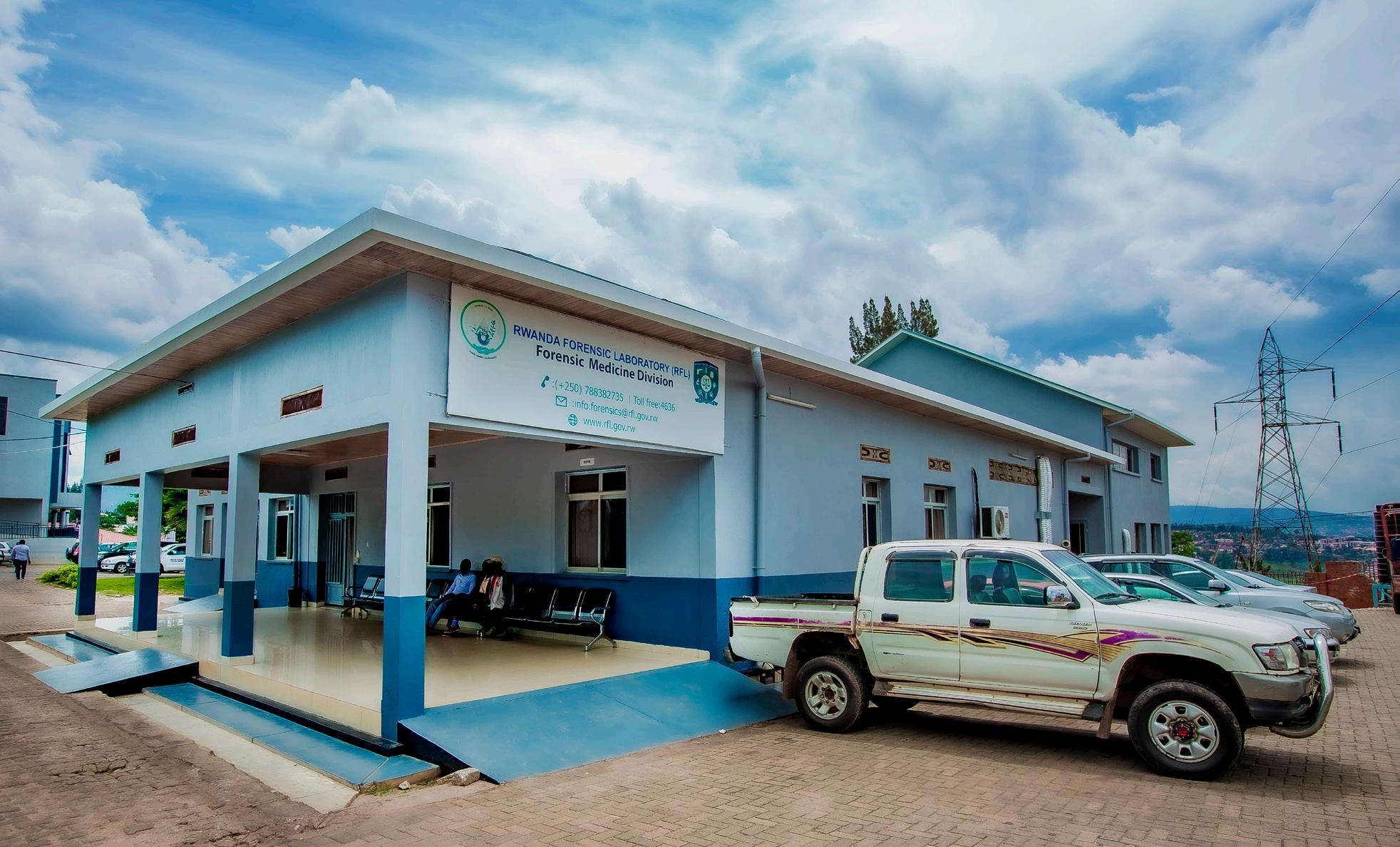
Forensic medicine services refer to the use of medical expertise to investigate and analyze cases related to legal and criminal matters. These services are performed by forensic medical professionals who are typically physicians with specialized training in forensic medicine.
Forensic medicine services may be used in criminal investigations, civil litigation, and in cases of accidents. Forensic medical professionals may examine victims of crimes, perform autopsies, and provide medical testimony in legal proceedings.
Such services help to determine the cause and manner of death in cases where it is unclear or suspicious death. Forensic medical professionals may also be involved in cases related to physical assault or abuse, where they examine injuries
and provide medical expert testimony on the likely cause and timing of the injuries.
In addition to examining physical injuries and conducting autopsies, forensic medical professionals may also analyze medical records, drug tests, and other medical data to assist in legal investigations. They may also provide expertise in cases involving mental health issues or substance abuse.
Forensic medicine services involve the application of medical knowledge and techniques to investigate deaths and injuries in legal cases. Forensic doctors are specially trained medical doctors who use their knowledge of general medicine, such as anatomy, physiology, and pathology to determine the cause and manner of death in cases that may involve criminal activity, accidents, or natural causes.
Forensic doctors may perform autopsies, which involve a detailed examination of the body to identify injuries, disease, or other conditions that may have contributed to the person’s death. They may also collect and analyze tissue samples, fluids, and other materials for further analysis.
In addition to determining the cause and manner of death, forensic doctors can provide expert testimonies in legal proceedings, by helping judges to understand the severity of injuries or medical terms and significance of autopsy findings. They may also be consulted by law enforcement agencies, coroners, and other investigators to help with the investigation and reconstruction of events surrounding a death.
Forensic medical services are crucial in many legal cases, including criminal investigations, civil lawsuits, and insurance claims. They provide valuable information that can be used to establish liability, prove guilt or innocence, and ensure that justice is served.
The service plays a critical role in the legal system, helping to ensure that death and injuries are properly investigated and legal proceedings are fair, objective, and based on accurate and reliable evidence.
An interview with Dr. Innocent NKURUNZIZA, the Division Manager, Forensic Medicine
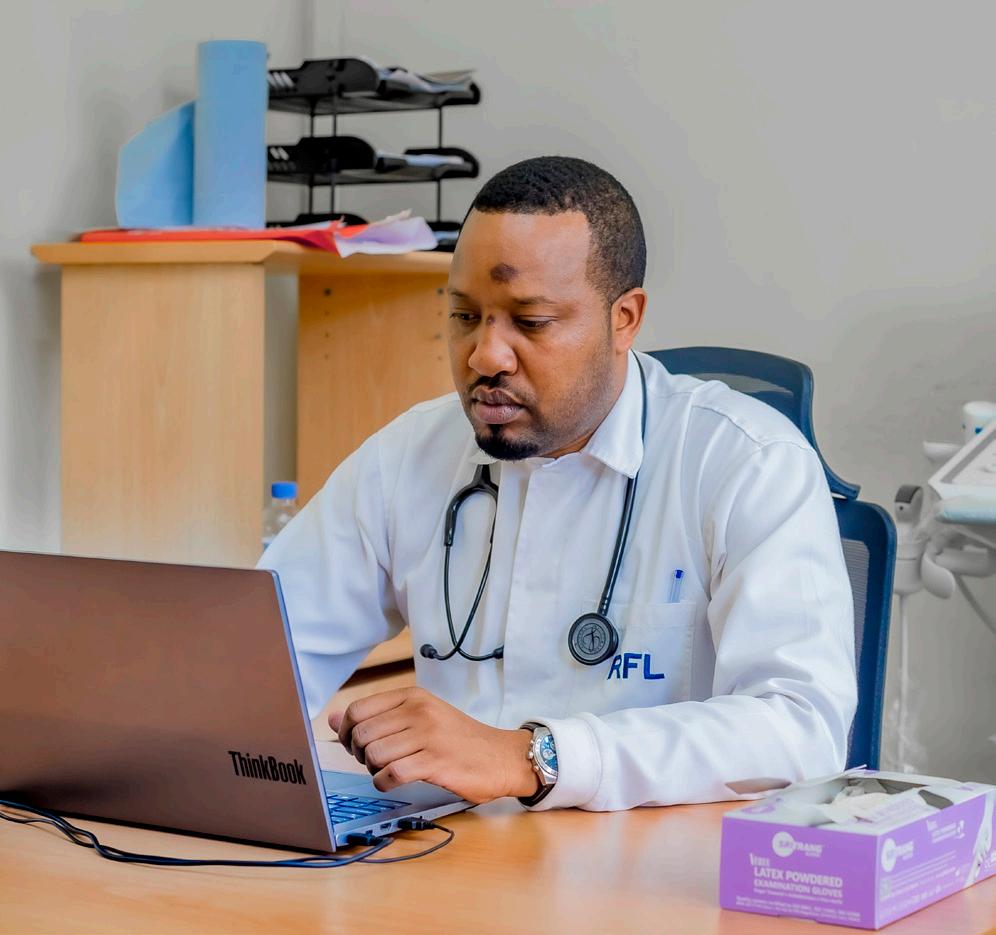
In an interview with Dr. Innocent Nkurunziza, the division manager of Forensic Medicine, he highlighted the scope of their services.
May you start by introducing yourself and the services you provide in your division?
My name is Dr. Innocent NKURUNZIZA, the forensic Medicine Division Manager
The Forensic Medicine Division has two units: Clinical Medicine and Pathology which plays a great role at the Rwanda Forensic Institute. Forensic Doctors examine physical assault cases, provide medical expertise by determining the level of incapacity and severity of the pain to facilitate the provision of justice, and determining the cause of death. we also provide various documents such as death certificates, etc
May you tell us about the capability of the division you are heading?
First of all the equipment we use complies with international standards and the latest on the world market. We procure our equipment from globally-recognized companies.
The advanced equipment gives us the capability to handle complex cases, for instance there could be a pregnant woman who may be a victim of physical assault and appears in consultation room without physical harm sings on body inspection while harms are internally or the fetus may be injured, so our equipment allows us to diagnose such cases.
In addition, our staff have received various trainings both in Rwanda and abroad to remain abreast with the latest technology. For instance, they have been trainedby various internationally recognized forensic institutes.
May you tell us other laboratory divisions that help forensic medicine in daily activities?
Basically, there are different services delivered in our division. There is autopsy/ post-mortem which is a specialized surgical procedure used to determine the cause and manner of death, the chemistry and drug division services help analyze samples taken during postmortem examinations in order to find the cause of death, mostly in poisonous, intoxication and alcoholism, so
chem-drug services reveal those intoxication more easily. And also Ballistics unit which helps in determining gunshot range and the type of the gun weapon that shot.
Another service offered is DNA profiling tests where we collect DNA samples from the deceased and match it up with relatives to the deceased, when the need arises. This can happen for instance when a disagreement around children sired by the deceased such samples help in establishing the facts. We provide many services in our laboratories not only chem & drug division, there is also the micro-biology division that help our daily work.
What plans do you have for the next five years to come as a division?
When I look at the projects we have in the pipeline, I believe we will be far. We intend to add more units for instance forensic psychology, which help offering counseling services to those that will be have lost their relatives. We shall also continue to build our workforce both in terms of numbers and boosting their capacity to deal with emerging crimes and other trends.
In five years to come, forensic medicine has clear projection of upgrading its services with a wellequipped department, which will be established into different units like histopathology, odontology, anthropology and archeology. Furthermore, this division will continue to align with future projects of RFI with the general ambition of providing quality forensic services not just in the country, but also in the region .
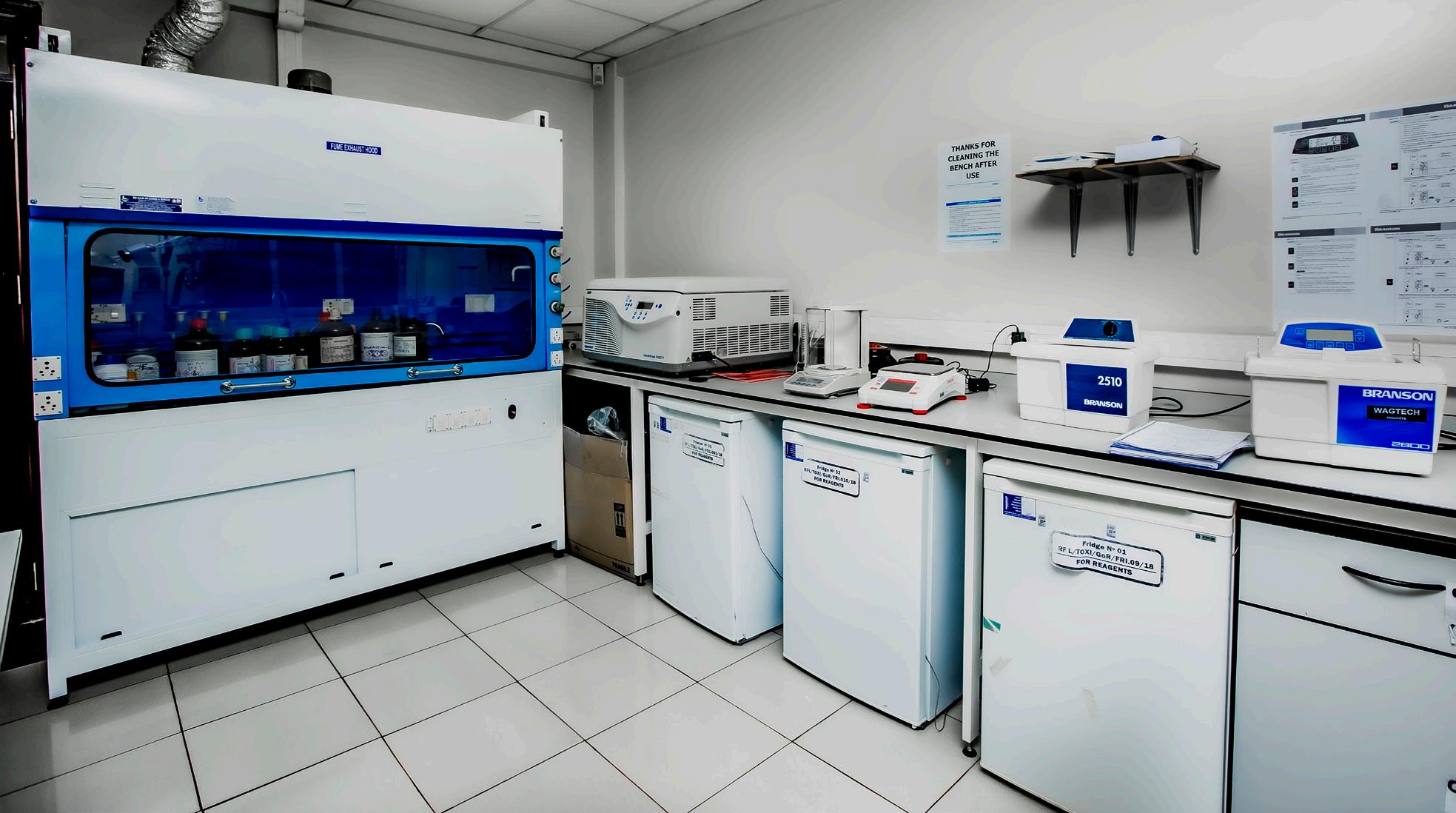
Forensic quality assurance (QA) refers to the systematic and ongoing process of monitoring, evaluating, and improving the quality of forensic science services. The goal of Forensic QA is to ensure that forensic science services are reliable, accurate, and scientifically valid, and that they meet accepted standards of quality and ethical conduct.
Forensic QA encompasses a range of activities, including:
Quality control: This involves measures taken during the forensic analysis process to ensure that the results are accurate and reliable. This can include the use of controls, calibration, and validation of methods and equipment.
Quality assurance: This involves continuous monitoring and evaluation of the overall quality of forensic science services, including laboratory analyses, expert testimony, and other forensic activities. This can include regular audits, performance evaluations, and peer review.
Training and education: Forensic QA also involves ensuring that forensic science service providers have the necessary training, education, and experience to perform their work competently and ethically.
Standard operating procedures: Forensic QA involves developing and implementing standard operating procedures (SOPs) that are consistent with recognized standards of quality and ethical conduct.
Continuous improvement: Forensic QA involves ongoing efforts to identify areas for improvement and implement changes to enhance the quality and effectiveness of forensic science services.
Forensic QA is an essential component of ensuring the reliability and accuracy of forensic science services. It helps to maintain public trust in the criminal justice system and promotes justice and fairness by ensuring that evidence is analyzed and presented in a scientifically valid and ethical manner.
Forensic quality assurance works under principles which are technically called quality indicators which are measures used to evaluate the quality of forensic science services, including laboratory analyses, expert testimony, and other forensic activities. These indicators help to ensure that forensic science services are reliable, accurate, and scientifically valid, and that they meet accepted standards of quality and ethical conduct.
Some common examples of forensic quality indicators include:
Accreditation: Forensic laboratories and other facilities can be accredited by recognized bodies, to indicate that they have demonstrated compliance with established quality standards.
Proficiency testing: Forensic laboratories can participate in proficiency testing programs, which provide independent assessment of their ability to produce accurate and reliable results.
Error rates: Forensic science service providers can track error rates and implement corrective actions to reduce the occurrence of errors.
Validation studies: Forensic science service providers can also conduct validation studies to demonstrate the reliability and accuracy of their methods and procedures.
Peer review: Forensic science service providers can undergo peer review, in which experts in the field evaluate their work and provide feedback.
Evidence tracking: Forensic science service providers can implement systems to track the handling and storage of evidence, ensuring that evidence is not lost, contaminated, or mishandled.
Chain of custody: Forensic science service providers can maintain strict chain of custody procedures, documenting the movement of evidence from the time it is collected to the time it is presented in court.
Forensic quality indicators help to ensure that forensic science services are of high quality, reliable, and scientifically valid, and that they meet accepted standards of quality and ethical conduct. They are an important tool for maintaining public trust in the criminal justice system and promoting justice and fairness.
Generally, RFI is a great milestone for Rwandan justice sector, that helps the justice system to have scientific evidence which then facilitates a fair judicial process.
In addition to the justice, the RFI has also come to be regarded as a solution to the growing number of crimes in Rwanda and the region, including sexual violence, cybercrime and more. Therefore, RFI provides more help to the community fighting against these crimes.
Forensic expertise and testimony services involve the provision of expert opinions and testimony in legal proceedings. Forensic experts are professionals with specialized knowledge and training in a particular field, such as forensic psychology, digital forensics, forensic accounting, or forensic science.
Forensic experts can provide valuable insights and opinions based on their training and experience, and their testimony can be crucial in many legal cases, including criminal trials, civil lawsuits, and administrative hearings. Their role is to provide objective, evidence-based opinions to help judges and juries understand complex issues and make informed decisions.
Forensic experts may be called upon to examine evidence, conduct tests and experiments, and provide opinions on the significance of the findings. They may also provide opinions on the reliability and validity of evidence, assess the credibility of witnesses, and provide analysis and interpretation of complex data.
In addition to providing expert testimony in court, forensic experts may also provide consulting services to lawyers, law enforcement agencies, and other organizations. They can be asked to assist in investigations, provide guidance on legal strategy, or conduct research and analysis to support legal arguments.
Overall, forensic expertise and testimony services are critical in ensuring that justice is served and that legal proceedings are fair, objective, and based on accurate and reliable evidence.
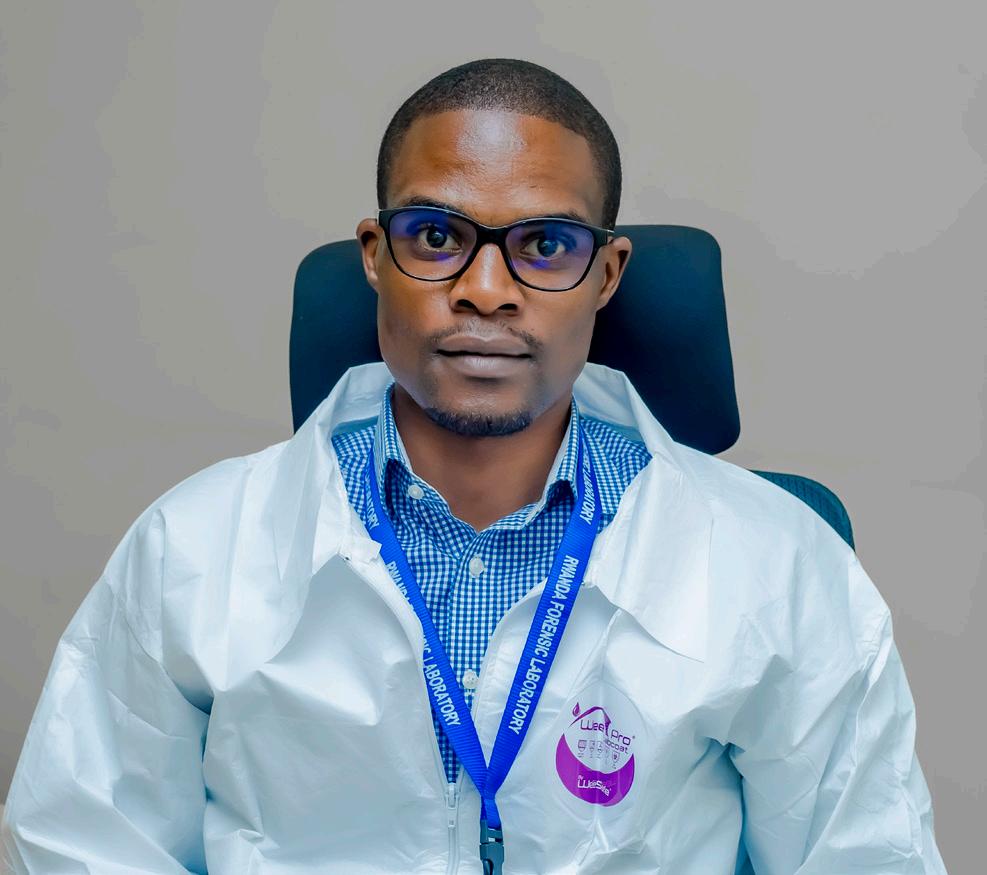
May you start by introducing yourself, and describe your unit?
My name is David Irasubiza, the Quality Assurance Specialist of Rwanda Forensic Institute (RFI).
RFI quality assurance is a specialized unit responsible for overseeing and managing quality assurance programs in RFI laboratories. The primary objective of this unity is to ensure that Rwanda Forensic Institute services are of the highest quality and are consistent with national and international standards.
The RFI quality assurance unit performs a wide range of functions, including:
Developing and implementing quality assurance policies and procedures: The unit develops and implements quality assurance policies and procedures that govern the operation of our laboratory, including guidelines for testing and analysis, equipment calibration, and staff training.
Conducting quality assessments: The unit conducts regular quality assessments of the laboratories to ensure compliance with established quality standards and procedures.
Providing training and technical support: The unit provides training and technical support to RFI staff to help them improve their skills and knowledge and ensure that they are following best practices and procedures.
Facilitating proficiency testing: The unit coordinates proficiency testing programs to ensure that technical staff is proficient in performing specific tests and analyses and that their results are accurate and reliable.
Conducting audits: The unit conducts regular audits of forensic laboratory systems, processes, and procedures to identify areas for improvement and ensure that quality standards are met.
Accreditation: The unit is also responsible for accreditation of our laboratories, ensuring that they meet national and international standards and adhere to best practices.
• The Rwanda Forensic Institute quality assurance unit uses quality tools in its daily functions, including:
Control charts: These are graphical representations of data that are used to monitor the performance of laboratory instruments and processes over time. Control charts help to identify trends, patterns, and anomalies in data and can be used to identify potential issues before they become significant problems.
Root cause analysis: This is a systematic approach to identifying the underlying causes of problems or errors in laboratory processes. It involves analyzing data and conducting investigations to identify the root cause of the problem and develop solutions to prevent it from recurring.
Standard operating procedures (SOPs): SOPs are detailed, step-by-step instructions that describe how to perform a specific laboratory task. They help to ensure consistency and accuracy in laboratory processes and reduce the risk of errors.
Quality control (QC) samples: These are samples of known composition and properties that are used to assess the accuracy and precision of laboratory analyses. QC samples are analyzed along with unknown samples to ensure that the results are accurate and reliable.
Internal audits: These are reviews of laboratory processes and procedures to ensure compliance with quality standards and SOPs. Internal audits help to identify areas for improvement and ensure that laboratory processes are effective and efficient.
By using quality tools, analysts can improve the accuracy and reliability of their analyses, reduce errors and variability.
The Rwanda Forensic Institute quality assurance unit plays a critical role in ensuring that forensic laboratory services are accurate, reliable, and defensible in court. It helps to maintain public confidence in the criminal justice system by making sure that forensic evidence is collected, analyzed, and presented in a scientifically sound and legally admissible manner.
Can you tell us your vision for the next 5 to 10 years?
A 5 to 10-year quality assurance projection for thie Rwanda Forensic Institute is challenging to predict with certainty, as it depends on various factors such as technological advancements, changes in regulatory requirements, and developments in the criminal justice system. However, based on current trends, some possible quality assurance projections in Rwanda Forensic Institute over the next 5 to 10 years include:
We are likely to see an increase in automation in various laboratory processes, including sample preparation, analysis, and data interpretation. This will help to reduce errors, improve consistency, and increase efficiency.
The use of digital evidence in criminal investigations is expected to continue on an upward trajectory, and Rwanda Forensic Institute will need to develop new techniques and tools to analyze digital evidence. This will require new quality assurance protocols and procedures to ensure the accuracy and reliability of digital evidence analysis.
Proficiency testing is likely to become more critical in Rwanda Forensic Institute as regulatory requirements become more stringent. We will need to ensure that the staff is proficient in performing specific tests and analyses and that their results are ac- curate and reliable.
Rwanda Forensic Institute will continue to adopt new technologies, such as next-generation sequencing, to improve the accuracy and sensitivity of analyses. This will require the development of new quality assurance protocols and procedures to ensure the validity and reliability of these technologies.
Rwanda Forensic Institute is likely to collaborate more closely with other laboratories and organizations, such as law enforcement agencies and academic institutions, to share knowledge and resources and improve the quality of analyses.
The next 5 to 10 years’ projection is likely to see significant changes in forensic laboratory quality assurance practices, as we continue to adopt new technologies, expand their capabilities, and respond to changing regulatory requirements and criminal justice needs.
Thank you very much!
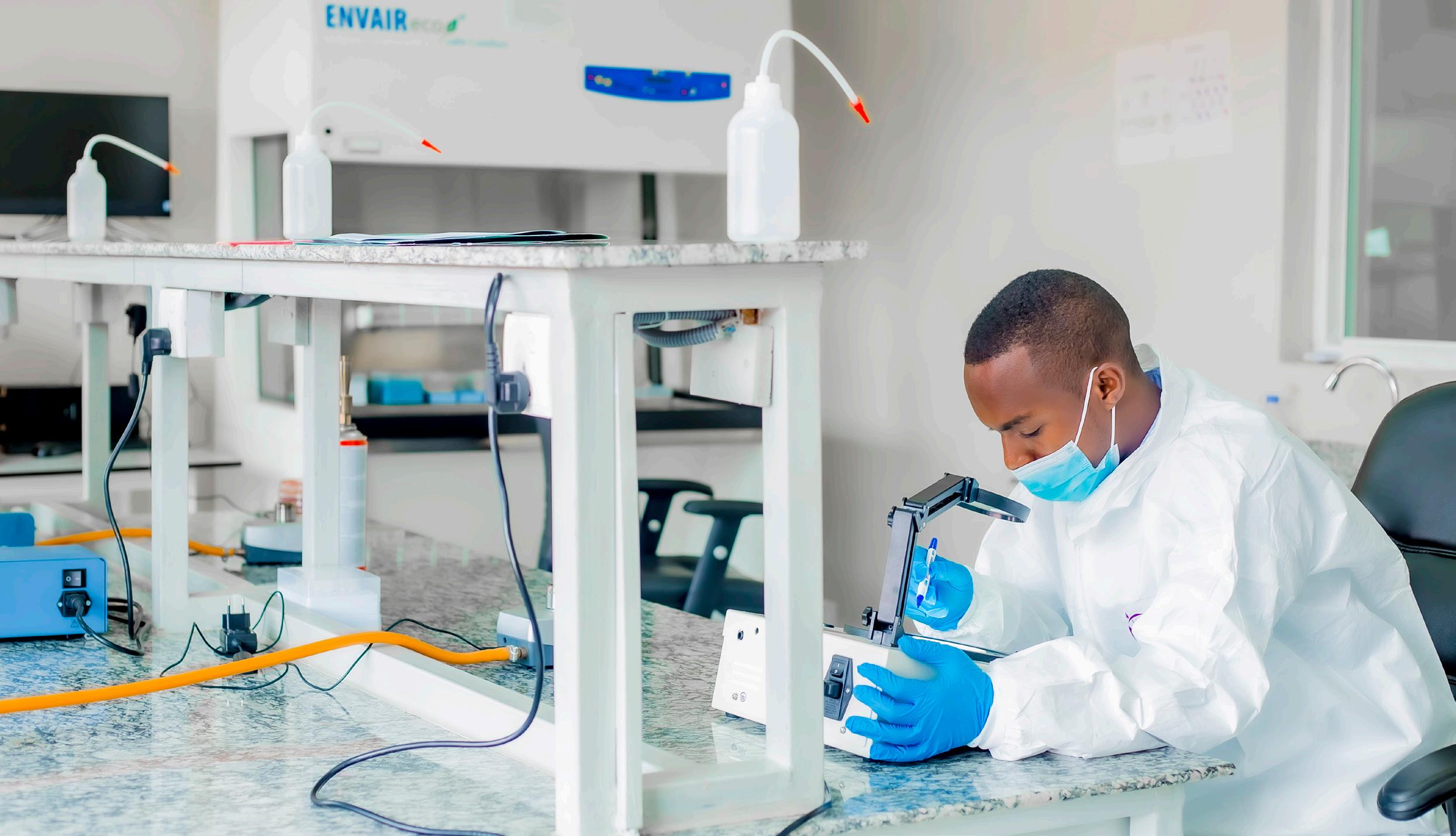
RFI had got tremendous achievements Since its start in 2018.
• Since 2018 to end July 2023, RFI has received and handled more than 37,000 cases with majority of criminal cases, private cases, civil cases from inside and outside the country.
• RFI has active partnerships with various institutions both in Rwanda and abroad. Locally, RFI works with the justice sector institutions among of which RIB, Judiciary, the Attorney General’s Office, courts, Rwanda National Police, RCS, RLRC, Legal Aid Forum, Rwanda Bar Association, Lawyers of Hope, GMO, MIGEPROF, MINUBUMWE, Districts and others.
• At the international level RFI has partnerships with key institutions including the Netherlands Forensic Institute
NFI, National Forensic Sciences University, India(NFSU),
• Hamburg University of Legal Medicine, Germany, Argentina Forensic Anthropology, ICRC, EU, etc…
• RFI has contributed towards monitoring, testing and inspection of food during the Commonwealth Heads of Government Meeting (CHOGM 2022).
• RFI has been awarded to be the host of ASFM 2023 International conference
• RFI has been awarded to be the host of African Forensic Sciences Academy (AFSA) headquarters
• RFI has conducted a country wide awareness campaign both for leaders and citizens.






RFI has organized a vibrant national campaign that reached the whole country to raise awareness of forensic services to both leaders and citizens.
The campaign started in August 2022 and concluded in December 2022.It was an intensive three months’ campaign.
This campaign reached 2000 local leaders and an estimated number of citizens is more than 1,000,000 people.
This campaign that took place in 19 districts of all four provinces and the City of Kigali, during 90 days, it brought together public, private, and other institutions and general public. Presentations, messages, and interactions were the package of the campaign.
Dr. Charles Karangwa, Director General of Rwanda Forensic Institution said that this campaign has given ‘real results’ based on
the fact that the number of people who go to their services has increased.
The campaign became a vibrant platform of raising awareness to both leaders and citizens and as a result clients started to come for services in a big number than before and leaders brought their teams to RFI to explore the potentials of the country and the institution in forensic investigations. RFI has now registered more than 37000 cases and 45 delegations from both public and private institutions.
Not only local visitors but also institutions from embassies, international NGOs and forensic institutions. Nineteen ambassadors of African countries and their Dean – the Ambassador of Israel to Rwanda, the Minister of Justice of Mozambique, delegations from Mali, Sao Tome and Principe, the EU, Botswana, Niger, Nigeria, Morocco, etc…
MENYA RFI campaign increased the visibility of the institution and its services.

Every year, the Rwanda Forensic Institute participates in at least two exhibitions to raise awareness of its services.
Since its inauguration, the RFI has attended more than 10 exhibitions, including national and international exhibitions such as Made in Rwanda, Kigali International Trade Fair Expo, ASFM EXPO, KIGALI SHOPPING FESTIVAL, ACI EXPO, etc
The objective of participating in exhibitions is to reach out to people who are attending, so that they get informed of RFI’s.
It is estimated that RFI’s stand at the International Trade Fair was visited by 550,000 people. We also reached out to 4,500 people at various conferences.
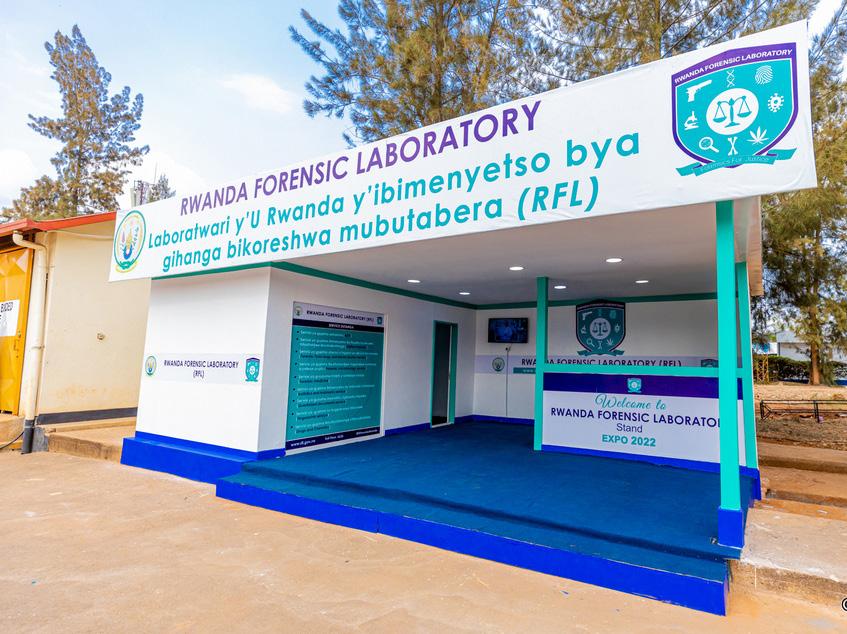
Rwanda Forensic Institute is known to be among the best institutions to welcome visitors. We welcome many visitors, both from around the country and from around the world.
The reason we have established a good hospitality culture is because we know for sure that guests who appreciate the services they received will want to return and share the information they have with their friends. This allows for more visitors and more customers for your services.
Some of the in-country guests we host include ordinary citizens, entrepreneurs, from various government, private and other sectors. We would not be exaggerating when we say that we welcome many guests. Example: On January 13, 2023, the Director General of Rwanda Forensic Institute, Dr. Karangwa Charles hosted tycoon Dr. Sina Gerard to discuss how to improve cooperation in general and specifically at the 10th African Society of Forensic Medicine International Conference.
The Rwanda Forensic Institute also hosted the members of the committee on foreign relations, cooperation and security in the Legislative Assembly of Rwanda. This group of deputies praised its performance.
On Thursday, March 3, 2022, the Rwanda Forensic Institute hosted the 20 finalists of the Miss Rwanda 2022 competition. The visit was aimed at better understanding the services provided by RFI as well as continuing to carry out various campaigns for these services through Miss Rwanda.
These are not the only guests that Rwanda Forensic Institute has received because on October 6, 2021, it received the Minister of Justice and the Ambassador of the State Dr. Emmanuel Ugirashebuja in the program of visiting the justice institutions and understanding their functioning and identifying the challenges that remain in these institutions.
Rwanda Forensic Institute welcomes many visitors from the country including its clients, partners and others. Among the agencies we can mention Rwanda Investigation Bureau (RIB), Rwanda National Police (RNP), National Public Prosecution Authority (NPPA), Rwanda Correctional Services (RCS), Rwanda Defense Force (RDF), National Identification Agency (NIDA), Courts, Private institutions, individual customers, etc.
Among the partners Rwanda Forensic Laboratory welcomes are Legal Aid Forum (Support vulnerable victims), HAGURUKA (Specific to female victims), Lawyers of Hope (Support vulnerable), Media Houses (Awareness Programs), etc.
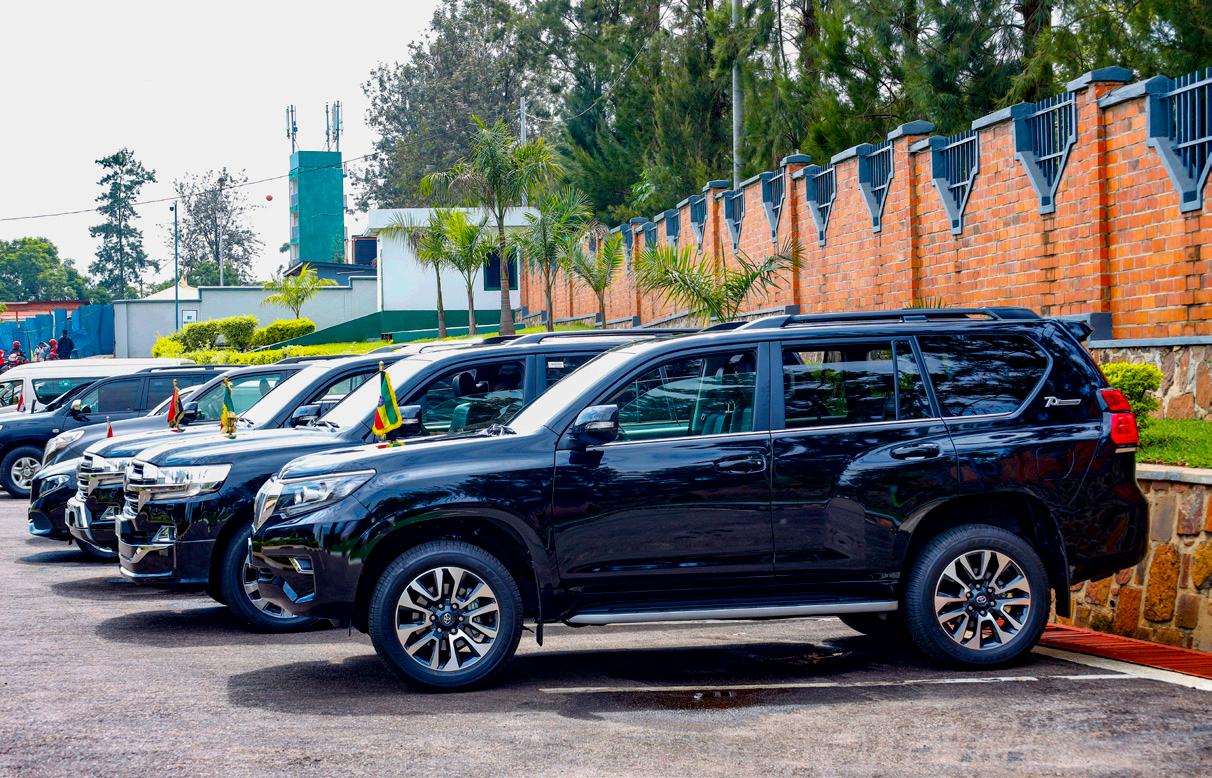
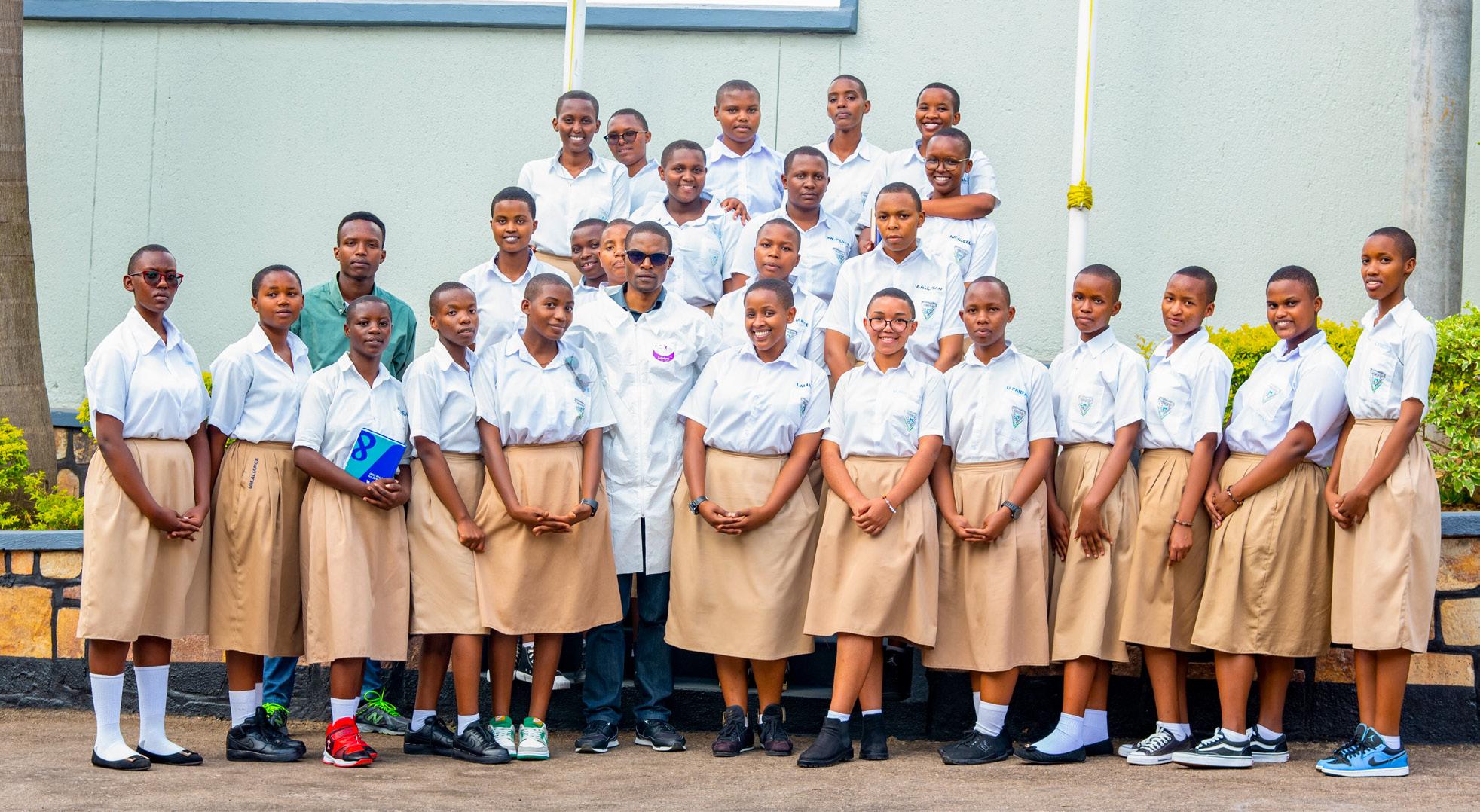
Science students from E.S Marie Reine Rwamagana conducted a study visit to the RFI. They toured RFI laboratories to explore scientific knowledge experiments. The visit was in line with empowering science students from both universities and high schools.
The visit took place on May 24,2023 at RFI premises. The aim of the visit was to explore practical knowledge of the science used for forensic investigations.
David Irasubiza, RFI’s Quality Assurance Specialist presented to the students a brief summary of RFL’s work (later became RFI).
The students appreciated the opportunity to visit RFI’s laboratories and committed to use the knowledge to improve the future of science in Rwanda.
A delegation of Rwanda Bar Association visited RFI
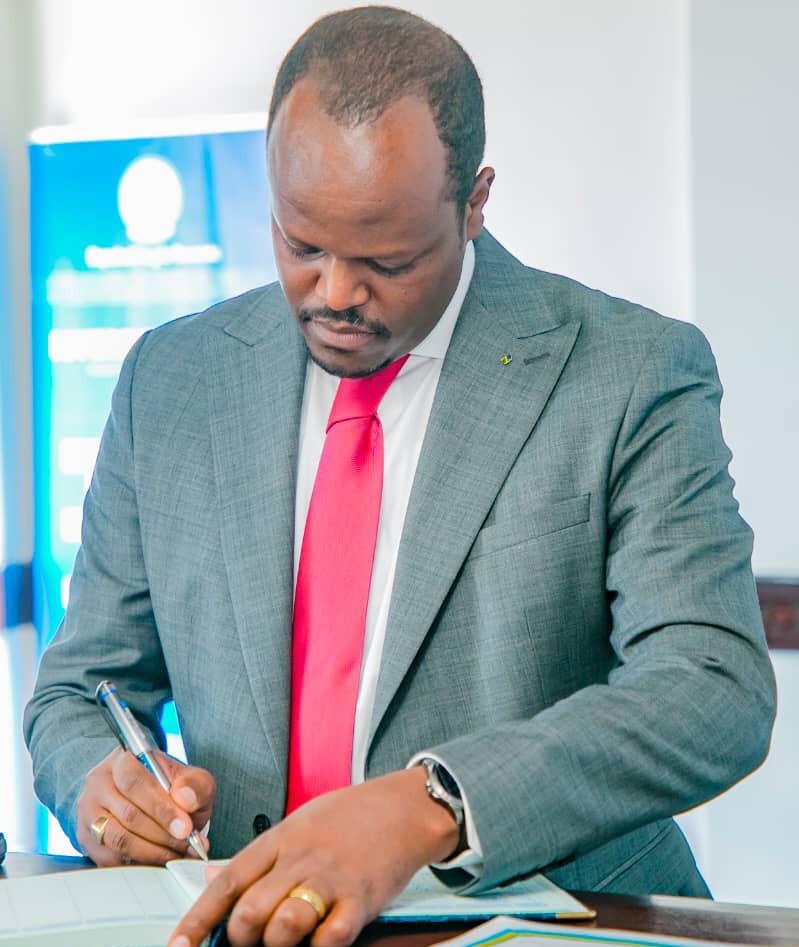
On Tuesday May 16, 2023, members of Rwanda Bar Association’s governing council, led by their president Me. Moïse Nkundabarashi, visited RFI.
The visit was in line with strengthening collaborations between the two institutions in fostering evidence based justice practice through forensic services.
The delegation was warmly welcome by the Director General Dr. Charles Karangwa, who commended their initiative to visit RFI.
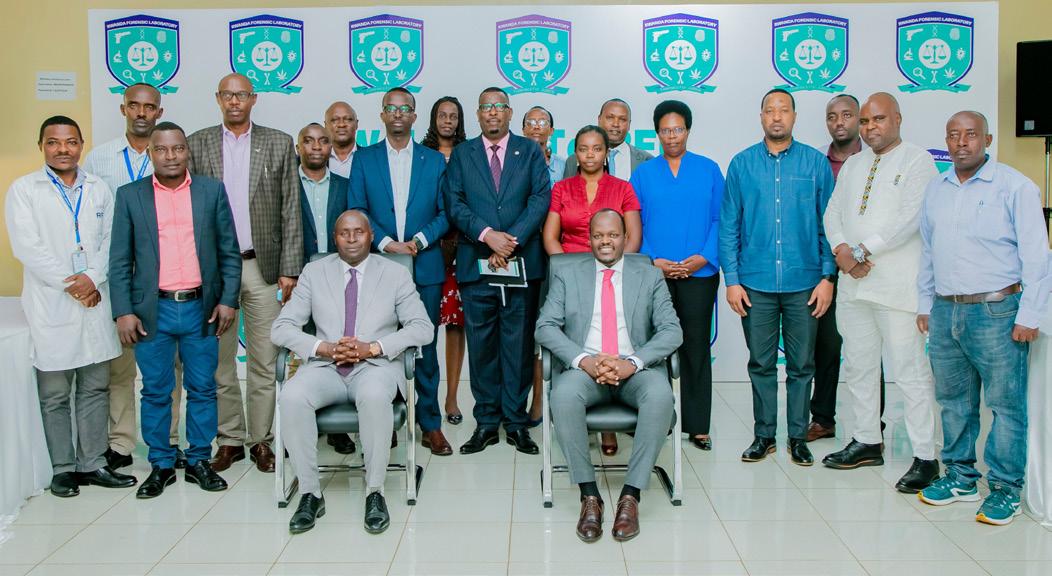
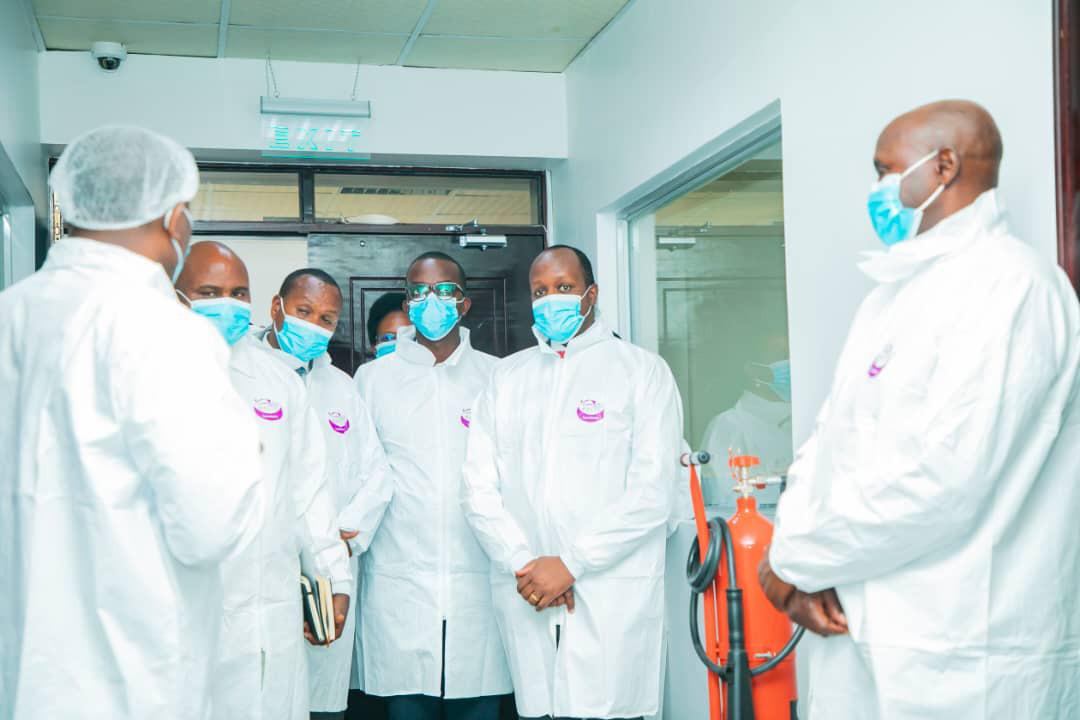
Me. Nkundabarashi appreciated the services offered by RFI and recommended a sustainable collaboration between two institutions for better justice service delivery.
The bar association members took advantage of the opportunity to ask questions about forensic services in addition to touring the institute’s laboratories and other departments.
NPPA paid a courtesy visit to RFI
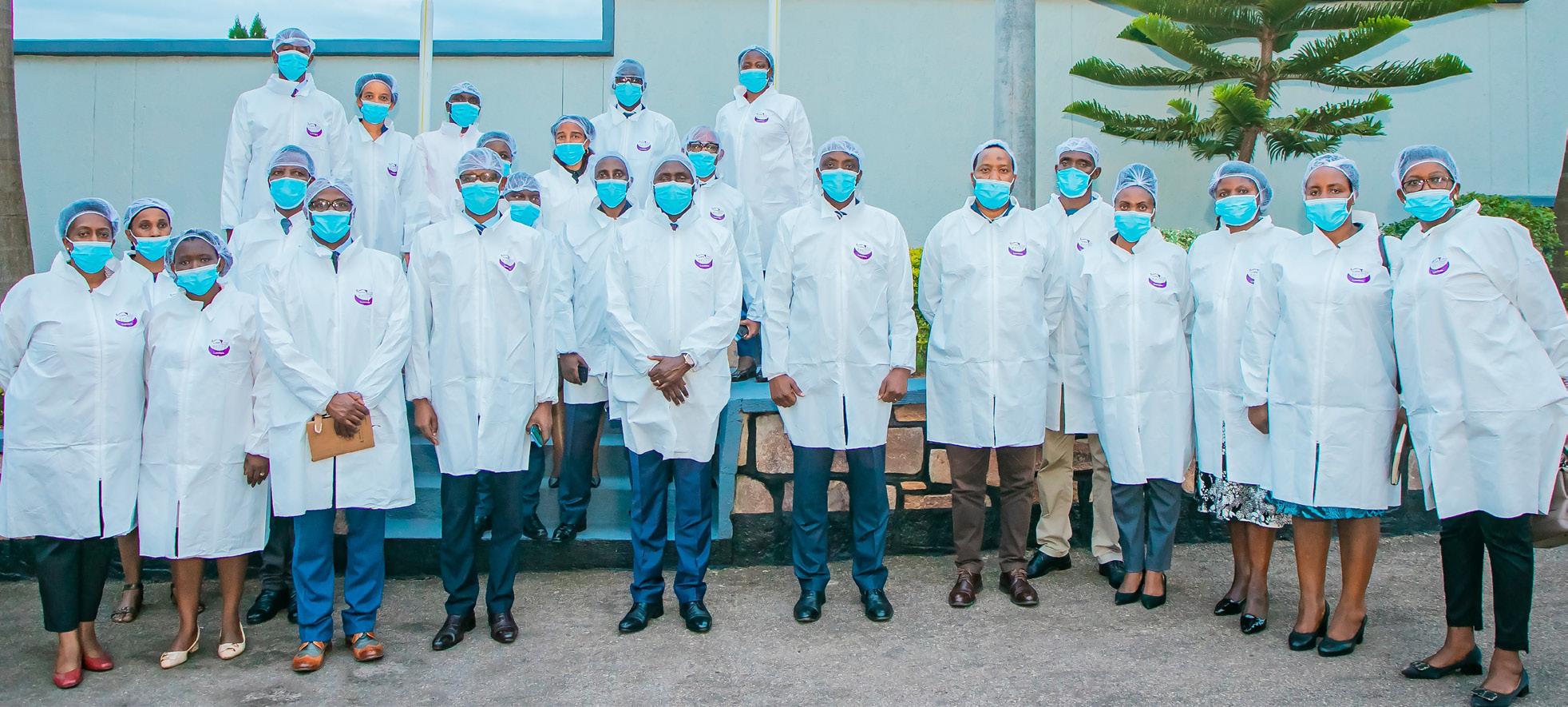
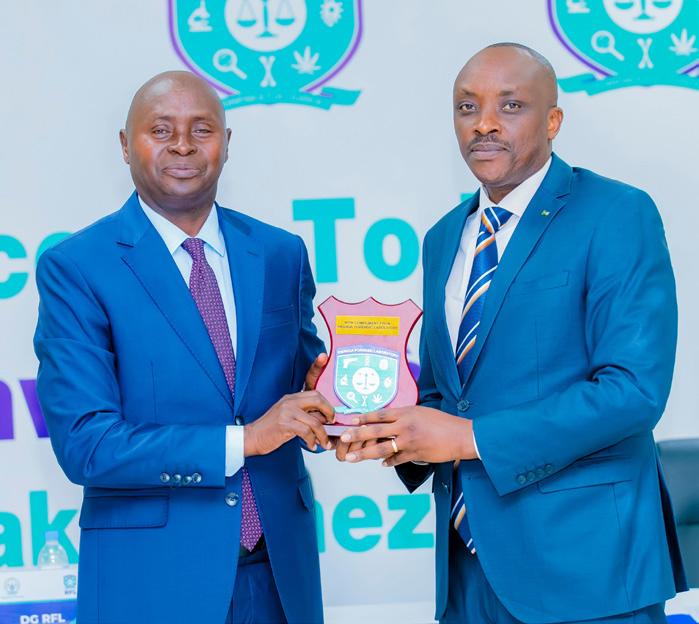
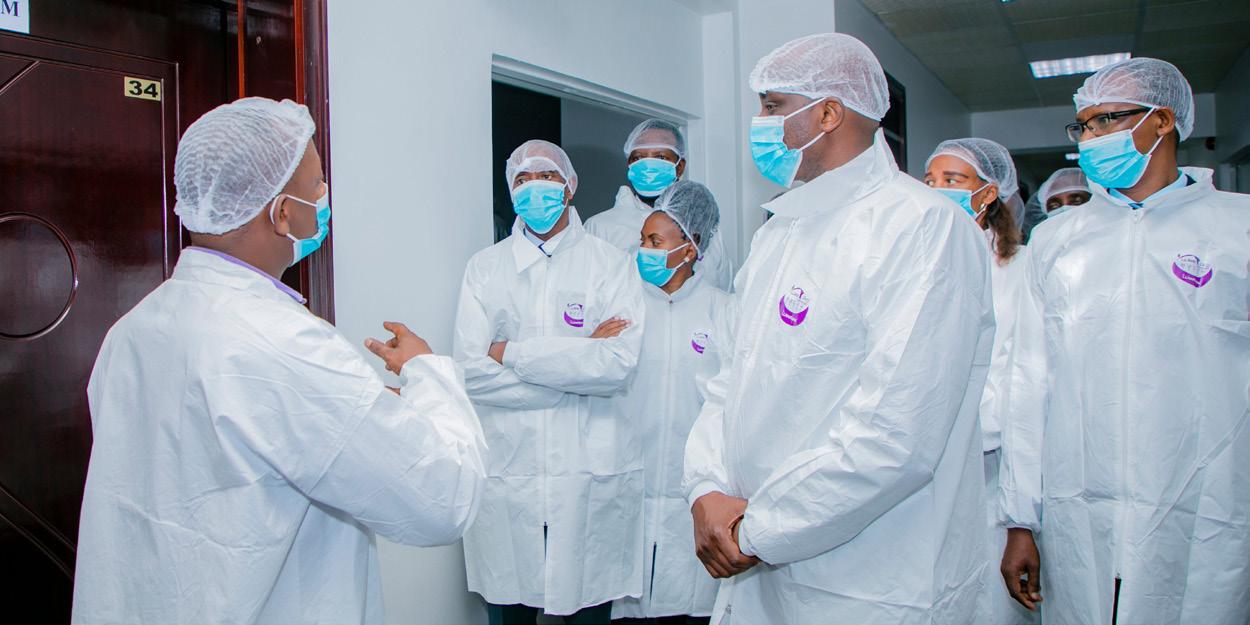
On Wednesday 3rd May 2023, leaders of the National Public Prosecution Authority (NPPA) paid a visit to Rwanda Forensic Institute to be able to acclimatize themselves with the services offered at the facility.
The visit was in line with deepening collaborations amongst justice sector institutions.
Led by the Prosecutor General Aimable Havugiyaremye, the delegation was received by the Director General of RFI Dr. Charles Karangwa. During the visit, the two delegations exchanged on opportunities of collaboration between RFI and NPPA and the impact this collaboration towards the promotion of the rule of law.
RFI’s Director General presented potential capabilities of the institution to support the justice sector.
The Prosecutor General commended the efforts made by the leadership of RFI to advance its technology and capabilities. He called for regular trainings of people working in the justice sector on forensic services, internationalization of forensic services and local and international awareness around the services offered by the institution.
The Prosecutor General Havugiyaremye expressed his commitment towards sustainable partnership between the two institutions for delivery of quality justice services.
The delegation was also given a tour of all RFI laboratories to explore the capabilities of RFI and used the opportunity to interact with experts in different departments of the institute.
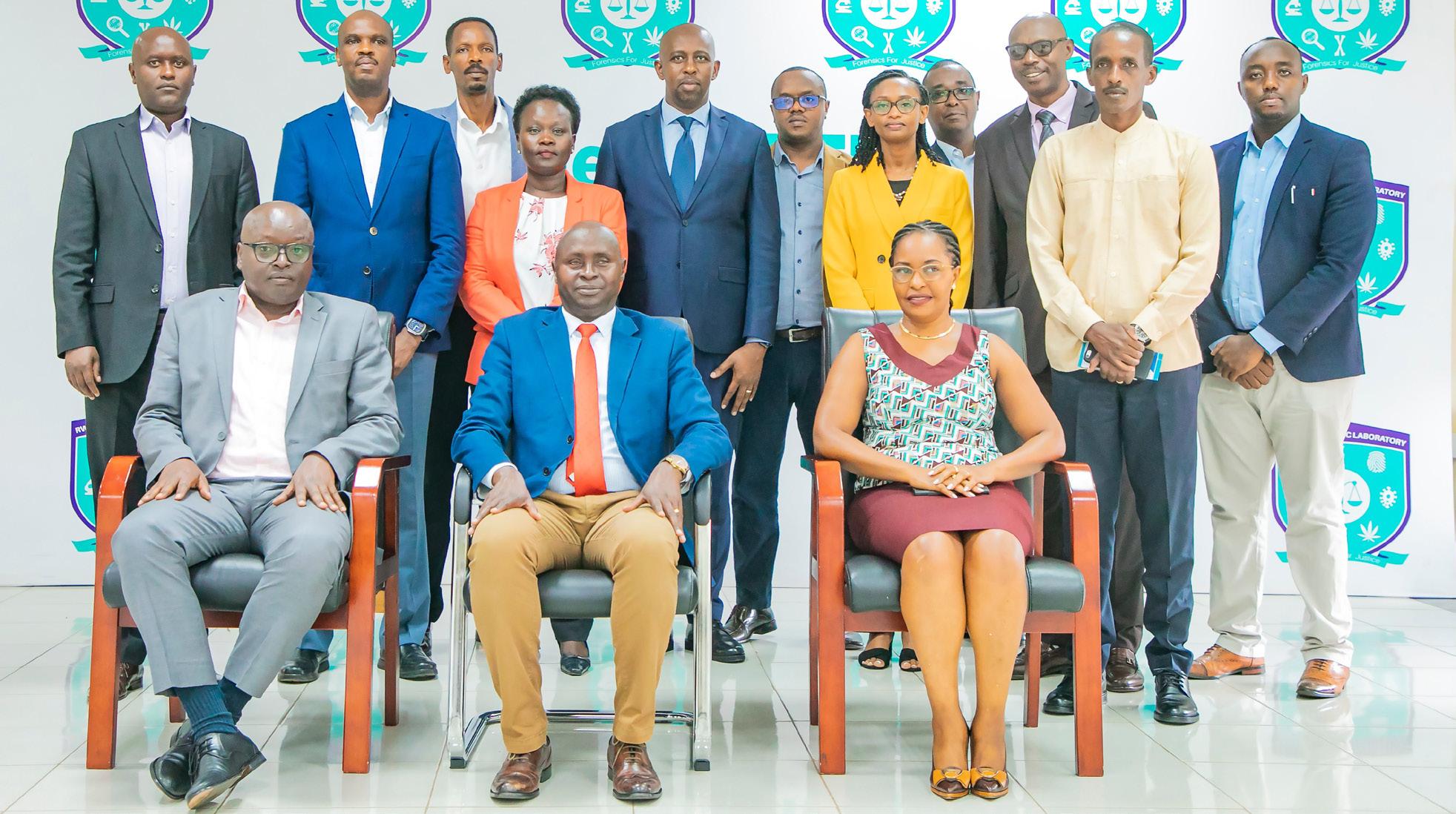
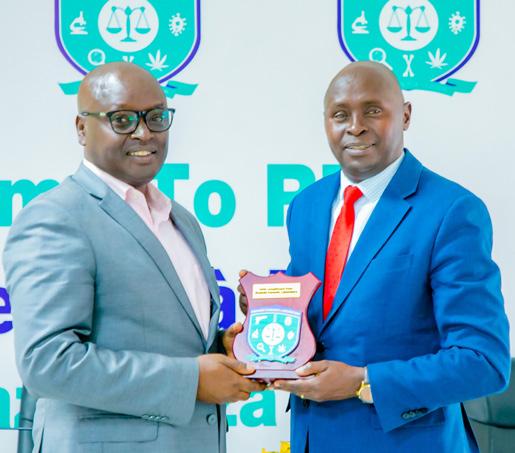
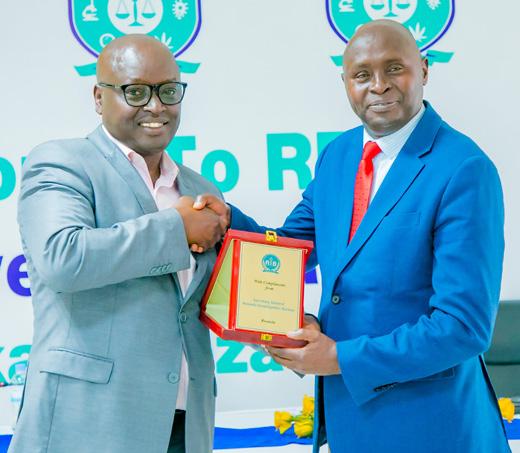
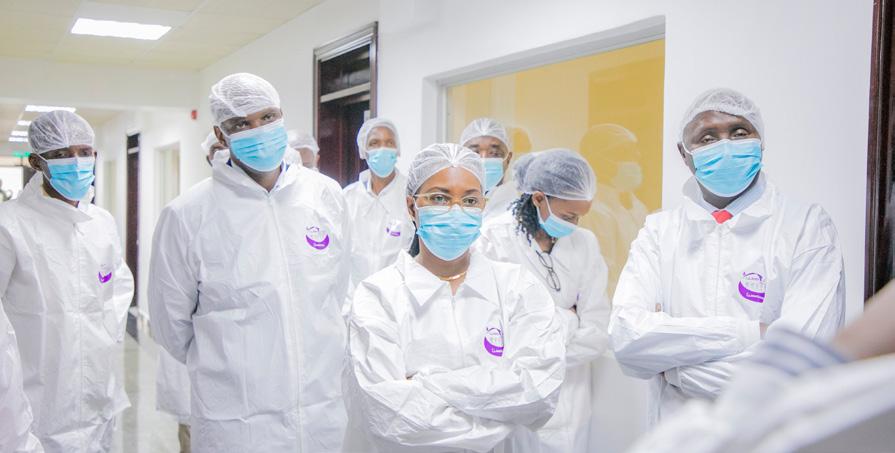
RIB’s delegation also interacted with RFI leaders to know more about forensic services and discussed possible improvement where necessary.
The delegation which was led by RIB’s Secretary General, Col (Rtd) Jeannot Ruhunga, sought to strengthen the existing collaboration between RIB and RFI in forensic investigations.
They toured RFI’s laboratories to explore the capabilities and technology used by the institution.
RFI’s Director General Dr. Charles Karangwa made a presentation of the services offered by RFI and explained the contribution of the institution towards the justice sector.
Dr. Karangwa handed over a gift to RIB’S Secretary General on behalf RFI as a sign of collaboration between the two institutions.
Col (Rtd) Ruhunga congratulated RFI for the progress it has made in terms of technological and infrastructural investment.
He also appreciated the work done by RFI in forensic investigations for better justice delivery.
RFI trained 30 District Chief Investigators from 30 districts and Chief Prosecutors
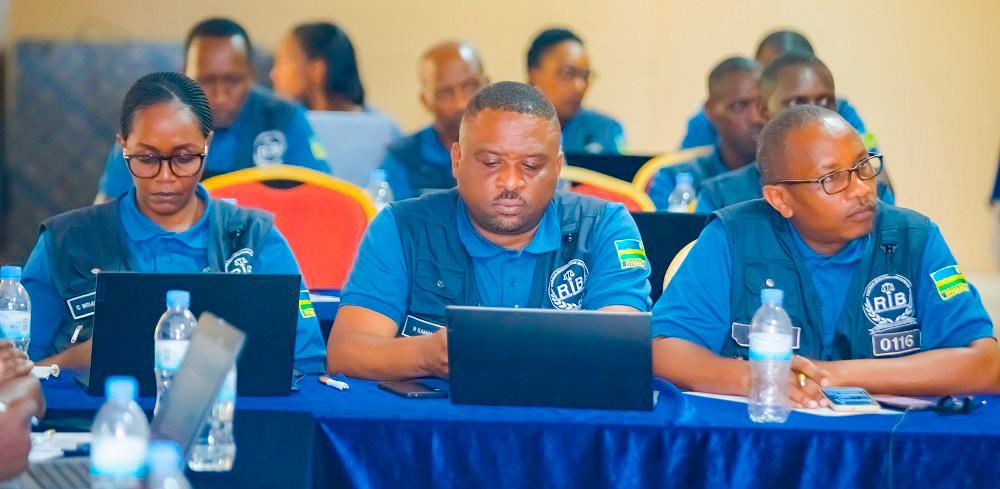
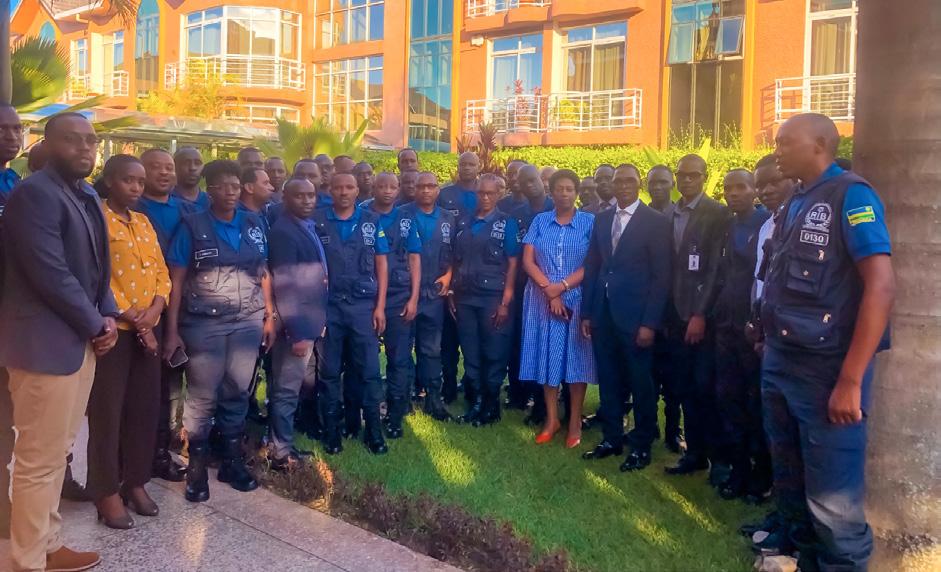
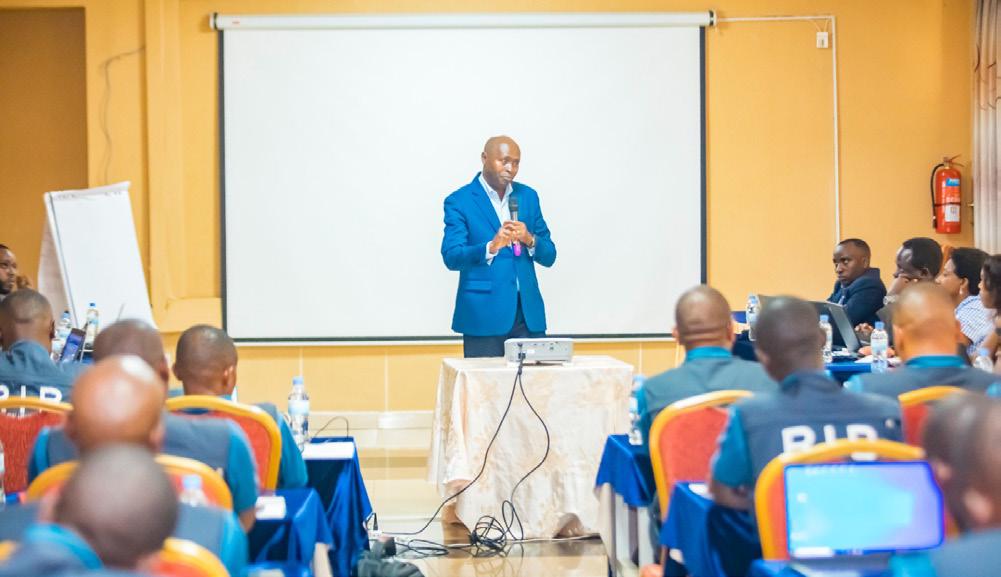
On Monday, May 15, 2023, RFI’s Director General Dr. Charles Karangwa presided over the official launch of a one-day workshop for District Chief Investigators(DCIs) and Chief I.T officials. The event was aimed at training the participants on the newly adopted Laboratory Information Management Systems(LIMS).
Dr. Karangwa thanked the participants for investing their time to attend this workshop as he urged them to make effort to familiarize with LIMS as a new way of delivering services in a quick manner.
The RFI has digitized all its services through LIMS. This is a step forward in harmonizing RFI’s deliverables and standards with the international level.
Hon. Chief Justice Dr. Faustin Ntezilyayo visited RFI
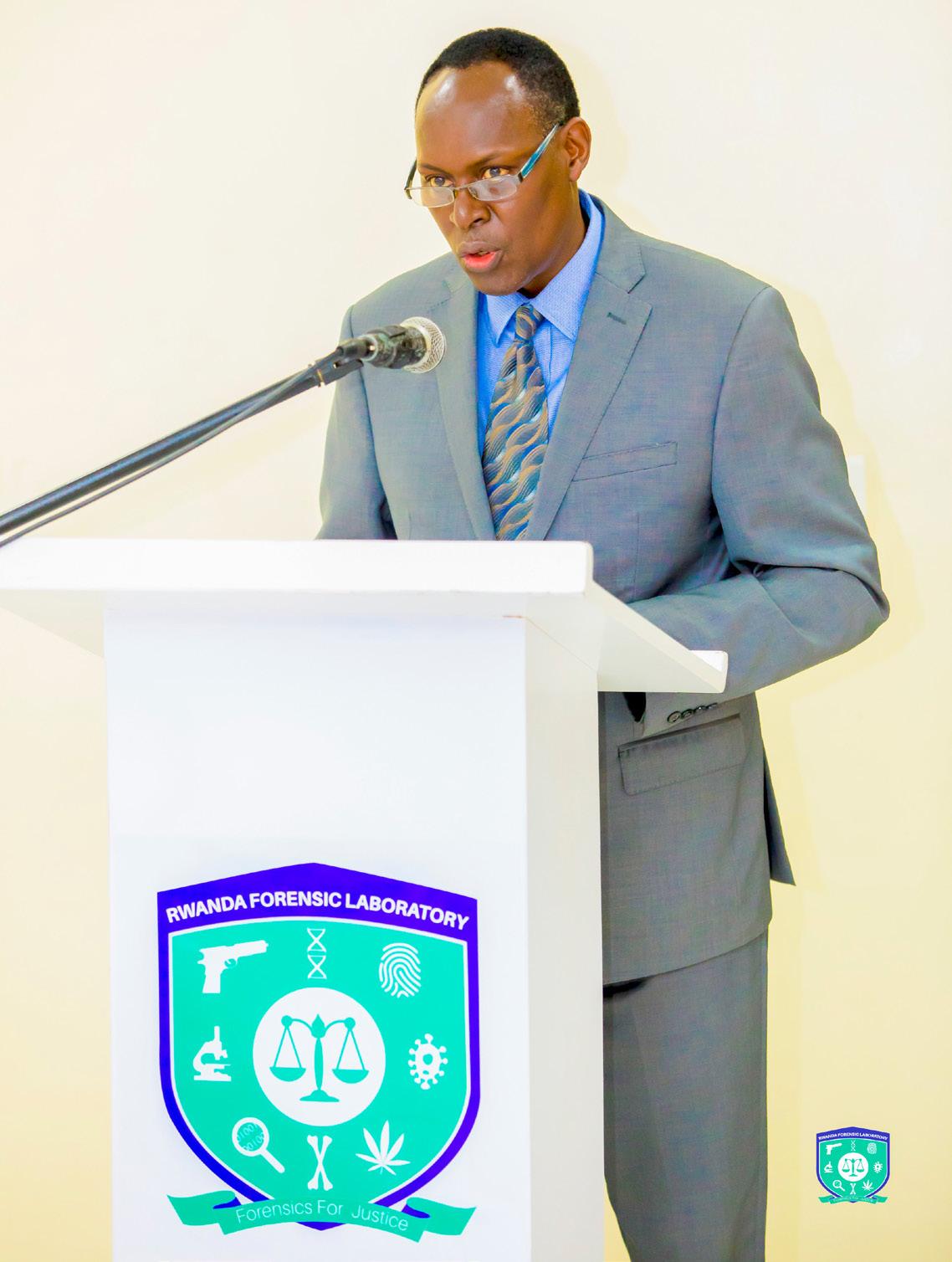
On August 4, 2022, Hon. Chief Justice Dr. Faustin Ntezilyayo paid a courtesy visit to Rwanda Forensic Institute.
He was welcomed by RFI’s Director General Dr. Charles Karangwa, who briefed him about the services offered by RFI, its capabilities and future prospects.
In his remarks, The Chief Justice congratulated RFI for the support it renders to the justice system. He appreciated the efforts made by the leadership of RFI’s administration to equip the institution’s laboratories, striving to improve the quality of its services.
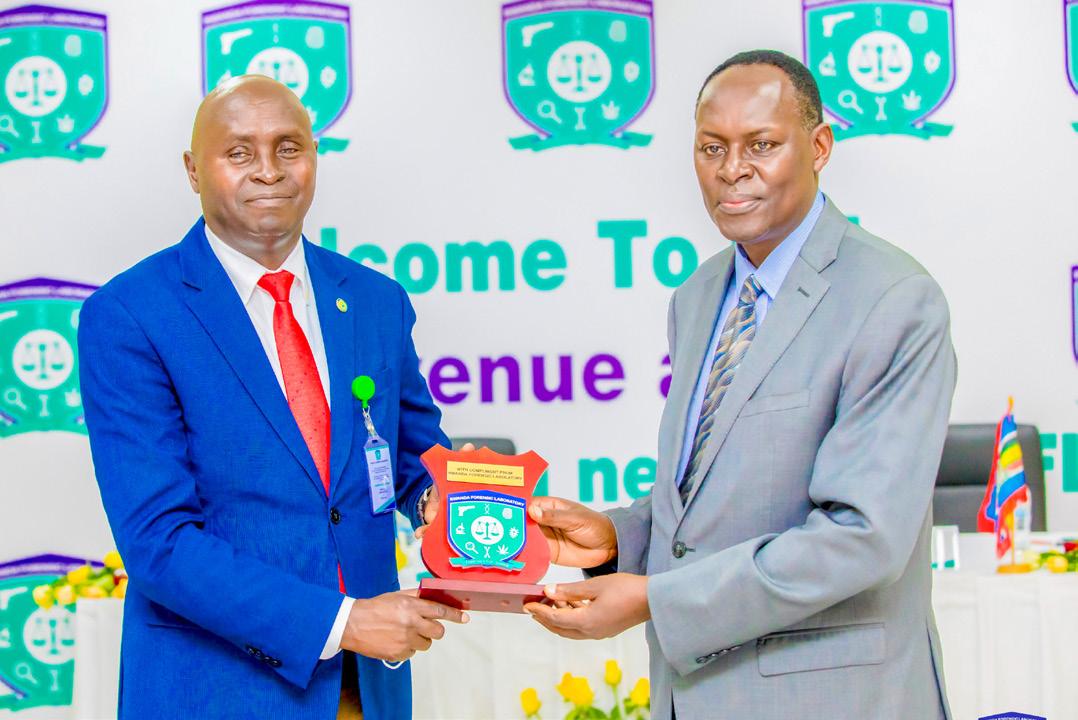
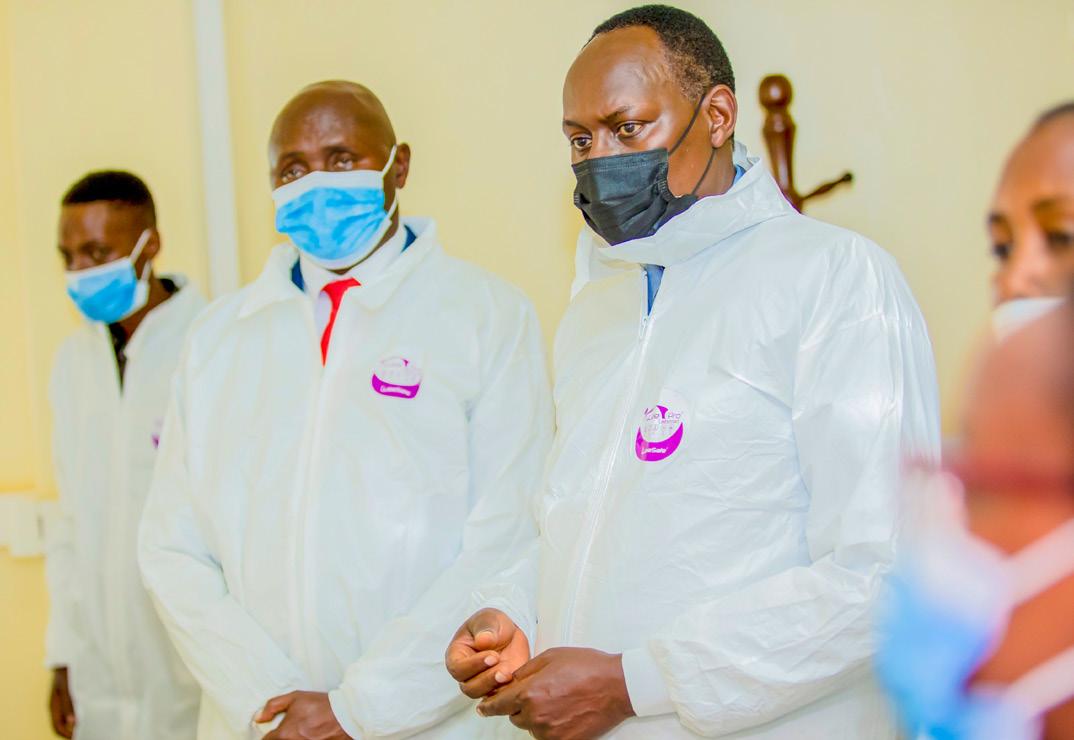
He promised to continue advocating for the institution and its services as he called upon justice sector players to take advantage of forensic services that are available in the country.
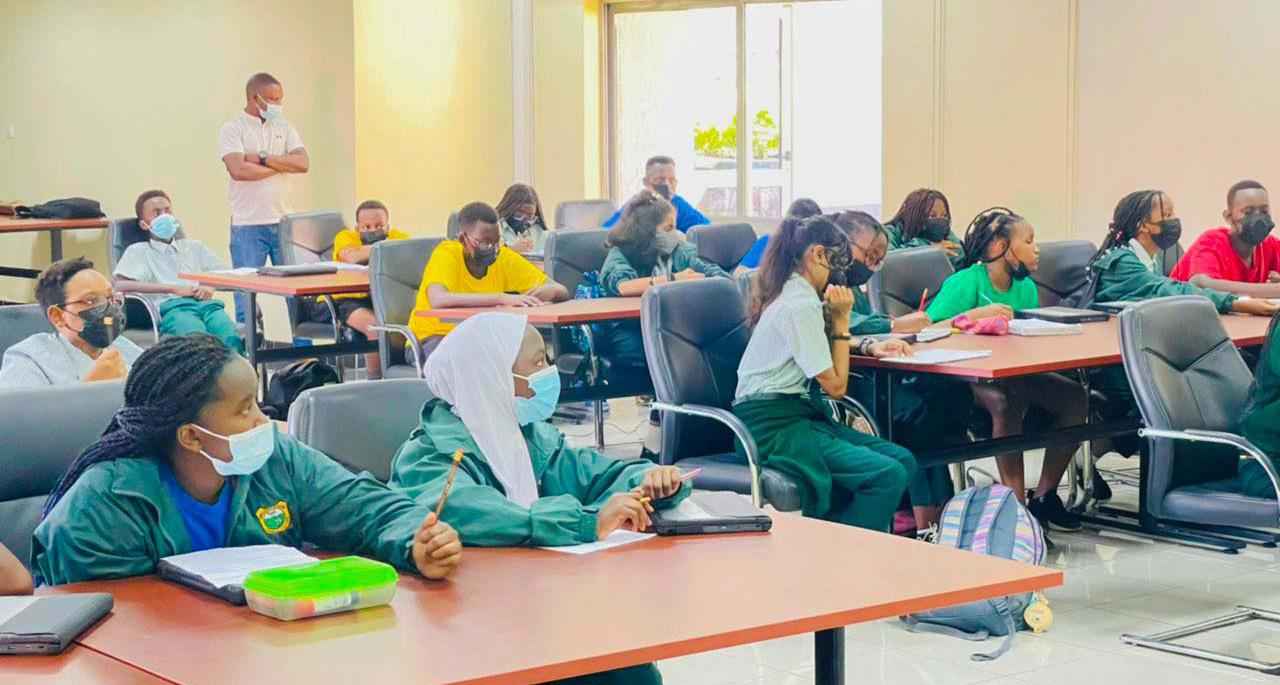
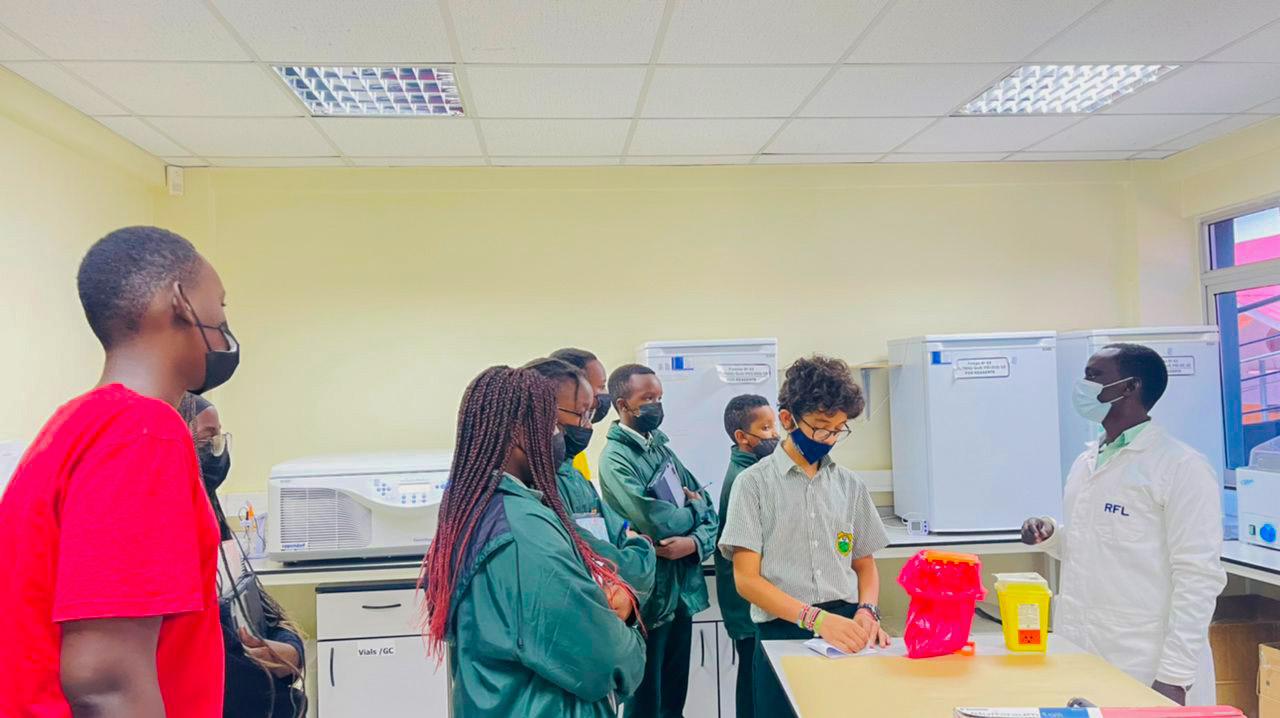
On March 12, 2022, Students from Green Hills Academy paid a study visit to Rwanda Forensic Institute.
The students were enthusiastic about science, especially the work being done at the institute to advance service delivery in the judiciary.
The visit is a testimony of the institute’s contribution towards the education sector especially application of science in different domains including forensics.
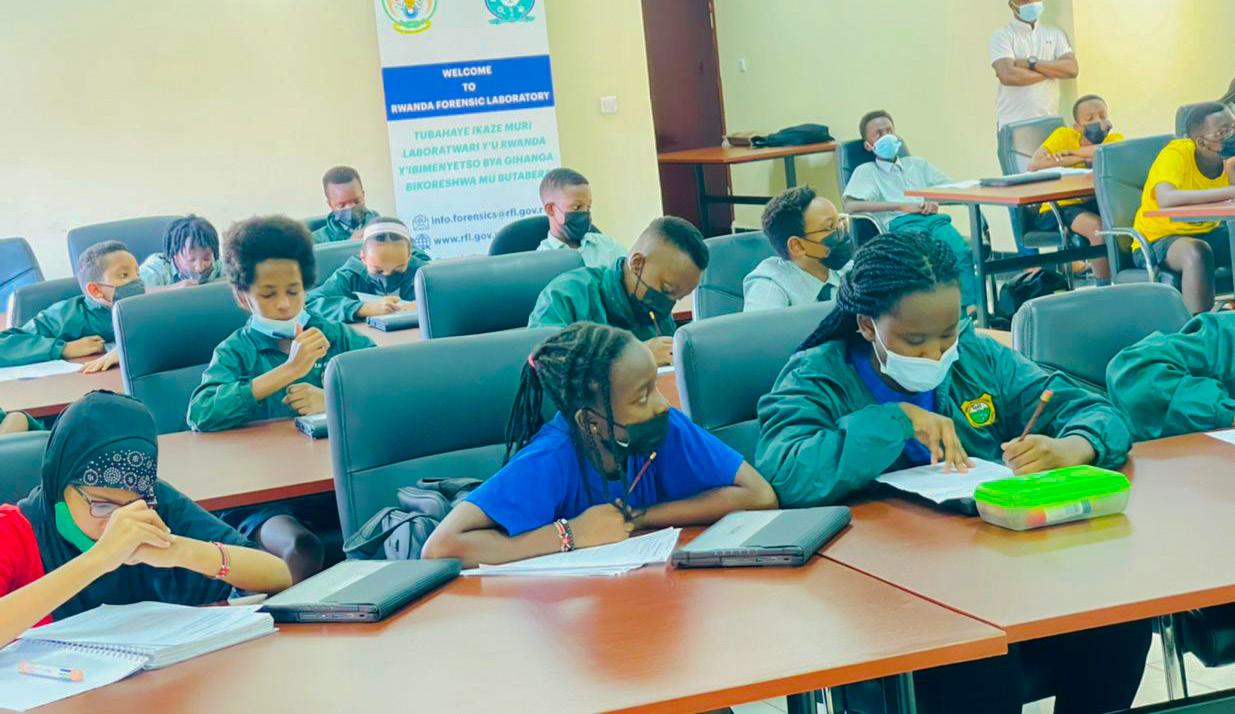
The students followed presentations and toured different laboratories of RFI and got an opportunity to ask questions and express their views on the work being done at the institute.
At the closing of the study visit, they expressed gratitude for the visit and the opportunity given to them to interact with experts at the different laboratories of RFI
Parliamentarians from commission on foreign affairs and security visited the Rwanda Forensic Institute
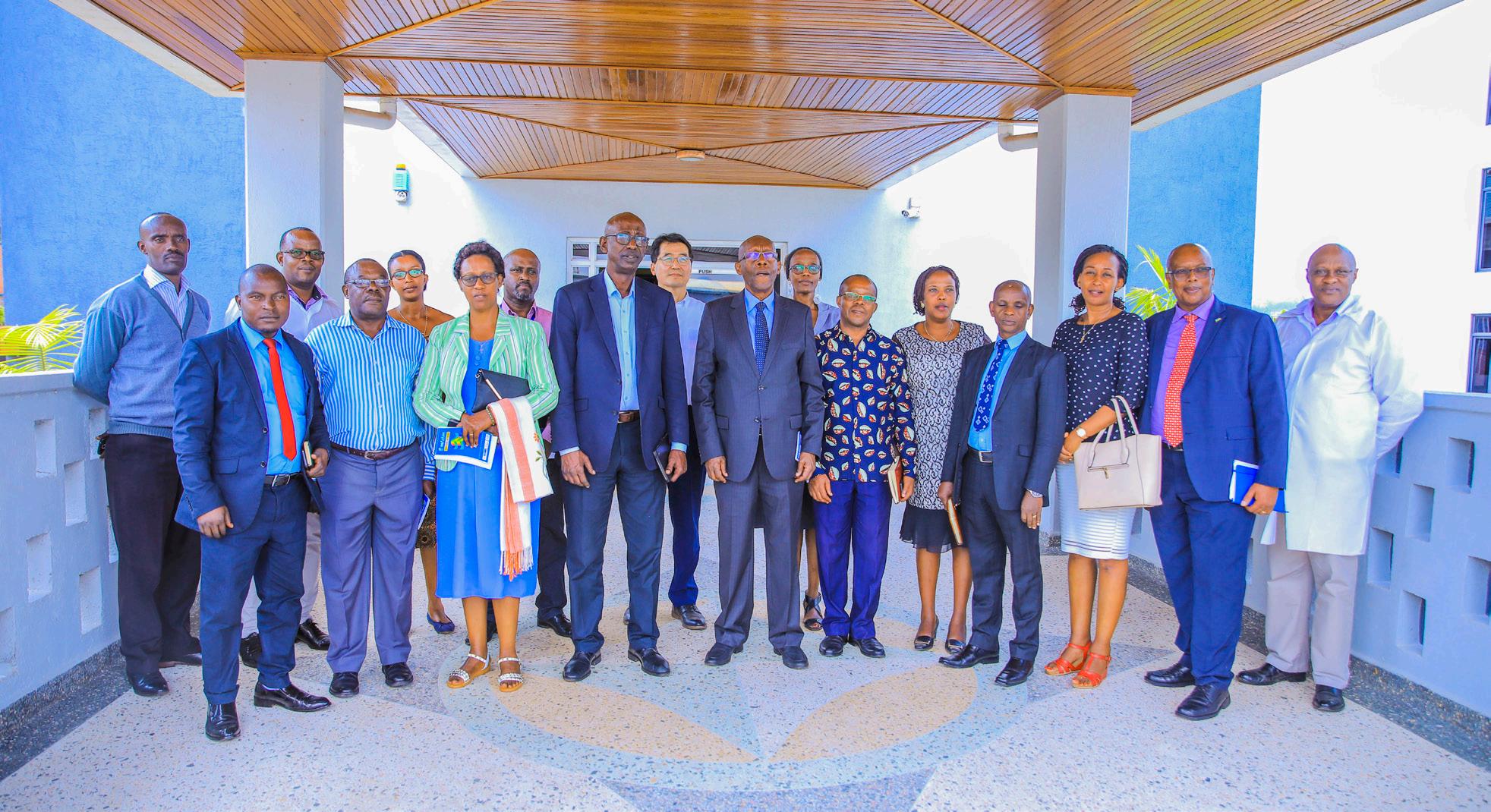
Members of the parliamentary commission on foreign affairs and security paid a visit to RFI to assess its operations and capabilities.
Their visit was part of the commission’s efforts to examine the operations of different public institutions. They raised questions regarding a couple of things including the budgetary allocation for RFI and the strategies for enhancing the utilization of forensic evidence in criminal justice.
The parliamentarians praised the institution and commended the progress made so far. However, they expressed their desire to see the laboratory strengthened with additional resources.
Dr. Francois SINAYOBYE, the former Director General of RFL (now RFI), expressed his gratitude to the delegation for their support towards the institution’s work.
He talked to them about some of the efforts aimed at strengthening the capacity of the RFI. Such efforts include training and establishing partnerships for research in countries like Germany, Belgium, and so on.
Dr. Francois also highlighted that the institution’s strategic plan includes acquiring necessary equipment and resources every year. He requested the delegation to use their voice to call for more funding towards the advancement of forensic science in Rwanda.
Minister of Justice / Attorney General visited RFI
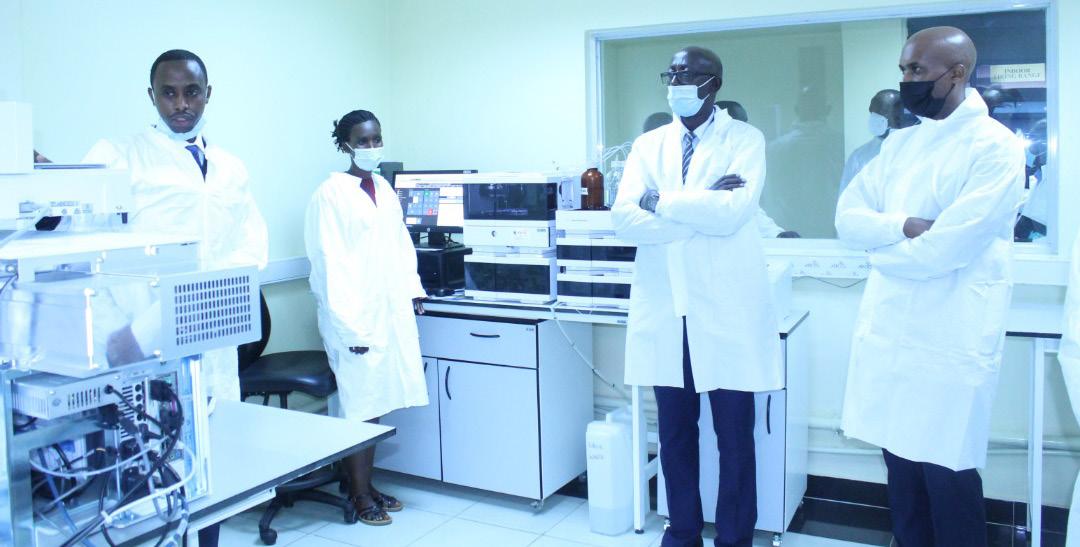
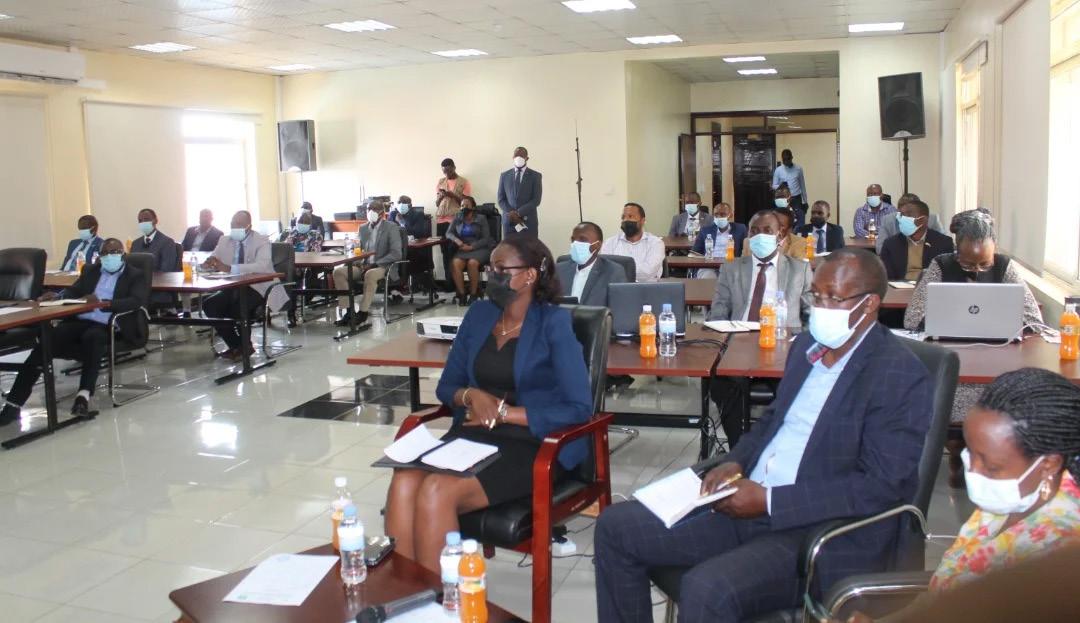
Friday, October 6, 2021, Hon. Minister of Justice and Attorney General Dr. Emmanuel Ugirashebuja paid a courtesy call to Rwanda Forensic Institute.
The visit was in line with a series of tours he made to several justice sector institutions to learn more about their performance, services and future plans.
Dr. Francois SINAYOBYE, the former Director General of the RFI welcomed the minister and presented him with the status of the institution since its inception.
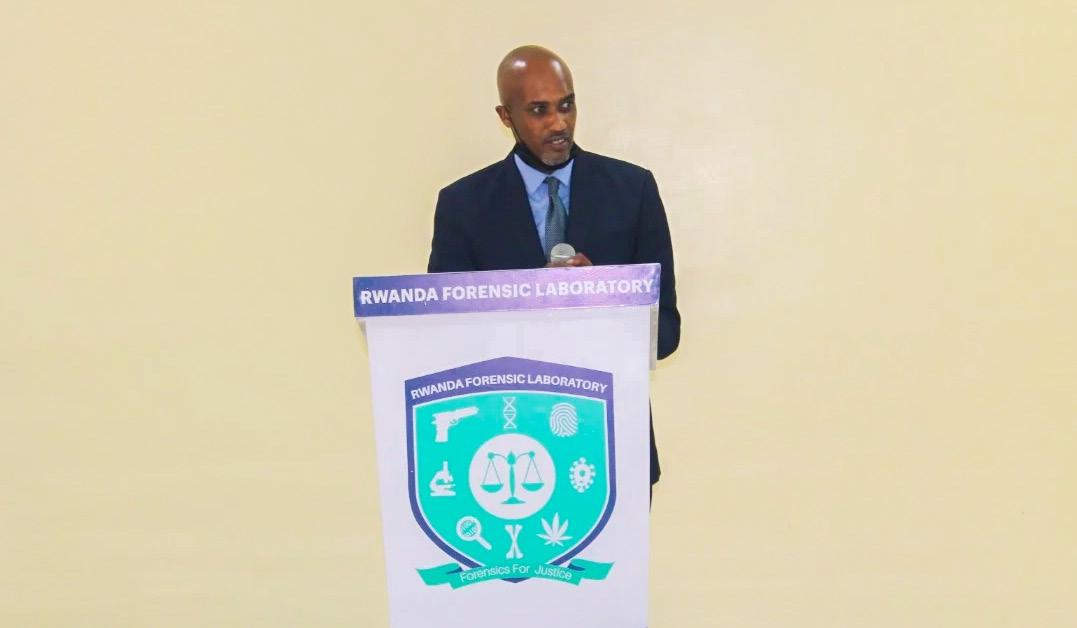
In his remarks, Dr. Ugirashebuja noted that having a forensic institution like RFI is an opportunity for not only Rwanda but the region.
He pledged to support the institution on its journey to development, as he appreciated the contribution of its leadership and staff towards the justice sector.
The minister also toured the institution’s laboratories and different units to learn more about its operations.
Leaders and employees of RFI visited NTARAMA Genocide memorial site
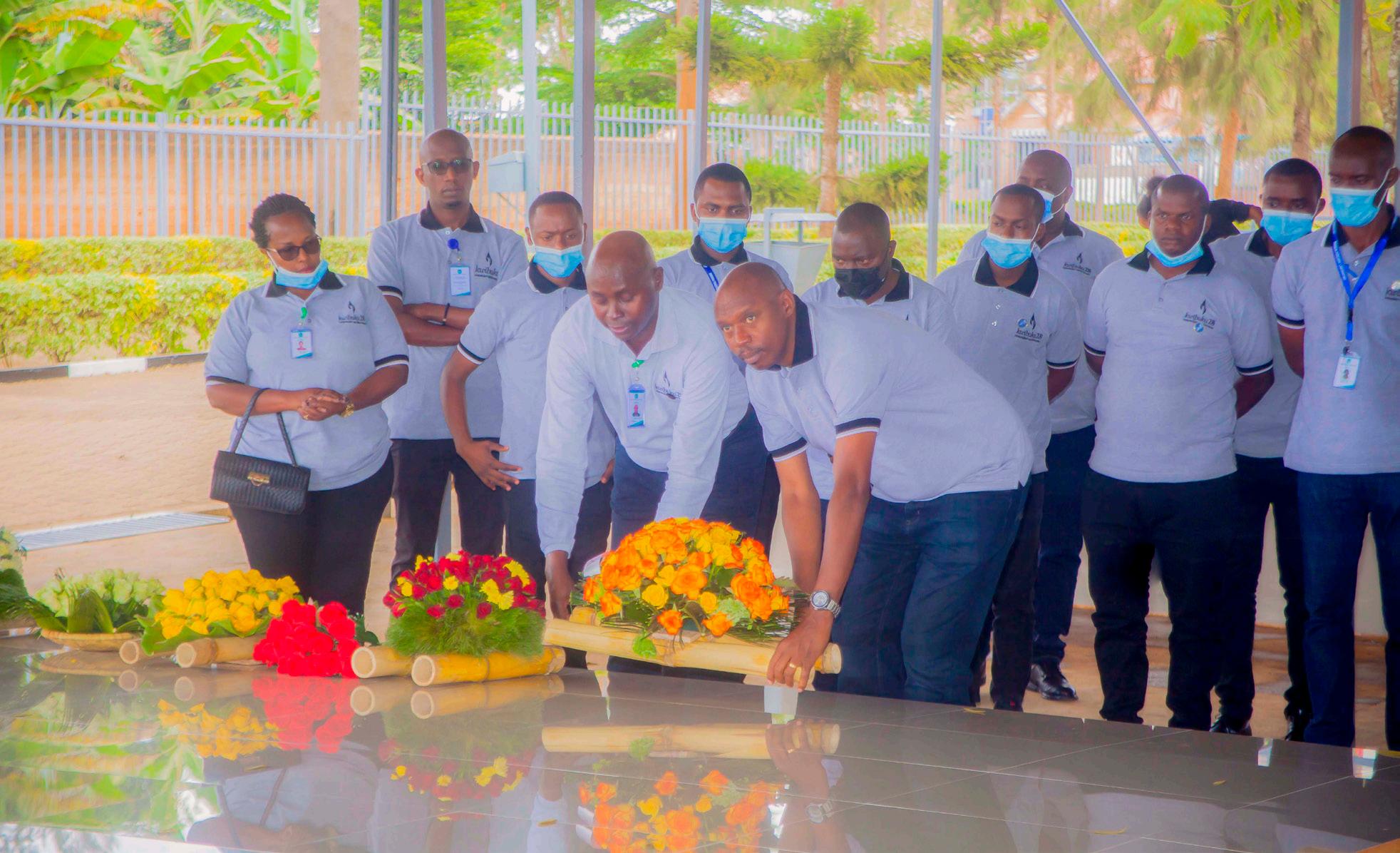
On July 27, 2022, officials and staff of RFI, visited Nyamata Genocide Memorial Site to pay tribute to the victims of the Genocide against the Tutsi.
Among other activities, they listened to a testimony of Jean-Baptiste Munyankore, a genocide survivor, who recounted the story of his survival.
Munyankore lost two children and his wife during the genocide.
“The perpetrators searched for us every day until we were almost exhausted,” he said.
Munyankore also reminisced on how the Inkotanyi (Rwandan Patriotic Front) rescued him.
After visiting the Nyamata Genocide Memorial, the leaders and employees of RFI proceeded to the Ntarama Genocide Memorial to learn about the first and second republics of Rwanda which were led by Gregoire Kabayinda and Juvenal Habyarimana, respectively, and their role in planning the Genocide against the Tutsi.
A worker at the Ntarama Genocide Memorial Site informed RFI’s officials and staff that the genocide was planned for a long time through indoctrination, sowing hatred and divisionism among Rwandans.
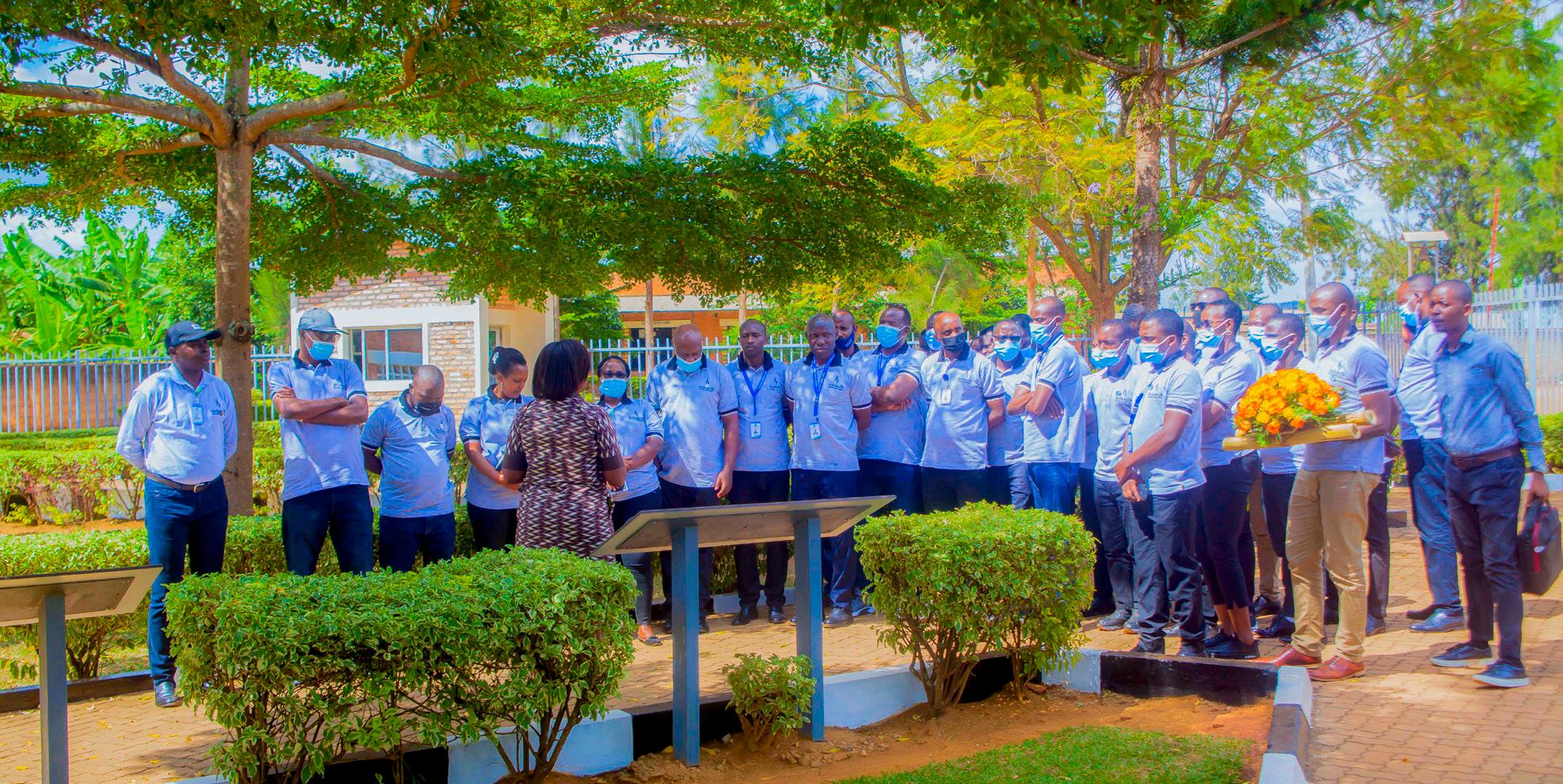
“Tutsis started being killed since 1959. Some started seeking refuge in foreign countries because they were treated as foreigners in their own country,” he said.
He noted that during the two republics, Tutsis continued to be killed and there was a system in place to oppress them through hatred and discrimination.
After the visit, RFI’s Director General Dr. Karangwa Charles, made a speech where he shed light on Rwanda’s history and the impact of colonialism, which categorized Rwandans based on different standards of living.
He noted that the purpose of visiting the memorial sites was “coming together to remember and learn from history and make sure genocide never happen again.”
He emphasized the importance of collecting evidence and preserving it as a way of bringing justice to the victims and holding the perpetrators accountable.
The visit was also an opportunity to talk about the need for continued efforts to heal, reconcile, and build a united and prosperous nation.
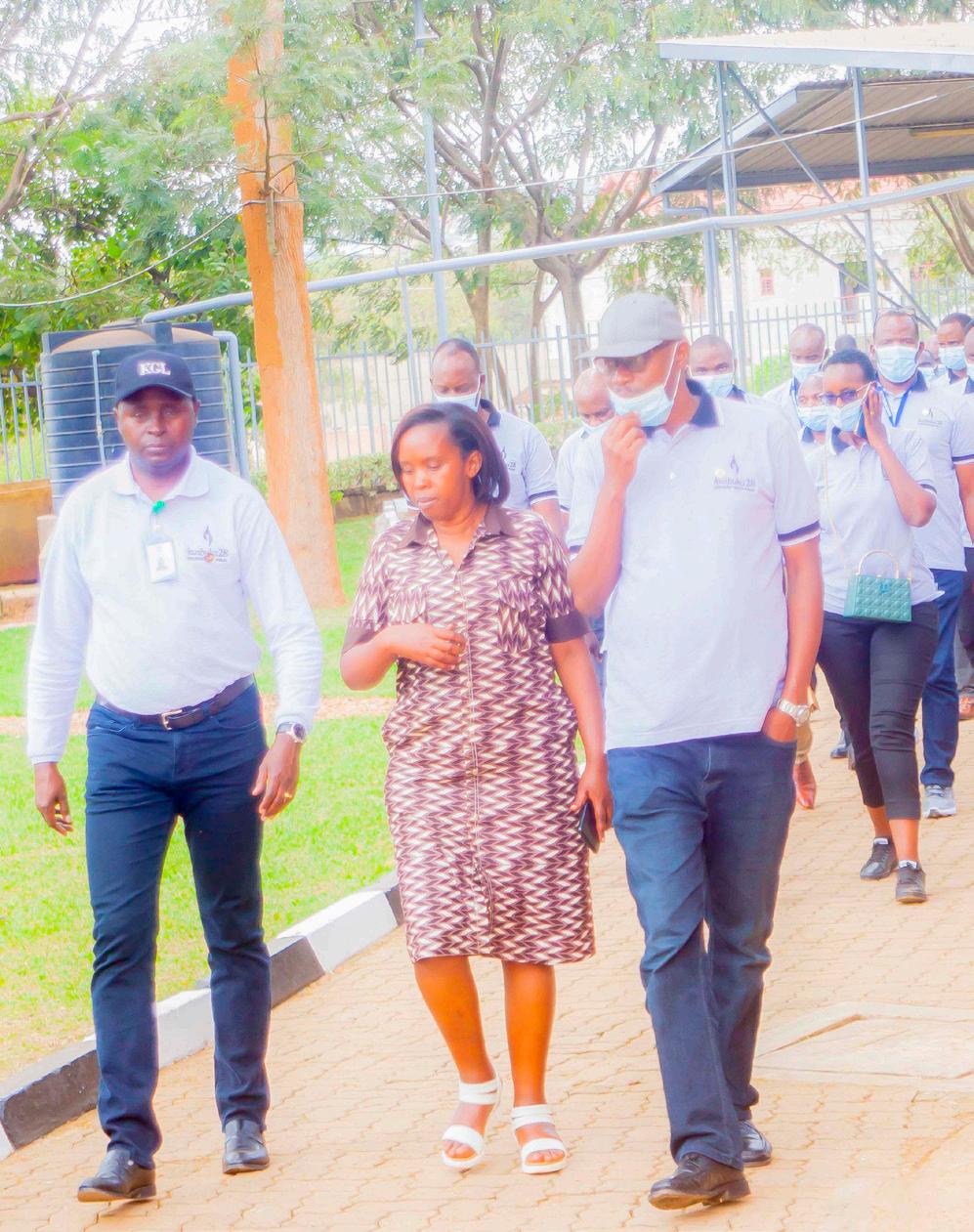
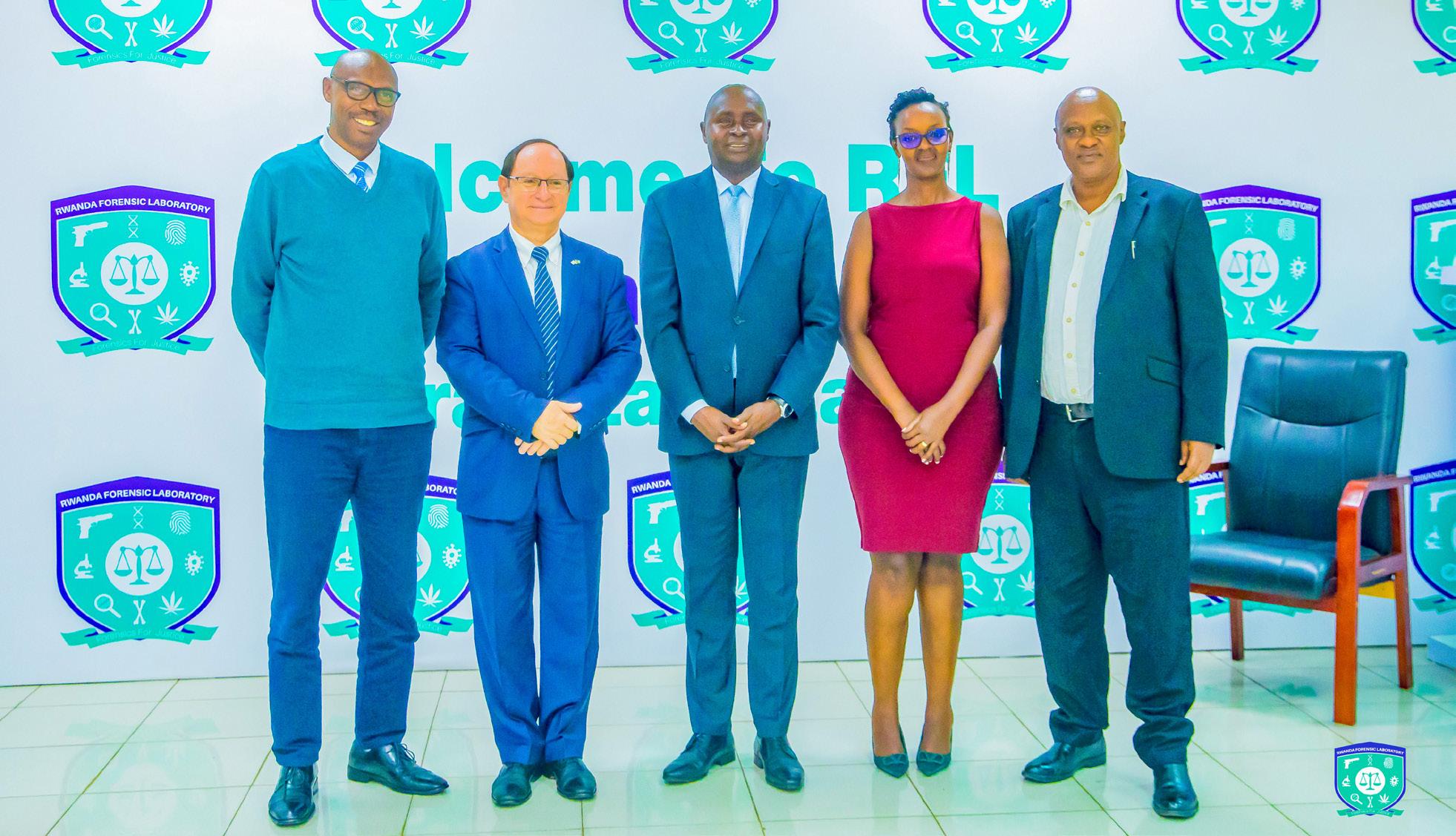
Rwanda Forensic Institute has not only received local visitors, but international ones too.
On June 2, 2022, Mozambique’s Minister of Justice, Hon. Helena Mateus Kida and her delegation visited RFI.
They were in Rwanda for a study visit where they checked on different justice sector institutions.
Hon. Kida was impressed by the technology used by the institution’s laboratories and congratulated Rwanda for such a facility.
She requested RFI staff to share expertise with their Mozambican counterparts.
In another international visit, Alhaji Mamour Jobe, Gambia’s Inspector General of Police was welcomed to the RFI’s headquarters on Tuesday 19, November 2019.
Together with his delegation, Jobe was in Rwanda for a week-long visit aimed at benchmarking best policing practices for home customization as part of security reforms that his country was undertaking.
RFI has also previously received delegations from Mali, Niger, Nigeria, Gabon, Botswana, Morocco, the EU, etc...
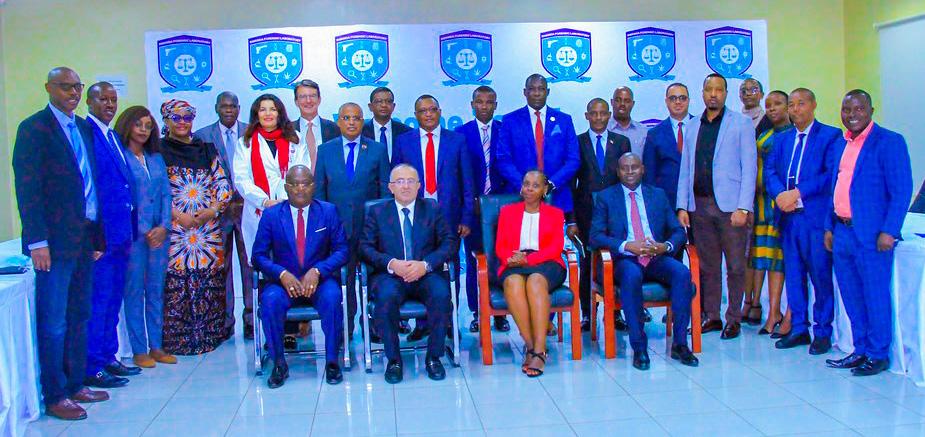
On July 17, 2022, ambassadors of var
ious African countries to Rwanda, paid a visit to RFI’s headquarters to explore its capabilities, achievements, challenges, services provided, international collaborations, beneficiaries, and so on.
Among the countries represented included Ethiopia, Morocco, Burundi, DRC, Senegal, Angola, Egypt, Sudan, DRC, Kenya, Nigeria, and Mali.
In a speech he made on behalf of his fellow diplomats, Youssef Imani, the Ambassador of Morocco to Rwanda, expressed their commitment to supporting RFI, as well as learning from it, so that their respective countries can have such services.
He mentioned that in 2019, he visited RFI and had intended to return earlier on, but due to the frequent outbreaks of Covid-19, his plans were disrupted.
Imani appreciated the opportunity to learn about RFI’s operations.
RFI’s Director General, Dr. Karangwa Charles, presented an overview of the institution to the ambassadors. He highlighted the role it has played in terms of providing services to justice institutions, the private sector, citizens, and others.
At that time, the RFI had handled a total of 30,155 enquiries for various services.
Between 2018 and 2019, the RFI processed 4,815 cases, between 2019 and 2020, it handled 5,812 cases, while between 2020 and 2021, it dealt with 8,354 cases.
The RFI collaborated with nine different African countries in its work.
Most of the services the RFI provided were in the field of clinical medicine, where they handled 16,714 cases. In the field of pathology, they examined 3,480 cases.
During his interaction with the ambassadors, Dr. Karangwa stated that DNA testing services are highly demanded in the country. He noted that the RFI had conducted 6,042 tests and 315 identification tests for unidentified bodies at that time.
He emphasized the importance of the collaboration between RFI and justice stakeholders, noting that it contributes significantly to the justice system.
He mentioned that RFI currently had 12 laboratories at that time, but there was a plan to establish more.
At that time, he also hinted at the plan to transform RFL into the Rwanda Forensic Institute (RFI), an internationally recognized institution providing forensic services, certifications, and training.
This plan has since been realised.
The RFI offers services such as DNA profiling, paternity testing, drug analysis, voice and audio analysis, document examination, crime scene investigation, and intelligence analysis.
Anasthase Nabahire, the Director General of Justice Sector Coordination at the Ministry of Justice, highlighted the importance of the the Ambassadors’ visit to RFI, stating that it plays a crucial role not only in the justice system but also in the country as a whole.
“Apart from being part of our country’s diplomacy, the African Ambassadors representing their respective countries in Kigali have witnessed the significant role played by RFI in combating crime and ensuring justice through the provision of forensic evidence,” he said.
He added that these countries submit cases for examination at RFI.
Dr. Karangwa also talked to ambassadors about the 10th Conference of the African Forensic Science Society, which was slated to take place in Rwanda in 2023.
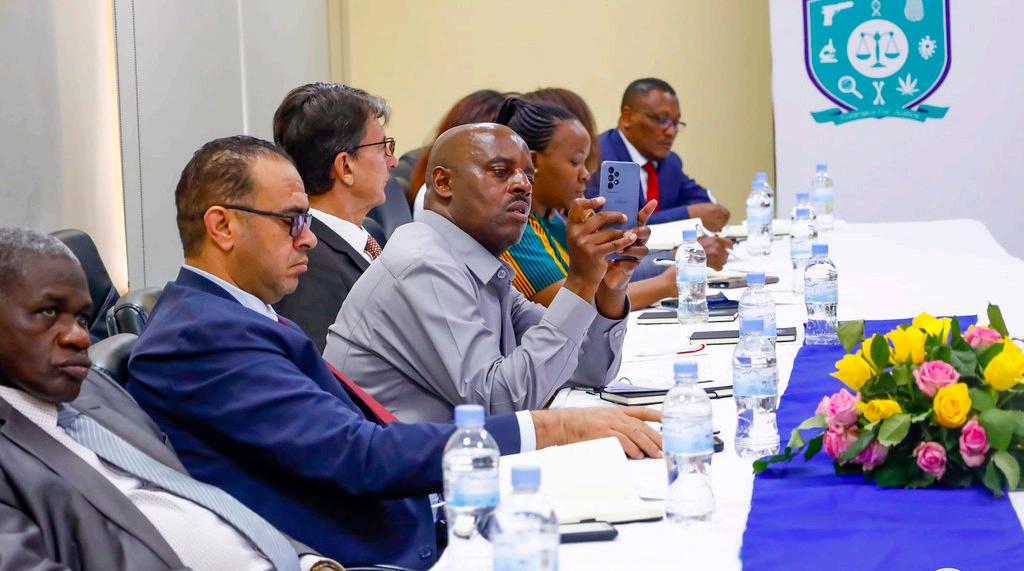
Hon. Helena, The Mozambican justice Minister visited RFI and requested for training of her employees
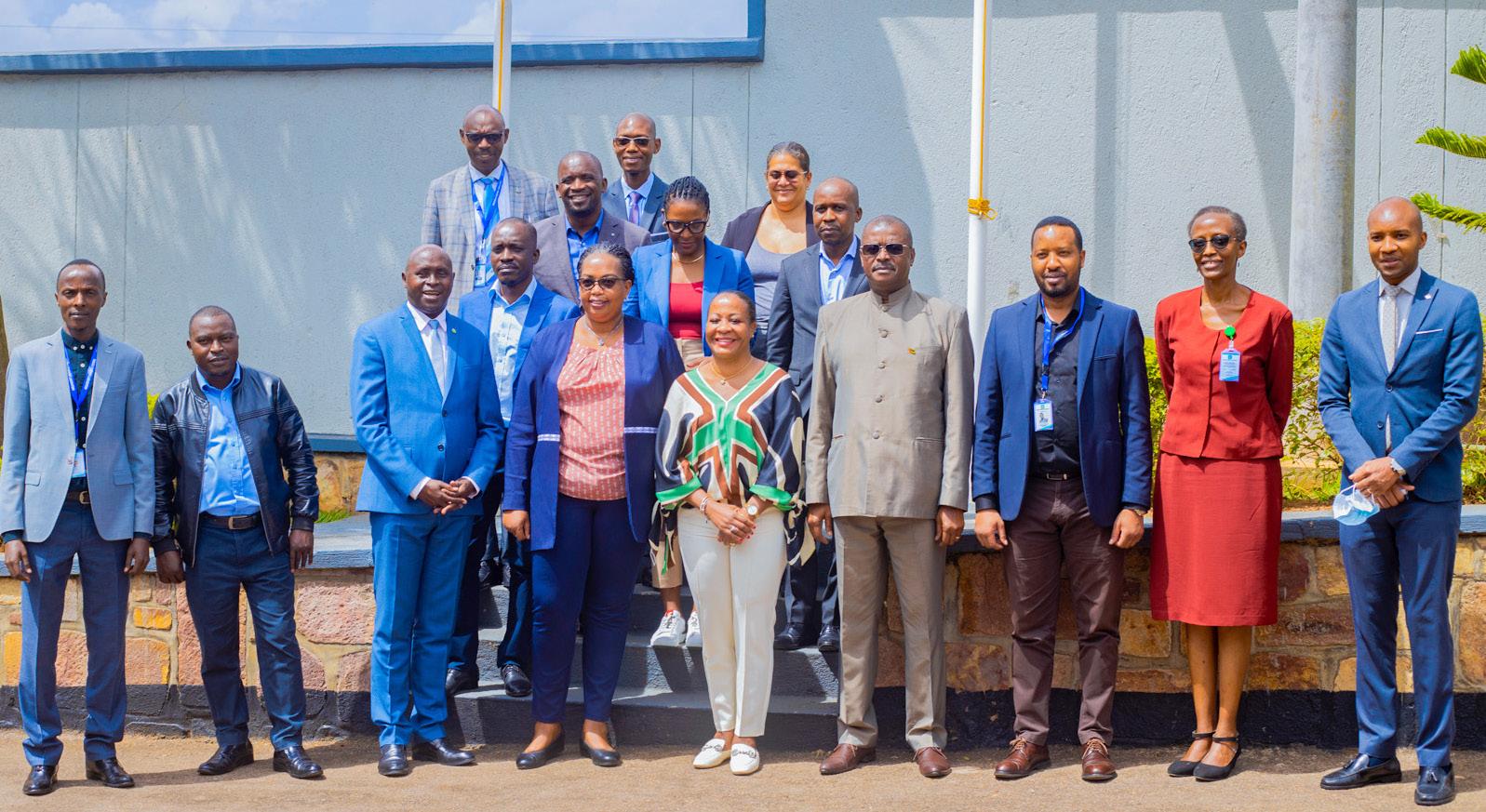
On June 2, 2022, the Director General of the RFI received Mozambique’s Minister of Justice, Hon. Helena Mateus Kida and her delegation.
The delegation was in Rwanda for a weeklong study visit to different justice sector institutions.
Hon. Kida was impressed by the technology of the forensic laboratory and expressed her heartfelt congratulations to Rwanda for establishing such facilities.
She requested the RFI to train Mozambicans in the forensic science domain. She also called for collaborations in forensic investigations and research.
She pledged that her country will send trainees to the RFI for workshops, trainings and practical learning.
Dr. Charles Karangwa, the Director General of RFI appreciated Hon. Kida’s commitment as he promised cooperation between RFI and Mozambique in the field of forensic science.
The Mozambican delegation had a tour around the RFI to explore more about its laboratories as well as speaking to forensic experts.
Gambian Inspector General of police visited RFI
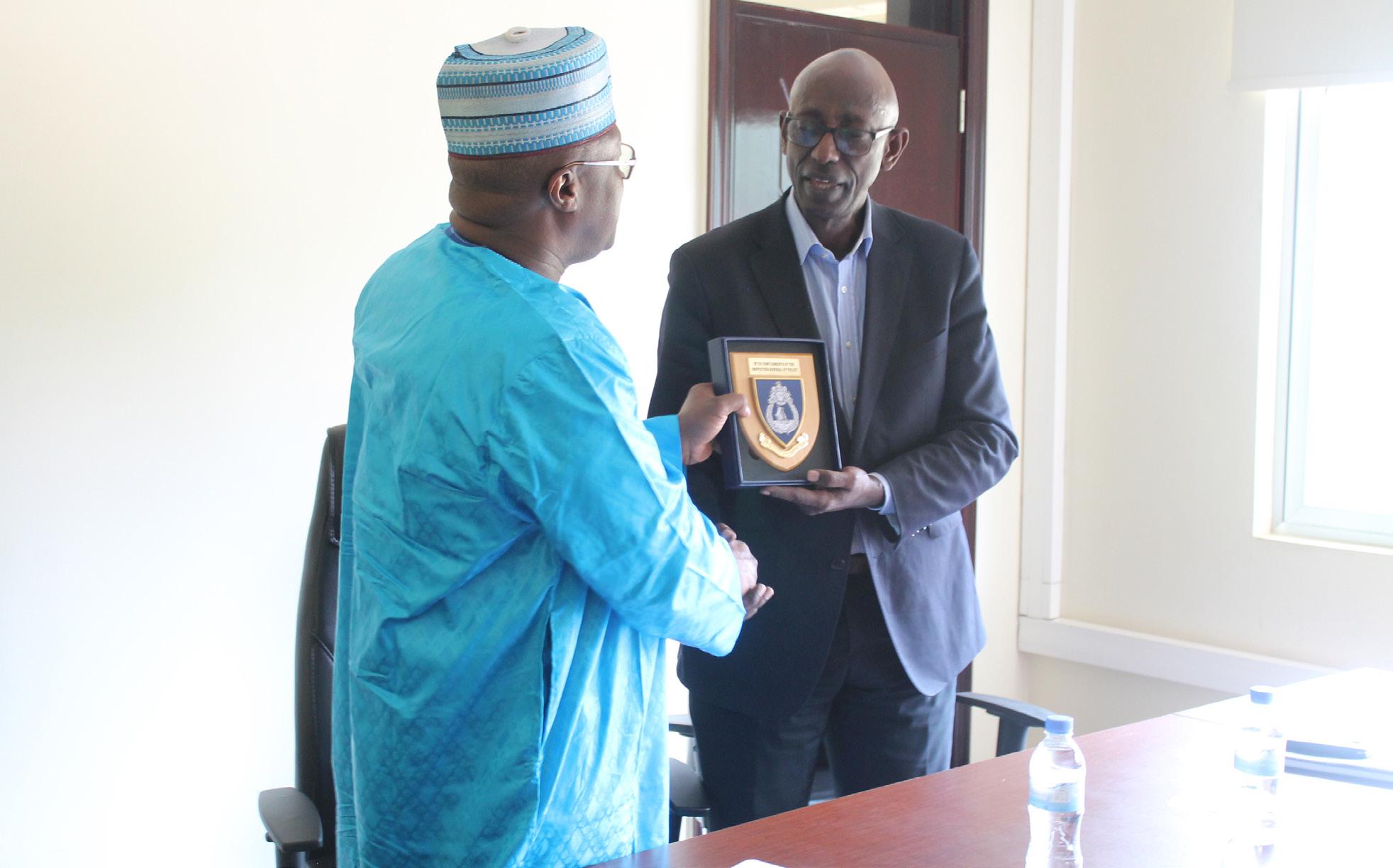
On Tuesday, November 19, 2019, Gambian Inspector General of Police Alhaji Mamour Jobe, visited Rwanda Forensic Institute headquarters.
IGP Jobe and his delegation were in Rwanda for a week-long visit aimed at benchmarking best policing practices for home customization as part of some security reforms that they were undertaking.
He was welcomed by Dr. Francois Sinayobye, RFL’s former Director General, who appreciated the visit as a move that reinforces the two countries’ partnership in the justice and forensic domains.
Dr. Sinayobye noted that RFL attaches value to cooperation and professional exchange of best practices, because it improves the quality of service delivery.
On his part, IGP Jobe said the visit was an important one in regards to the two countries’ need to learn from each other.
He noted that the work of Rwanda in the forensic domain makes it competitive in justice and law enforcement.
The Gambian police partners with Rwanda in exchange programs of policing and law enforcement, as well as police education and so on.
Mali delegation paid a courtesy call to RFI
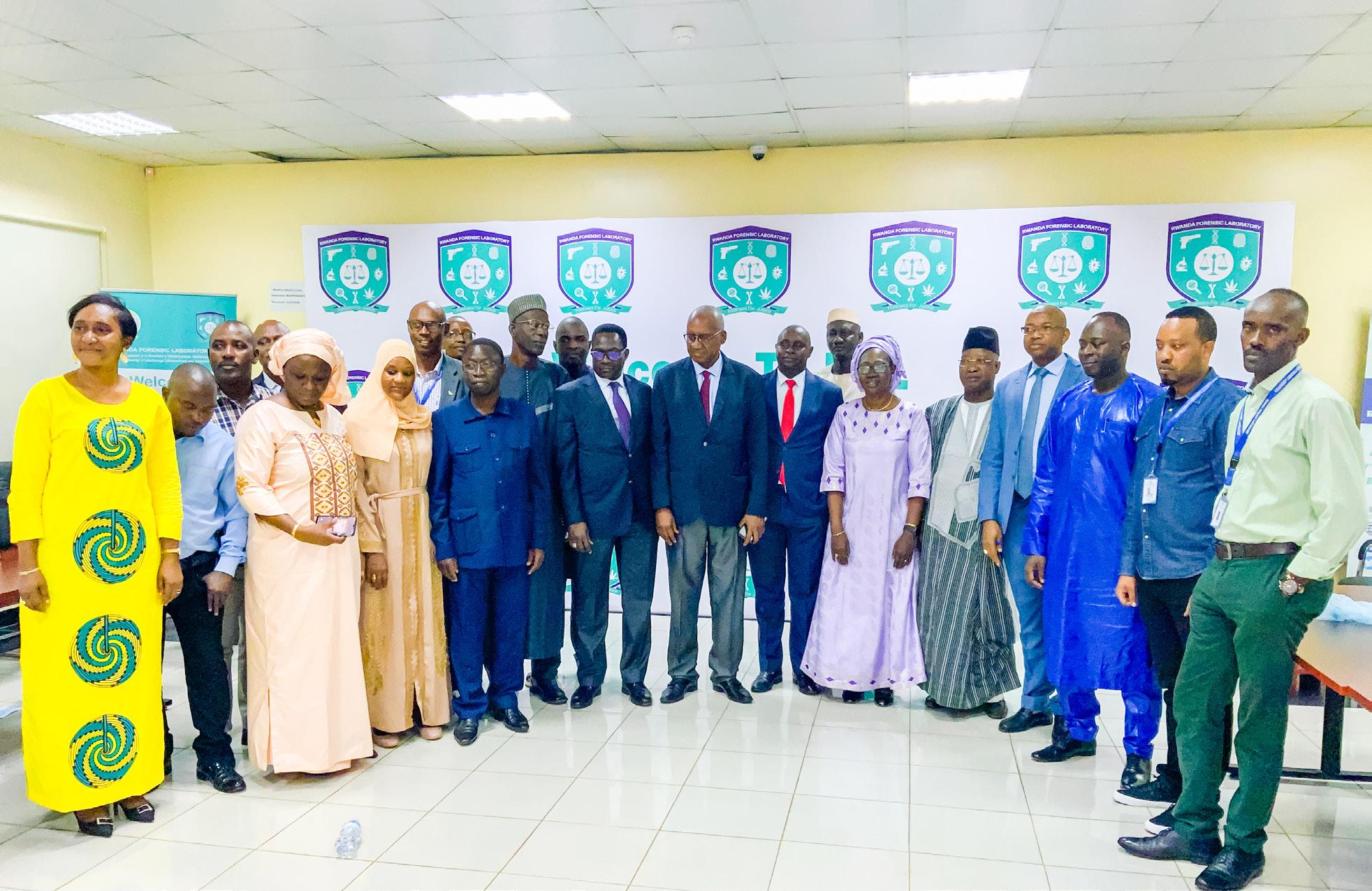
On July 21, 2022 a delegation from Mali’s justice sector, comprising different officials including judges, magistrates, and lawyers, visited Rwanda Forensic Institute’s headquarters.
Dr. Charles Karangwa, RFI’s Director General, welcomed them, presenting to them some of the forensic services that the institution offers, as well as its future projections.
The delegation not only toured the facility but also had time to ask questions about its operations.
Dr. Karangwa asked the Malian delegation to be ambassadors of the forensic services offered by the RFI in their country. He promised to partner with the Malian justice sector in training forensic science research.
EU Team paid a visit to RFI and commends Rwanda’s ability in Forensic Services
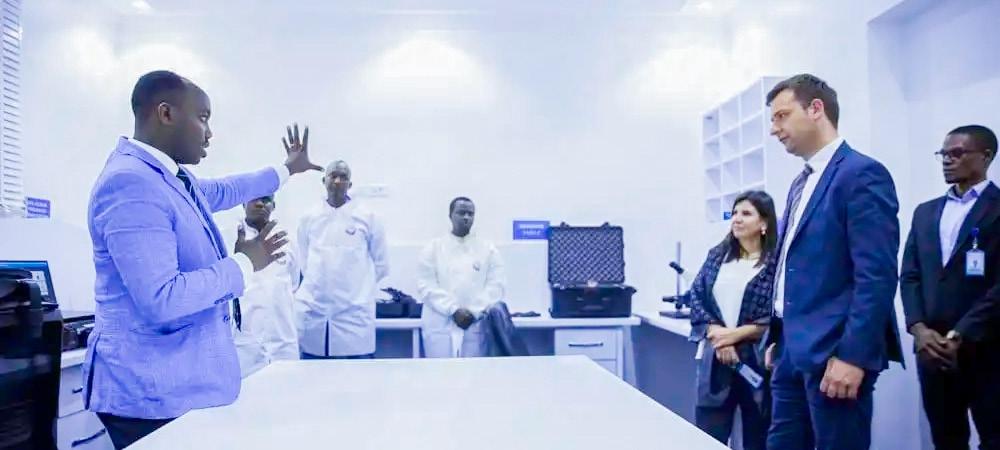
Officials from the European Council responsible for monitoring the Budapest Convention on Cybercrime, visited the Rwanda Forensic Institute (RFI) on February 8, 2023.
The team was in Rwanda to assess the country’s readiness to sign the Budapest Convention on Cybercrime.
The Director General of the RFI Dr. Charles Karangwa, told media that the group visited the facility to have a look at how it can play a role in fighting technology-based crimes.
The EU group was pleasantly surprised by the progress made by Rwanda in forensic services.
“They wondered how long these services have been in Rwanda, because they realised we are at a good level,” he Dr. Karangwa told the media.
The EU officials expressed the desire to be partners with Rwanda in the forensic science field.
They noted that they would be happy to see Rwanda sign the Budapest agreement because it would be a very important thing.
Rwanda presented expressed its desire to sign the Budapest agreement, and there are discussions on the requirements for this agreement to be signed.
The RFI is one of the requirements that can play a role for Rwanda to become signatory of the Budapest agreement.
The RFI boasts state-of-the-art equipment and a staff of experts, that gives it the ability to examine forensic evidence.
RFI currently provides services including DNA testing, blood analysis, post mortem testing, violent injury testing and gun and ammunition testing.
The lab also tests audio and video, forensics, footprint testing, crime scene testing, and poison testing
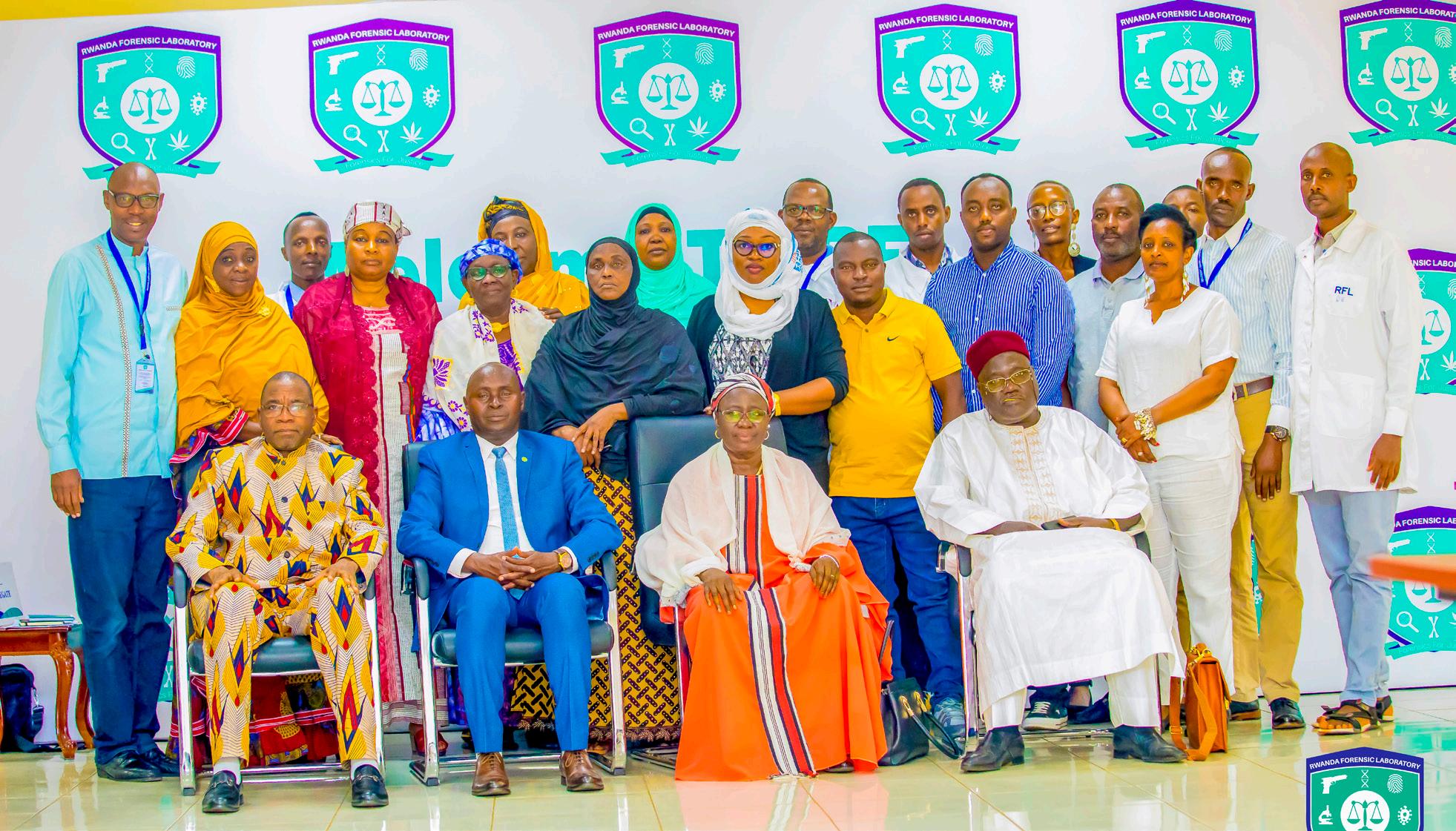
Rwanda Forensic Institute (RFI) is on its way to internationalize its services for the benefit of the region and continent through knowledge sharing, research and education partnership amongst countries and forensic institutions.
Expanding its services abroad will increase awareness of the country and RFI itself.
RFI expects to open branches in some African countries which are in serious need of forensic services in addition to starting trainings and research to enable the institution become a forensic hub and centre of excellence.
RFI has signed different MoUs with international partners such as The Netherlands Forensic Institute (NFI), National Forensic Sciences University (India), Institute of Legal Medicine, University Medical Center Hamburg-Eppendorf (Germany), Argentina Forensic Anthropology Institute, and so on.
Currently, RFI is the host institution for the African Forensic Sciences Academy’s headquarters. This enables RFI to collaborate with many African forensic institutions.
RFI works with international forensic companies like Thermofisher, Lodox, QIAGEN, ICRC, among others.
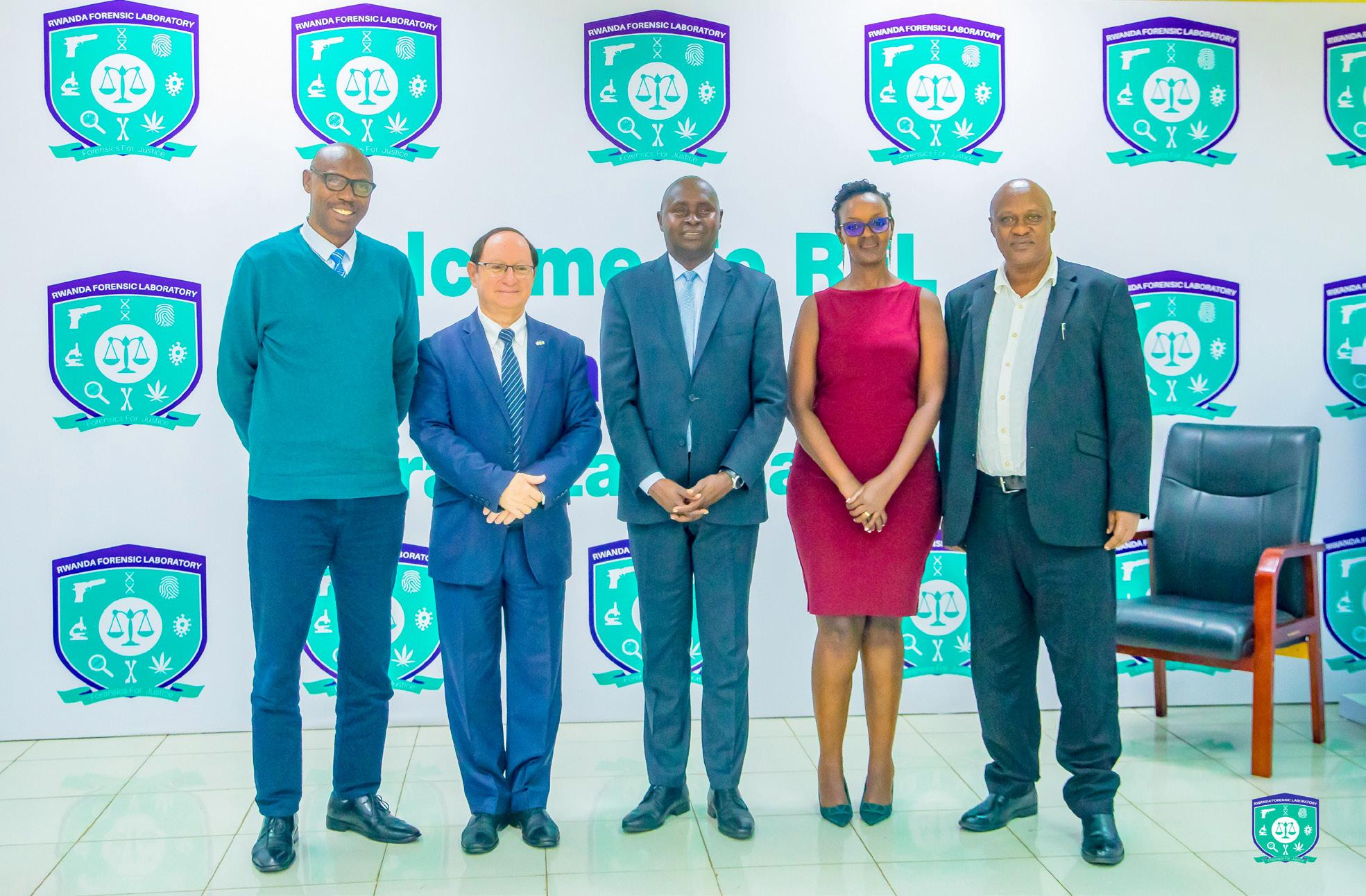
On November 1, 2022, Israel’s Ambassador to Rwanda Dr. Ron Adam paid a courtesy visit to Rwanda Forensic Institution to seek possible partnerships with Israeli forensic institutions.
RFI’s Director General Dr. Charles Karangwa took the ambassador through the services offered by RFI as well as the future plans in terms of strengthening its capacity.
He invited the ambassador to promote RFI’s services.
Ambassador Adam appreciated the institution’s achievements and said he is committed to facilitating partnerships between RFI and Israel forensic institutions.
He also pointed out that there are ongoing discussions between his country and the Ministry of Justice in the areas of forensic practices, ICT for justice among others.
Women empowerment and child protection Minister Allahoury Aminata of Niger visits RFI during a working visit.
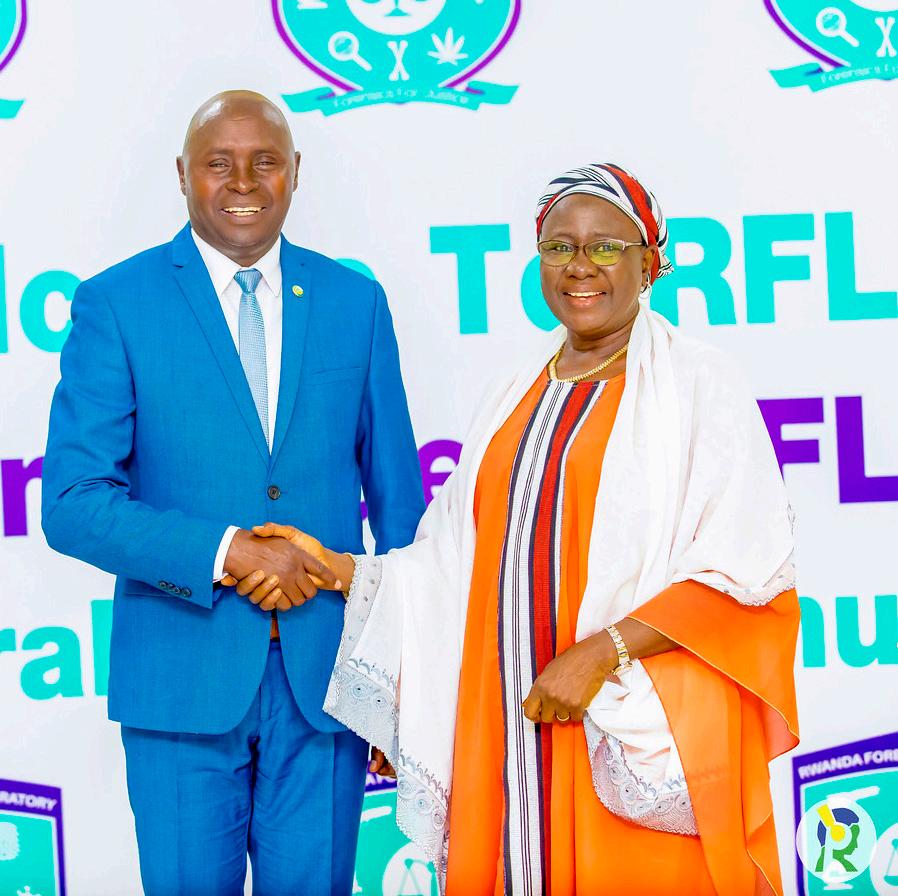
Niger’s Minister for Women Empowerment and Child Protection, Allahoury Aminata Zourkaleini, visited the Rwanda Forensic Institution (RFI) to learn about the services provided by the institution on July 29, 2022.
She was accompanied by a delegation that included the Secretary-General of the Ministry of Security in Niger, Mr. Halidou Saidou, and the Secretary-General of the Ministry of Health in Niger, Dr. Ibrahim Souley.
DGO_PUB_01_RFI
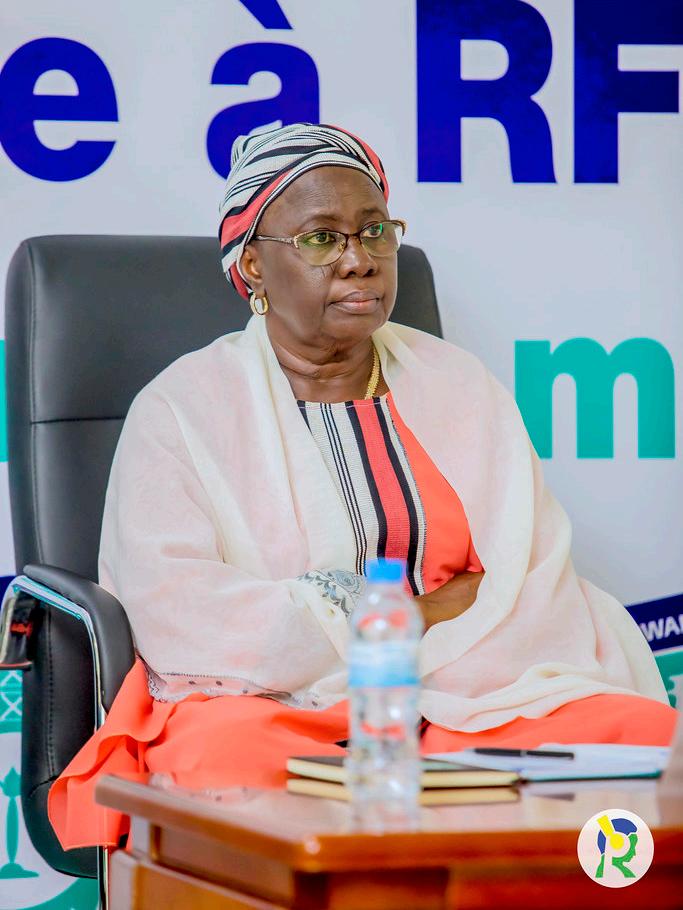
He also showcased to them the “Forensic Medicine” system which employs medical expertise to examine bodies
Dr. Charles Karangwa, the Director General of RFI, expressed his gratitude to Minister Allahoury Aminata and the accompanying delegation for their visit to the institution.
He highlighted to them that RFI has a primary role in providing support to individuals, institutions, and organizations in the justice sector by providing scientific evidence.
He noted that the laboratory is equipped with stateof-the-art forensic facilities that can contribute to various aspects of investigation into cybercrime, financial crimes, and others.
He showcased to the officials some of the services provided by the RFI. These include the “Document and Finger Print” system used for document authentication and comparing fingerprints for the identification of suspects, as well as the “Digital Forensic” for investigating, collecting, and analyzing digital evidence used by institutions, organizations, and individuals.
Dr. Karangwa stated RFI aimed to provide assistance to Niger’s justice system in collaboration relevant institutions.
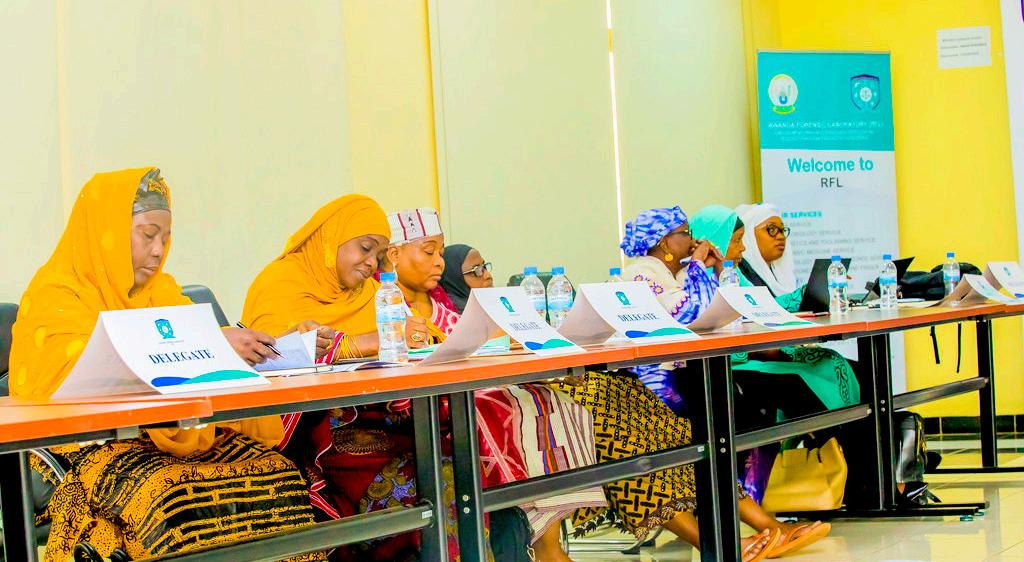
“RFI’s existence is an illustration of the strength and commitment of our country’s good governance. We are keen to contribute to Niger’s justice system as we collaborate with other countries to combat transnational crimes effectively,” Dr. Karangwa said.
Minister Allahoury Aminata expressed Niger’s openness to cooperate RFI in fighting transnational crimes by using forensic science.
She talked about the importance of knowledge exchange and collecting international best practices to enhance capacity building, both in terms of infrastructure and human resources.
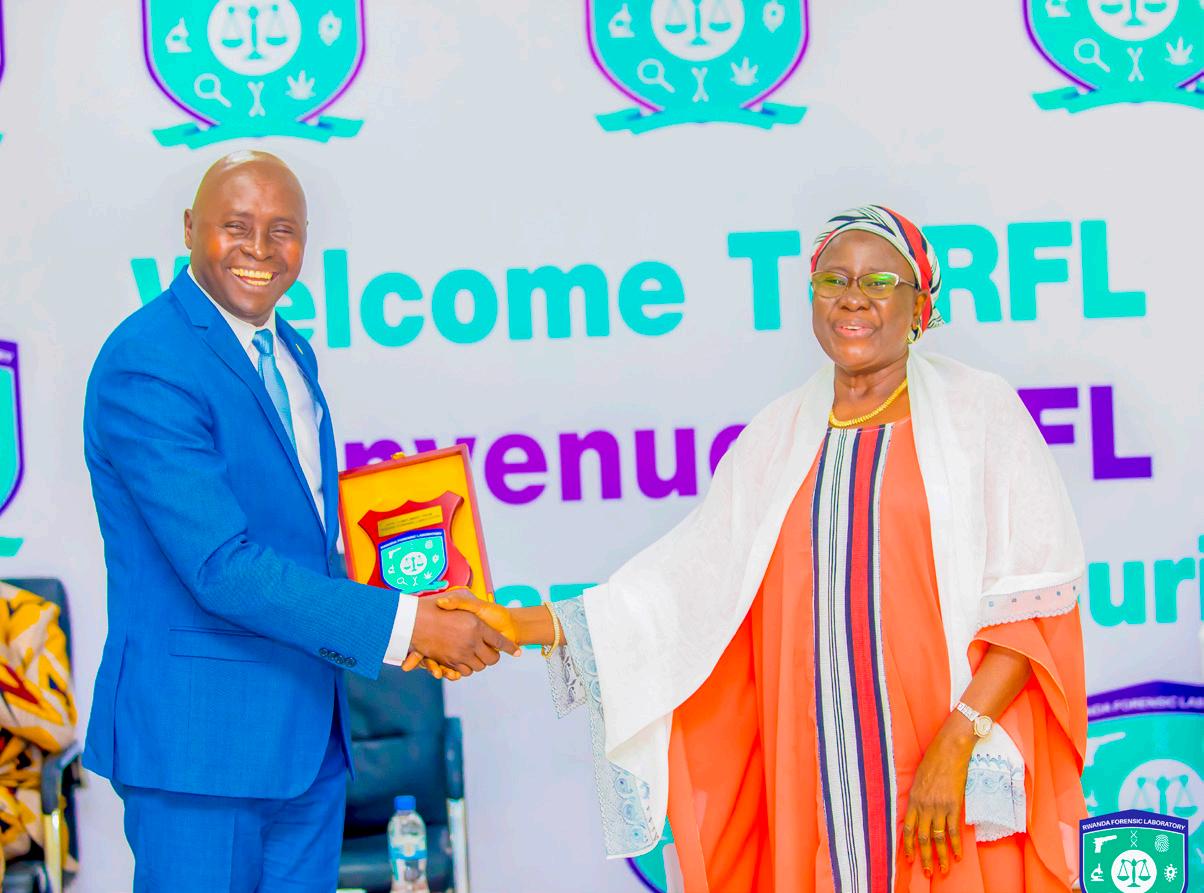
Asfm 2023 kicks off with call for more investment in forensic science to deliver quality justice
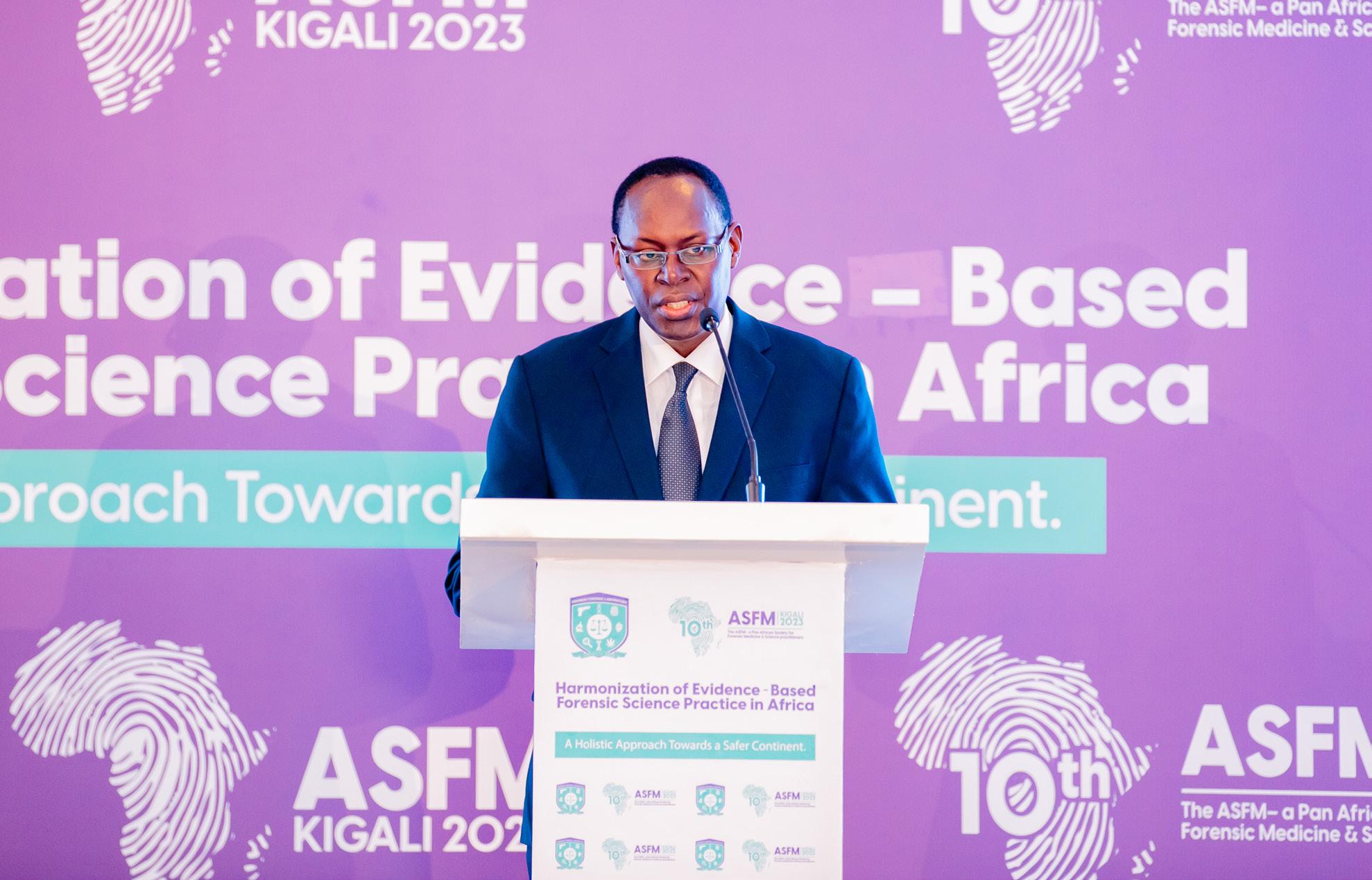
The 10th African Society of Forensic Medicine (ASFM) International Conference opened in Kigali Rwanda with a call for African countries to invest more in Forensic Science as one of the sure ways to deliver equitable, efficient and timely justice.
Speaking at the opening of the conference, the Chief Justice, Dr. Faustin Ntezilyayo pointed out that in today’s complex and rapidly changing environment, where people’s expectations for quality justice are high, many countries have been working to transform and modernize their justice systems.
Such reforms include strengthening the use and application of forensic science evidence, with the ultimate goal of improving efficiency in the administration of justice, citing Rwanda’s efforts, which has invested in Rwanda Forensic, giving it an autonomous status, which allows it to work independently and deliver undisputable services.
The Chief Justice said that having a forensic institution that supports the justice system with evidence based on science and technology for use in courts of law and other justice bodies is a great achievement to the country, pointing out that the government will invest more in RFI as a “key player” in regional and international collaborations in forensic science.
The pledged support also targets to solve African challenges including gender-based violence, child abuse crimes, among others.
“Our country is ready to work, collaborate and therefore support initiatives that bring solutions to the problems faced by African continent as for instance the large number of crimes including Gender-Based Violence and Child Abuse and so forth,” Dr. Faustin Ntezilyayo, Rwanda’s Chief Justice said.
“Having Forensic Institution that supports the justice system with evidence based on science and technology for use in our courts of laws and other justice bodies is a great achievement to the country. Besides providing relevant scientific evidence, RFI services contribute towards reducing the turnaround time of the case before trials in the courts,” he added.
He pointed out that RFI was established with autonomous status, which allows this institution to work independently and deliver undisputable services.
Dr. Ntezilyayo made the remarks during the four-day event, starting from 7th to 10th March 2023. Happening for the 10th time, it is themed “Harmonization of Evidence-based Forensic Science Practice in Africa- A Holistic Approach Towards a Safer Continent.” It also aims at discussing improvement of forensic science practices on the African continent.
Several topics will be discussed including human tissue banking, management of the dead, identification of deceased migrants, disaster response and management, prevention of gender-based violence, crime scene management and harmonized evidence-based forensic science practice.
“RFI is responsible for providing forensic services, to government institutions, families and individuals in Rwanda and beyond by providing forensic evidence for fair justice administration,” Dr. Charles Karangwa, Director General of RFI said.
He said that different services are provided using 12 laboratories confined into 9 units including DNA services (paternity testing, Kinship and genotyping, biological traces analysis and rest of dead bodies analysis), Toxicology and Blood alcohol services, Forensic medicine services, Ballistics and Toolmarks services, Questioned documents services, Fingerprint services, Drugs and chemistry services, and Microbiology services, Digital Forensics and Multimedia services.
According to Dr. Charles Karangwa, since RFI started its operations in 2018, it has received and handled more than 37,000 cases from inside and outside the country.
REMARKS BY HON.MINISTER OF JUSTICE/ATTORNEYGENERAL Dr. Emmanuel Ugirashebuja during ASFM 2023 International conference opening ceremony.
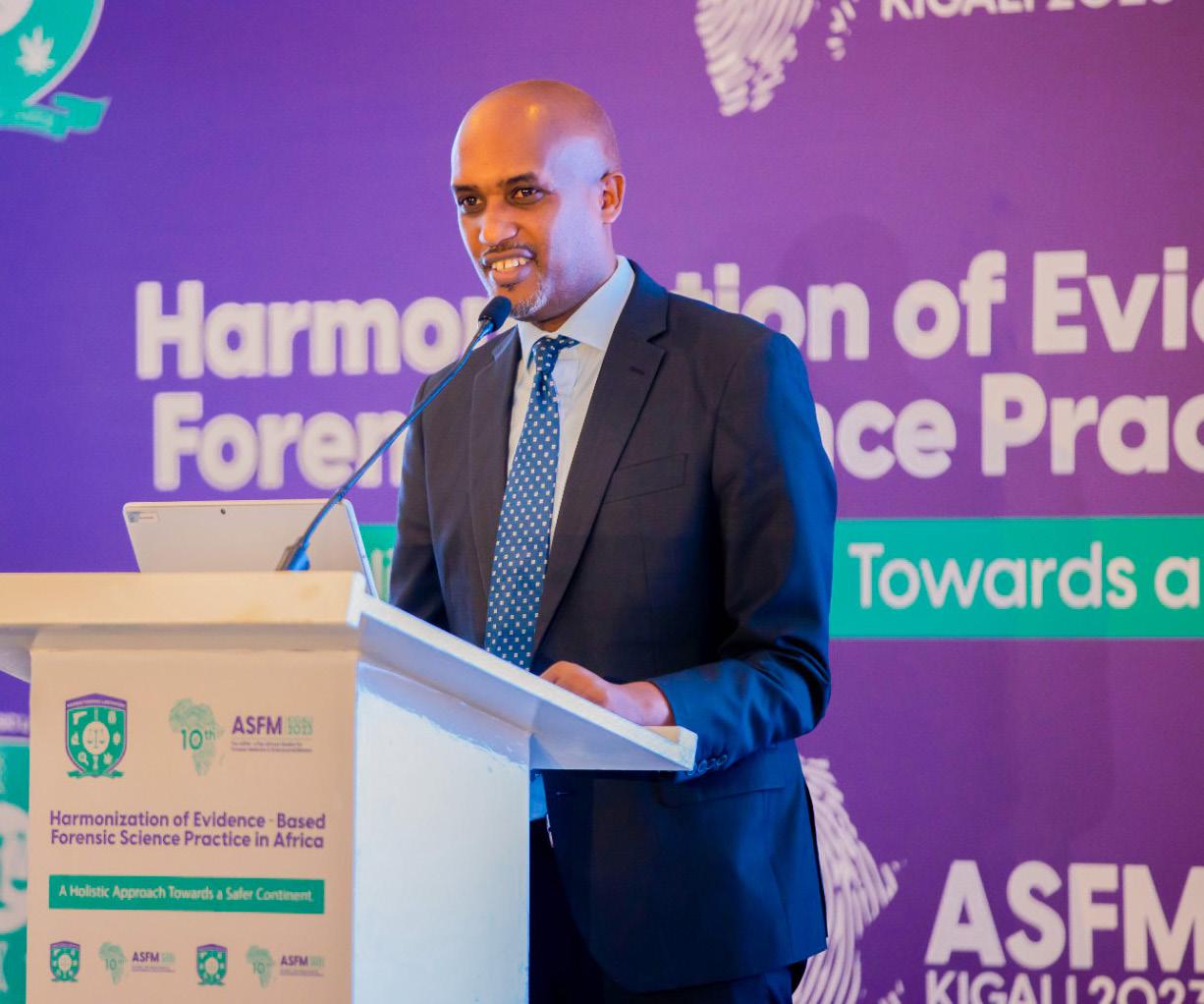
Hon.Minister of Justice Dr.Ugirashebuja Emmanuel delivering his remarks at ASFM 2023 International conference opening ceremony
According to Dr. Emmanuel Ugirashebuja, the Minister of Justice and Attorney General, forensics is one of the key fields that support quality justice service delivery.
“It is of great impact to have forensic professionals together discussing matters that bring solutions to the African continent but also the world. RFI has enormously contributed to the justice system to harmonize justice services and quality services delivery,” Dr. Ugirashebuja said.
Remarks by Dr.Charles Karangwa, Director General of RFI during the inaugural ceremony of ASFM 2023 International conference .
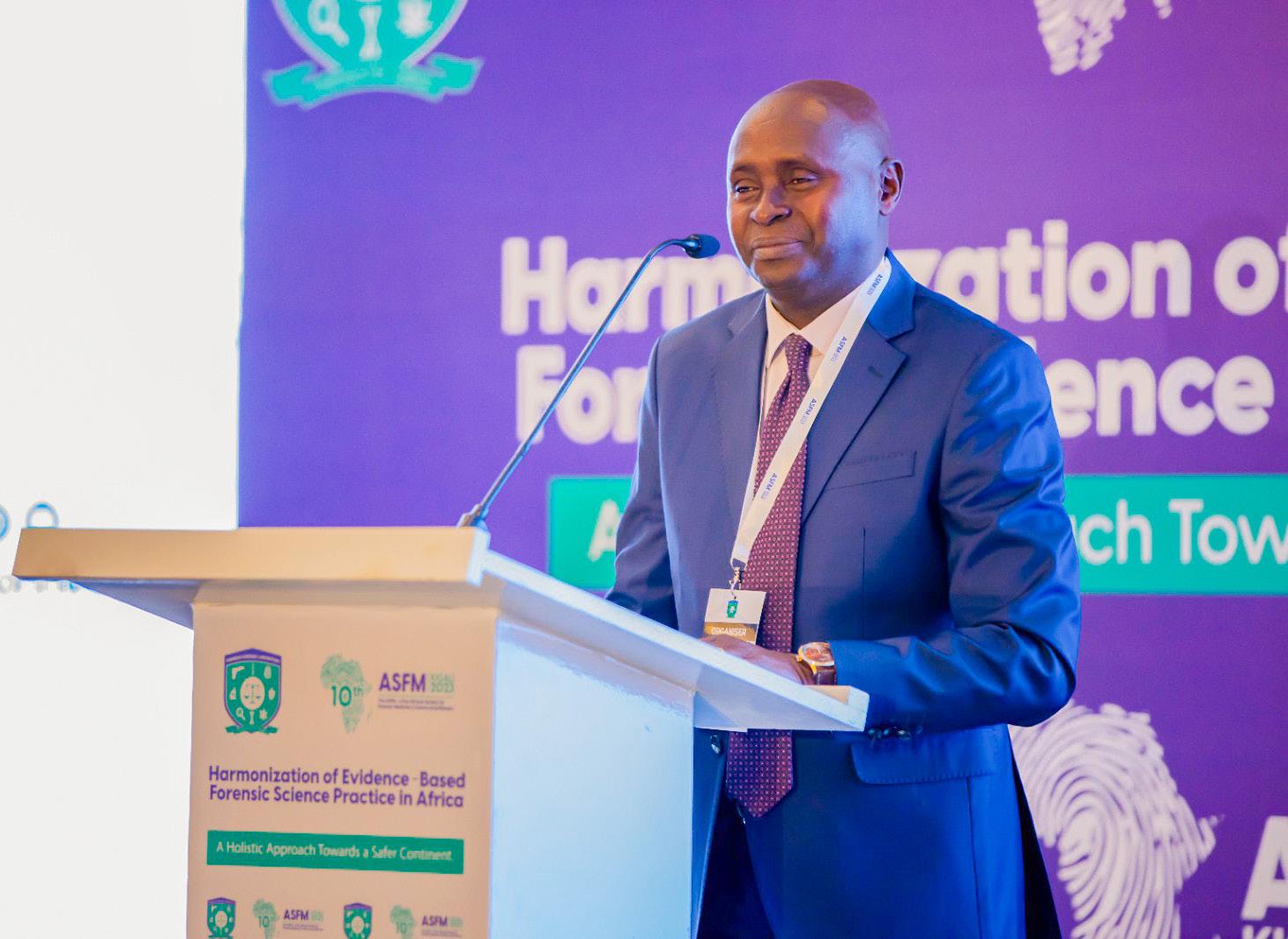
Dr. Charles Karangwa , Director General of RFI (the host of ASFM 2023) delivering his remarks at ASFM 2023 International conference.
“RFI has developed strong scientific partnerships to train a qualified and competitive staff around the world in institutions like National Forensic Sciences University (NFSU), USA, UK, Germany, Russia, etc.). They are now very productive,” he stated.
“RFI is on an aggressive roadmap towards the accreditation of its services. So far we have undertaken a number of preparations including continuous capacity building of the staff, acquisition of high and latest tech equipment for case handling, and implementation of the Laboratory Management Information System (LIMS) for chain of custody management at our level. Also, annually we are participating in the proficiency test program,” Dr. Karangwa continued.
Minister Ugirashebuja hosts participants of ASFM international conference to dinner
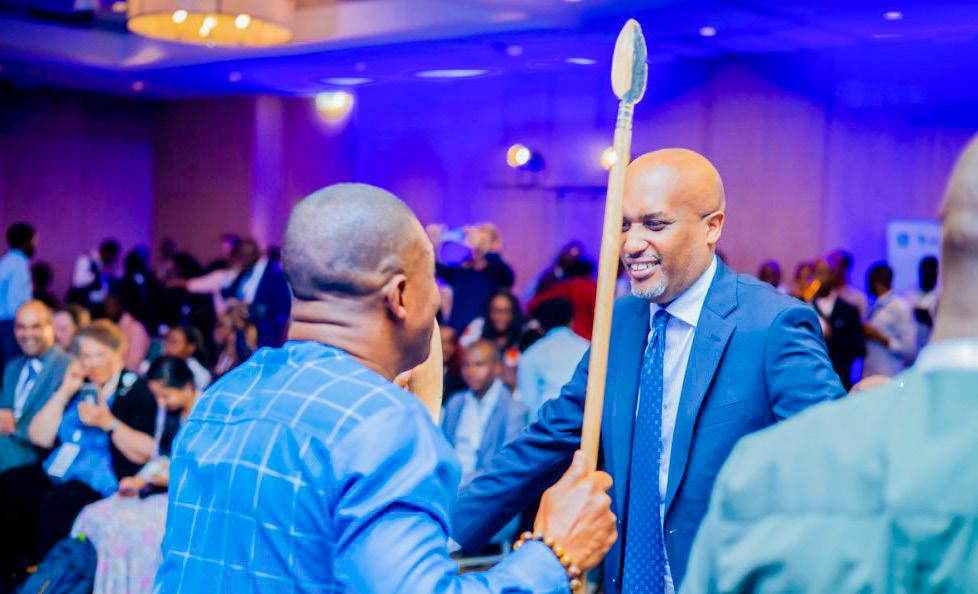
The dinner brought together over 300 participants from 40 countries.
ASFM 2023 meeting attracted researchers, experts and specialists in forensic evidence to Rwanda to discuss issues including how to take the forensic science field to greater heights on the African continent.
RFI’s Director General Dr. Charles Karangwa as well as the Prosecutor General, Aimable Havugiyaremye attended the dinner.
Minister Ugirashebuja highlighted that such conferences are crucial as they provide a platform for participants to acquire knowledge relevant for the sector’s development.
During the meeting, the African Forensic Science Academy (AFSA) was launched in Rwanda.
The academy will serve as a professional representative body for forensic science practitioners in Africa.
It is expected to build the capacity of African countries in forensic services.
AFSA activities will be rolled out either in online or in-person format overtime.
It envisages training programs in various formats, development of best-practice guidelines, webinars, workshops and much more.
The Acting President of AFSA, Dr. Antonel Olckers said that the academy is a testament that the time has come for Africa to develop homegrown solutions.
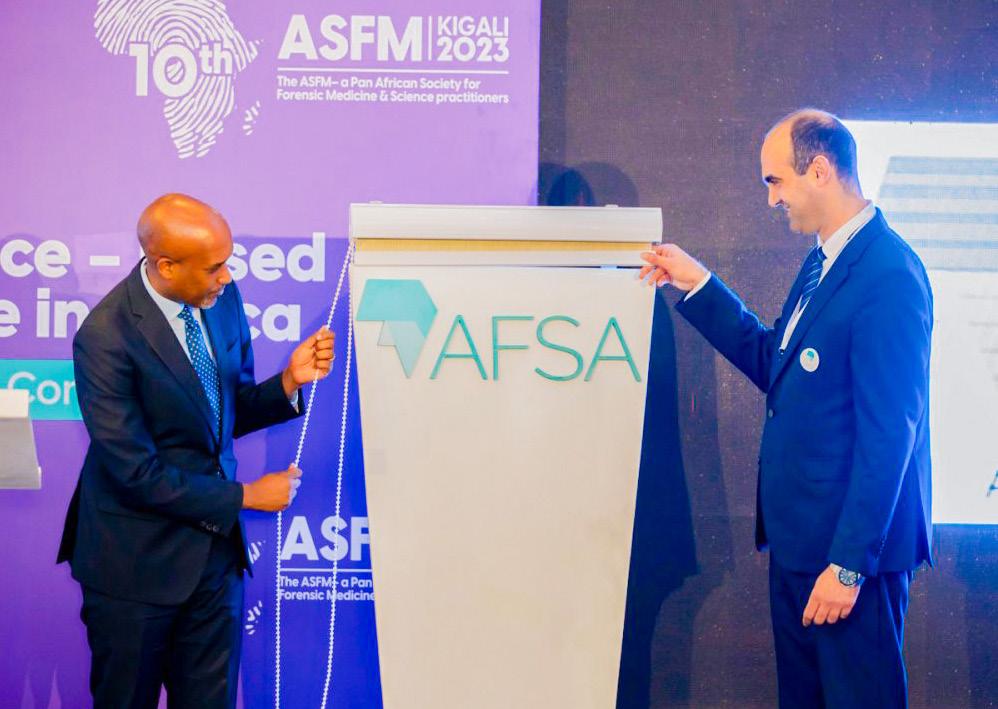
Launched during the African Society of Forensic Medicine (ASFM) International Conference that unfolded in Kigali in March 2023, the academy will serve as a professional representative body for forensic science practitioners in Africa.
It is expected to build the capacity of African countries in forensic services through a number of ways.
AFSA activities will be rolled out either via online or in-person format. The academy envisages training programs in various formats, development of best-practice guidelines, webinars, workshops and much more.
Minister Ugirashebuja said that the launch of the academy in Rwanda as the host country of the conference is a result of RFI’s achievements.
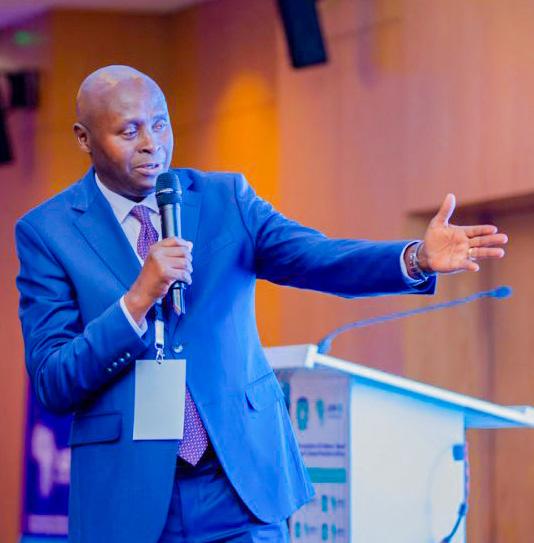
Dr. Ugirashebuja emphasized that forensic evidence services are crucial in enhancing quality justice.
The Head of ASFM, Dr. Uwom Okereke Eze explained that the academy was opened in Rwanda because of the milestones the country has achieved in forensic services.
As of November last year, RFI was offering services to more than 12 African countries since it was established in 2018.
RFI’s Director General of RFI, Dr. Charles Karangwa said that the academy will play an important role not only for Rwanda but also for the African continent by promoting research and fostering cooperation in forensic science.
Chief Justice Dr. Faustin Ntezilyayo, said that Rwanda will continue working closely with players in the sector to deliver justice to citizens.
He emphasized that Rwanda is pleased to host the academy and expects to get continued collaboration so as to provide the needed contribution to the delivery of quality justice in Africa.
He reiterated Rwanda’s commitment to develop the academy to become more meaningful to different countries.
The academy is expected to play a role in conducting DNA tests, investigating disputed death circumstances, and deploying latest technology in forensic services among others.
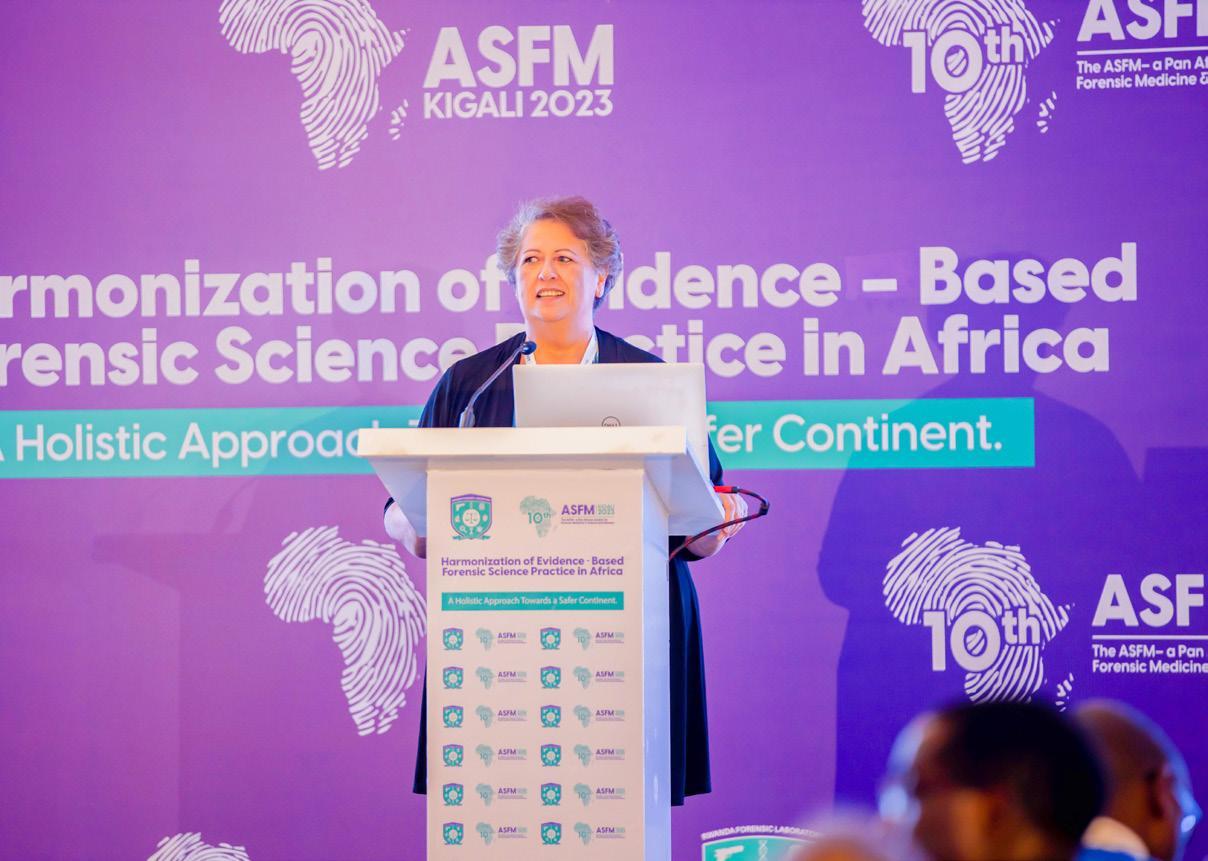
Dr. Antonel,Founder and President of AFSA addressing her remarks during the official launch of the organization during ASFM 2023 International conference in Kigali March 2023.
Dr Charles Karangwa: Chair
Dr. Justin Kabera: Member
Mr. Ildephonse Habyarimana: Member
Mrs Karolina Uwantege: Member
Dr. Nshingabigwi Emmanuel: Member
Dr. Innocent Nkurunziza: Member
Editorial Team
Mr. Nicodeme Nzahoyankuye: Chief Editor
Mr. Irasubiza David: Editor
Mr. Pascal Rucamumakuba: Editor
SP Japhet Ashimirwe: Editor
IP David Mugisha: Editor
Mr. Honoré Abayisenga: Graphics and layout designer
Mr. Protais Mbarushimana : Journalist
Mr. Byumvuhore Frederic: Journalist
Mr. Alain Niziyigiye: Photographer
Consultancy:
The Honor Image Ltd
Proofreading
NEWTIMES PUBLICATIONS LTD
Photography:
RFI
Igihe Ltd
Inyarwanda Ltd
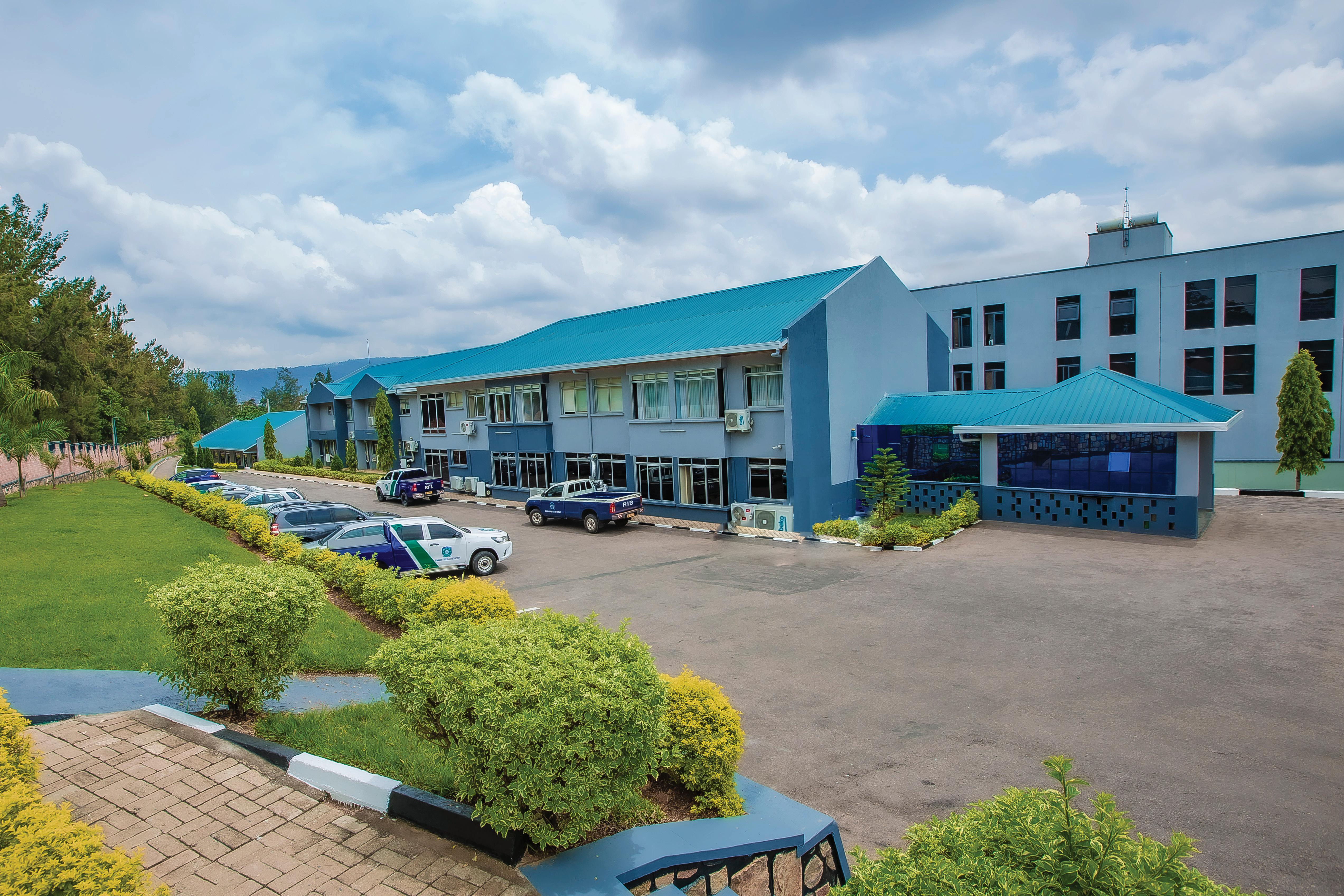
Justice forJusticeforJustice ScienceforJustice ScienceforJusticeScienceforJustice ScienceforJusticeScienceforJustice ScienceforJusticeScienceforJustice ScienceforJusticeScienceforJusticeScienceforJusticeScienceforJustice ScienceforJusticeScienceforJustice ScienceforJusticeScienceforJustice ScienceforJusticeScienceforJustice ScienceforJusticeScienceforJustice ScienceforJusticeScienceforJustice
ScienceforJusticeScienceforJustice ScienceforJusticeScienceforJustice ScienceforJusticeScienceforJustice ScienceforJusticeScienceforJustice ScienceforJusticeScienceforJustice ScienceforJusticeScienceforJusticeScienceforJusticeScienceforJustice ScienceforJusticeScienceforJustice ScienceforJusticeScienceforJustice ScienceforJusticeScienceforJustice ScienceforJusticeScienceforJustice ScienceforJusticeScienceforJustice
ScienceforJusticeScienceforJustice ScienceforJusticeScienceforJustice ScienceforJusticeScienceforJustice ScienceforJusticeScienceforJustice ScienceforJusticeScienceforJustice ScienceforJusticeScienceforJusticeScienceforJusticeScienceforJustice ScienceforJusticeScienceforJustice ScienceforJusticeScienceforJustice ScienceforJusticeScienceforJustice ScienceforJusticeScienceforJustice ScienceforJusticeScienceforJustice
ScienceforJusticeScienceforJustice ScienceforJusticeScienceforJustice ScienceforJusticeScienceforJustice ScienceforJusticeScienceforJustice ScienceforJusticeScienceforJustice ScienceforJusticeScienceforJusticeScienceforJusticeScienceforJustice ScienceforJusticeScienceforJustice ScienceforJusticeScienceforJustice ScienceforJusticeScienceforJustice ScienceforJusticeScienceforJustice ScienceforJusticeScienceforJustice
ScienceforJusticeScienceforJustice ScienceforJusticeScienceforJustice ScienceforJusticeScienceforJustice ScienceforJusticeScienceforJustice ScienceforJusticeScienceforJustice ScienceforJusticeScienceforJusticeScienceforJusticeScienceforJustice ScienceforJusticeScienceforJustice ScienceforJusticeScienceforJustice ScienceforJusticeScienceforJustice ScienceforJusticeScienceforJustice ScienceforJusticeScienceforJustice
ScienceforJusticeScienceforJustice ScienceforJusticeScienceforJustice ScienceforJusticeScienceforJustice ScienceforJusticeScienceforJustice ScienceforJusticeScienceforJustice ScienceforJusticeScienceforJusticeScienceforJusticeScienceforJustice ScienceforJusticeScienceforJustice ScienceforJusticeScienceforJustice ScienceforJusticeScienceforJustice ScienceforJusticeScienceforJustice ScienceforJusticeScienceforJustice
JusticeJusticeJusticeforJusticeforJustice ScienceforJustice ScienceforJusticeScienceforJustice ScienceforJusticeScienceforJustice ScienceforJusticeScienceforJustice ScienceforJusticeScienceforJustice ScienceforJusticeScienceforJustice
In GASABO District, KACYIRU Sector, on the street KN 8 Ave, Kigali, Opposite the Rwanda National Police Headquarters.
JusticeJusticeJusticeJusticeforJusticeJusticeJustice
ScienceforJusticeScienceforJustice ScienceforJusticeforJusticeJusticeJustice
ScienceforJusticeScienceforJustice ScienceforJusticeScienceforJustice ScienceforJusticeScienceforJustice ScienceforJusticeScienceforJustice ScienceforJusticeforJusticeJusticeJustice
Contacts
ScienceforJusticeScienceforJustice ScienceforJusticeScienceforJustice ScienceforJusticeScienceforJustice ScienceforJusticeScienceforJustice ScienceforJusticeScienceforJustice ScienceforJusticeScienceforJusticeScienceforJusticeScienceforJustice ScienceforJusticeforJusticeJusticeJustice
Toll free:4636
WhatsApp: +250 788 320 930
Phone: +250 788 320 930
Email:info@rfi.gov.rw
Po.Box 979 Kigali, Rwanda
Website:www.rfi.gov.rw
X: @forensicsrwanda
ScienceforJusticeScienceforJustice ScienceforJusticeScienceforJustice ScienceforJusticeScienceforJustice ScienceforJusticeScienceforJustice ScienceforJusticeScienceforJustice ScienceforJusticeScienceforJusticeScienceforJusticeScienceforJustice ScienceforJusticeScienceforJustice ScienceforJusticeScienceforJustice ScienceforJusticeScienceforJustice ScienceforJusticeforJusticeJusticeJustice
ScienceforJusticeScienceforJustice ScienceforJusticeScienceforJustice ScienceforJusticeScienceforJustice ScienceforJusticeScienceforJustice ScienceforJusticeScienceforJustice ScienceforJusticeScienceforJusticeScienceforJusticeScienceforJustice ScienceforJusticeScienceforJustice ScienceforJusticeScienceforJustice ScienceforJusticeScienceforJustice ScienceforJusticeScienceforJustice ScienceforJusticeScienceforJustice
ScienceforJusticeScienceforJustice ScienceforJusticeScienceforJustice ScienceforJusticeScienceforJustice ScienceforJusticeScienceforJustice ScienceforJusticeScienceforJustice ScienceforJusticeScienceforJusticeScienceforJusticeScienceforJustice ScienceforJusticeScienceforJustice ScienceforJusticeScienceforJustice ScienceforJusticeScienceforJustice ScienceforJusticeScienceforJustice ScienceforJusticeScienceforJustice
ScienceforJusticeScienceforJustice ScienceforJusticeScienceforJustice ScienceforJusticeScienceforJustice ScienceforJusticeScienceforJustice ScienceforJusticeScienceforJustice ScienceforJusticeScienceforJusticeScienceforJusticeScienceforJustice ScienceforJusticeScienceforJustice ScienceforJusticeScienceforJustice ScienceforJustice ScienceforScienceScienceScienceScience